How to Write a Great Synopsis for Thesis
A synopsis is a structured outline of a research thesis and the steps followed to answer the research question. The goal of writing a synopsis is to clearly and thoroughly explain the need to investigate a certain problem using particular practical methods to conduct the study. One of the main components of this written work is an extensive literature review containing strong evidence that the proposed research is feasible.

Establishing the Background
A supervisor may ask you to write a synopsis for one or more reasons:
- to help you improve your critical thinking and writing skills
- to help you understand how to design a comprehensive synopsis
- to encourage you to write a comprehensive literature review to make sure that the research problem has not been answered yet
- to make you conduct a logical analysis of the steps that should be followed to meet the objectives of the research
A synopsis should be coherent in terms of research design. Thus, you should ensure that the research problem, aims, and research methods are logically linked and well-considered. Note that all synopses should contain answers for several crucial questions:
- Why should research on the proposed problem be undertaken?
- What is expected to be achieved?
- What has been done by other researchers on the proposed topic?
- How will the objectives of the study be achieved?
The Writing Process
Before proceeding, consider answering the following questions:
- Why am I going to study this topic?
- Why do I consider it to be important?
- Have I conducted an extensive literature review on the topic?
- What problem will the research help to solve?
- How do I incorporate previous studies on the topic?
The structure of a synopsis should correspond to the structure of qualifying research work, and the word count should be 2,500–3,000 words (Balu 38). The basic elements of a synopsis include a title page, contents page, an introduction, background, literature review, objectives, methods, experiments and results, conclusions, and references.
Introduction
As this comprises the first part of the main text, the introduction should convince readers that the study addresses a relevant topic and that the expected outcomes will provide important insights. Also, this section should include a brief description of the methods that will be used to answer the research question. Usually, the introduction is written in 1–3 paragraphs and answers the following questions:
- What is the topic of the research?
- What is the research problem that needs to be meaningfully understood or investigated?
- Why is the problem important?
- How will the problem be studied?
In this section, you should set the scene and better introduce the research topic by proving its scientific legitimacy and relevance. It is important to establish a clear focus and avoid broad generalizations and vague statements. If necessary, you may explain key concepts or terms. Consider covering the following points in this section:
- Discuss how the research will contribute to the existing scientific knowledge.
- Provide a detailed description of the research problem and purpose of the research.
- Provide a rationale for the study.
- Explain how the research question will be answered.
- Be sure to discuss the methods chosen and anticipated implications of the research.
Literature Review
A review of existing literature is an important part of a synopsis, as it:
- gives a more detailed look at scientific information related to the topic
- familiarizes readers with research conducted by others on a similar subject
- gives insight into the difficulties faced by other researchers
- helps identify variables for the research based on similar studies
- helps double-check the feasibility of the research problem.
When writing the literature review, do not simply present a list of methods researchers have used and conclusions they have drawn. It is important to compare and contrast different opinions and be unafraid to criticize some of them. Pay attention to controversial issues and divergent approaches used to address similar problems. You may discuss which arguments are more persuasive and which methods and techniques seem to be more valid and reliable. In this section, you are expected not to summarize but analyze the previous research while remembering to link it to your own purpose.
Identify the objectives of the research based on the literature review. Provide an overall objective related to the scientific contribution of the study to the subject area. Also include a specific objective that can be measured at the end of the research.
When writing this section, consider that the aim of the research is to produce new knowledge regarding the topic chosen. Therefore, the research methodology forms the core of your project, and your goal is to convince readers that the research design and methods chosen will rationally answer the research questions and provide effective tools to interpret the results correctly. It may be appropriate to incorporate some examples from your literature review into the description of the overall research design.
When describing the research methodology, ensure that you specify the approaches and techniques that will be used to answer the research question. In addition, be specific about applying the chosen methods and what you expect to achieve. Keep in mind that the methods section allows readers to evaluate the validity and feasibility of the study. Therefore, be sure to explain your decision to adopt specific methods and procedures. It is also important to discuss the anticipated barriers and limitations of the study and how they will be addressed. Specify what kind of contribution to the existing knowledge on the topic is expected, and discuss any ethical considerations that are relevant to the research.
Experiments and Results
Logically present and analyze the results of the study using tables or figures.
In this section, you should again state the significance of the research and summarize the study. Be sure to mention the study objectives and methods used to answer the research questions. Also, discuss how the results of the study contribute to the current knowledge on the problem.
A synopsis should contain a list of all references used. Make sure the references are formatted according to the chosen citation style and each source presented in this section is mentioned within the body of the synopsis.
The purpose of writing a synopsis is to show a supervisor a clear picture of a proposed project and allow him or her to find any gaps that have not been considered previously. A concisely written synopsis will help you gain approval to proceed with the actual research. While no rigid rules for writing this type of paper have been established, a synopsis should be constructed in a manner to help a supervisor understand the proposed research at first glance.
Balu, R. “Writing a Good Ph.D Research Synopsis.” International Journal of Research in Science and Technology, vol. 5, no. 4, 2015, pp. 38–48.
Unfortunately, your browser is too old to work on this site.
For full functionality of this site it is necessary to enable JavaScript.
- PRO Courses Guides New Tech Help Pro Expert Videos About wikiHow Pro Upgrade Sign In
- EDIT Edit this Article
- EXPLORE Tech Help Pro About Us Random Article Quizzes Request a New Article Community Dashboard This Or That Game Happiness Hub Popular Categories Arts and Entertainment Artwork Books Movies Computers and Electronics Computers Phone Skills Technology Hacks Health Men's Health Mental Health Women's Health Relationships Dating Love Relationship Issues Hobbies and Crafts Crafts Drawing Games Education & Communication Communication Skills Personal Development Studying Personal Care and Style Fashion Hair Care Personal Hygiene Youth Personal Care School Stuff Dating All Categories Arts and Entertainment Finance and Business Home and Garden Relationship Quizzes Cars & Other Vehicles Food and Entertaining Personal Care and Style Sports and Fitness Computers and Electronics Health Pets and Animals Travel Education & Communication Hobbies and Crafts Philosophy and Religion Work World Family Life Holidays and Traditions Relationships Youth
- Browse Articles
- Learn Something New
- Quizzes Hot
- Happiness Hub
- This Or That Game
- Train Your Brain
- Explore More
- Support wikiHow
- About wikiHow
- Log in / Sign up
- Education and Communications
- College University and Postgraduate
- Academic Writing
- Research Papers
How to Write a Research Synopsis: Template, Examples, & More
Last Updated: May 9, 2024 Fact Checked
Research Synopsis Template
- Organizing & Formatting
- Writing Your Synopsis
- Reviewing & Editing
This article was reviewed by Gerald Posner and by wikiHow staff writer, Raven Minyard, BA . Gerald Posner is an Author & Journalist based in Miami, Florida. With over 35 years of experience, he specializes in investigative journalism, nonfiction books, and editorials. He holds a law degree from UC College of the Law, San Francisco, and a BA in Political Science from the University of California-Berkeley. He’s the author of thirteen books, including several New York Times bestsellers, the winner of the Florida Book Award for General Nonfiction, and has been a finalist for the Pulitzer Prize in History. He was also shortlisted for the Best Business Book of 2020 by the Society for Advancing Business Editing and Writing. This article has been fact-checked, ensuring the accuracy of any cited facts and confirming the authority of its sources. This article has been viewed 271,904 times.
A research synopsis describes the plan for your research project and is typically submitted to professors or department heads so they can approve your project. Most synopses are between 3,000 and 4,000 words and provide your research objectives and methods. While the specific types of information you need to include in your synopsis may vary depending on your department guidelines, most synopses include the same basic sections. In this article, we’ll walk you step-by-step through everything you need to know to write a synopsis for research.
Things You Should Know
- Begin your research synopsis by introducing the question your research will answer and its importance to your field.
- List 2 or 3 specific objectives you hope to achieve and how they will advance your field.
- Discuss your methodology to demonstrate why the study design you chose is appropriate for your research question.

Organizing Your Research Synopsis

- Find out what citation format you’re supposed to use, as well as whether you’re expected to use parenthetical references or footnotes in the body of your synopsis.
- If you have questions about anything in your guidelines, ask your instructor or advisor to ensure you follow them correctly.

- Title: the title of your study
- Abstract: a summary of your research synopsis
- Introduction: identifies and describes your research question
- Literature Review: a review of existing relevant research
- Objectives: goals you hope to accomplish through your study
- Hypotheses: results you expect to find through your research
- Methodology and methods: explains the methods you’ll use to complete your study
- References: a list of any references used in citations
Tip: Your synopsis might have additional sections, depending on your discipline and the type of research you're conducting. Talk to your instructor or advisor about which sections are required for your department.

- Keep in mind that you might not end up using all the sources you initially found. After you've finished your synopsis, go back and delete the ones you didn't use.
Writing Your Research Synopsis

- Your title should be a brief and specific reflection of the main objectives of your study. In general, it should be under 50 words and should avoid unneeded phrases like “an investigation into.”
- On the other hand, avoid a title that’s too short, as well. For example, a title like “A Study of Urban Heating” is too short and doesn’t provide any insight into the specifics of your research.

- The introduction allows you to explain to your reader exactly why the question you’re trying to answer is vital and how your knowledge and experience make you the best researcher to tackle it.
- Support most of the statements in your introduction with other studies in the area that support the importance of your question. For example, you might cite a previous study that mentions your problem as an area where further research needs to be done.
- The length of your introduction will vary depending on the overall length of your synopsis as well as the ultimate length of your eventual paper after you’ve finished your research. Generally, it will cover the first page or two of your synopsis.

- For example, try finding relevant literature through educational journals or bulletins from organizations like WHO and CDC.
- Typically, a thorough literature review discusses 8 to 10 previous studies related to your research problem.
- As with the introduction, the length of your literature review will vary depending on the overall length of your synopsis. Generally, it will be about the same length as your introduction.
- Try to use the most current research available and avoid sources over 5 years old.

- For example, an objective for research on urban heating could be “to compare urban heat modification caused by vegetation of mixed species considering the 5 most common urban trees in an area.”
- Generally, the overall objective doesn’t relate to solving a specific problem or answering a specific question. Rather, it describes how your particular project will advance your field.
- For specific objectives, think in terms of action verbs like “quantify” or “compare.” Here, you’re hoping to gain a better understanding of associations between particular variables.

- Specify the sources you used and the reasons you have arrived at your hypotheses. Typically, these will come from prior studies that have shown similar relationships.
- For example, suppose a prior study showed that children who were home-schooled were less likely to be in fraternities or sororities in college. You might use that study to back up a hypothesis that home-schooled children are more independent and less likely to need strong friendship support networks.

- Expect your methodology to be at least as long as either your introduction or your literature review, if not longer. Include enough detail that your reader can fully understand how you’re going to carry out your study.
- This section of your synopsis may include information about how you plan to collect and analyze your data, the overall design of your study, and your sampling methods, if necessary. Include information about the study setting, like the facilities and equipment that are available to you to carry out your study.
- For example, your research work may take place in a hospital, and you may use cluster sampling to gather data.

- Use between 100 and 200 words to give your readers a basic understanding of your research project.
- Include a clear statement of the problem, the main goals or objectives of your study, the theories or conceptual framework your research relies upon, and the methods you’ll use to reach your goals or objectives.
Tip: Jot down a few notes as you draft your other sections that you can compile for your abstract to keep your writing more efficient.
Reviewing and Editing Your Research Synopsis

- If you don’t have that kind of time because you’re up against a deadline, at least take a few hours away from your synopsis before you go back to edit it. Do something entirely unrelated to your research, like taking a walk or going to a movie.

- Eliminate sentences that don’t add any new information. Even the longest synopsis is a brief document—make sure every word needs to be there and counts for something.
- Get rid of jargon and terms of art in your field that could be better explained in plain language. Even though your likely readers are people who are well-versed in your field, providing plain language descriptions shows you know what you’re talking about. Using jargon can seem like you’re trying to sound like you know more than you actually do.
Tip: Free apps, such as Grammarly and Hemingway App, can help you identify grammatical errors as well as areas where your writing could be clearer. However, you shouldn't rely solely on apps since they can miss things.

- Reference list formatting is very particular. Read your references out loud, with the punctuation and spacing, to pick up on errors you wouldn’t have noticed if you’d just read over them.
- Compare your format to the one in the stylebook you’re using and make sure all of your entries are correct.

- Read your synopsis backward by starting on the last word and reading each word separately from the last to the first. This helps isolate spelling errors. Reading backward sentence by sentence helps you isolate grammatical errors without being distracted by the content.
- Print your synopsis and circle every punctuation mark with a red pen. Then, go through them and focus on whether they’re correct.
- Read your synopsis out loud, including the punctuation, as though you were dictating the synopsis.

- Have at least one person who isn’t familiar with your area of study look over your synopsis. If they can understand your project, you know your writing is clear. If any parts confuse them, then that’s an area where you can improve the clarity of your writing.

Expert Q&A
- If you make significant changes to your synopsis after your first or second round of editing, you may need to proofread it again to make sure you didn’t introduce any new errors. Thanks Helpful 0 Not Helpful 0

You Might Also Like

- ↑ https://admin.umt.edu.pk/Media/Site/iib1/FileManager/FORMAT%20OF%20SYNOPSIS%2012-10-2018.pdf
- ↑ https://www.scientificstyleandformat.org/Tools/SSF-Citation-Quick-Guide.html
- ↑ https://numspak.edu.pk/upload/media/Guidelines%20for%20Synopsis%20Writing1531455748.pdf
- ↑ https://www.researchgate.net/publication/279917593_Research_synopsis_guidelines
- ↑ https://writingcenter.unc.edu/tips-and-tools/editing-and-proofreading/
- ↑ https://www.cornerstone.edu/blog-post/six-steps-to-really-edit-your-paper/
About This Article

- Send fan mail to authors
Reader Success Stories
Jul 25, 2022
Did this article help you?

Wave Bubble
Aug 31, 2021

Featured Articles

Trending Articles

Watch Articles

- Terms of Use
- Privacy Policy
- Do Not Sell or Share My Info
- Not Selling Info
Get all the best how-tos!
Sign up for wikiHow's weekly email newsletter
Thesis Topics and Ideas

This page provides a comprehensive list of 1000 thesis topics and ideas designed to assist students from a wide array of academic disciplines in identifying and selecting their research subjects. Whether you are at the beginning stages of your research or refining your thesis topic, this resource offers valuable guidance and an extensive array of ideas to inspire and inform your academic work. Spanning 25 fields, from Accounting to Science, each category includes 40 specific topics, ensuring a broad and inclusive range for every scholar’s interests. With an emphasis on the significance of choosing a suitable thesis topic, this page serves as an essential starting point for any student embarking on their thesis journey.
1000 Thesis Topics and Ideas

Academic Writing, Editing, Proofreading, And Problem Solving Services
Get 10% off with 24start discount code, 25 thesis topics categories:.
- Accounting Thesis Topics
- Art Thesis Topics
- Banking Thesis Topics
- Biology Thesis Topics
- Computer Science Thesis Topics
- Economics Thesis Topics
- Education Thesis Topics
- Engineering Thesis Topics
- Entrepreneurship Thesis Topics
- Environmental Science Thesis Topics
- Finance Thesis Topics
- Geography Thesis Topics
- Geology Thesis Topics
- Health Thesis Topics
- Immigration Thesis Topics
- Law Thesis Topics
- Nutrition Thesis Topics
- Leadership Thesis Topics
- Literature Thesis Topics
- Management Thesis Topics
- Marketing Thesis Topics
- Nursing Thesis Topics
- Philosophy Thesis Topics
- Psychology Thesis Topics
- Science Thesis Topics
1. Accounting Thesis Topics
- The impact of blockchain technology on traditional accounting practices.
- Comparative analysis of international accounting standards and local practices.
- Ethical considerations in managerial accounting.
- The role of artificial intelligence in financial fraud detection.
- Sustainability reporting: Standards and implications for global firms.
- Cybersecurity risks in cloud-based accounting systems.
- The future of forensic accounting in a digital age.
- Behavioral finance: How cognitive biases affect accounting decisions.
- The effectiveness of audit committees in emerging economies.
- Tax evasion and government policy in developing countries.
- Cryptocurrency and its implications for financial reporting.
- Implementing lean accounting in the manufacturing sector.
- The impact of culture on international accounting practices.
- Carbon credits accounting: Challenges and opportunities.
- The role of accounting in corporate social responsibility.
- Innovations in non-profit accounting.
- Accounting ethics and online privacy.
- Big data and predictive analytics for risk management.
- Revenue recognition in the digital economy.
- Accounting for startups: Challenges and best practices.
- The effect of global economic crises on accounting norms.
- Corporate governance and its impact on accounting standards.
- Integration of ESG (Environmental, Social, Governance) factors in financial reporting.
- The evolution of cost accounting in the healthcare sector.
- Financial literacy and its impact on business success.
- Mergers and acquisitions: Accounting and cultural integration.
- The changing landscape of pension accounting.
- Real-time accounting: Implementation and effects.
- Transparency in government accounting: A comparative study.
- Intellectual property valuation and its accounting challenges.
- Impact of tariffs and trade barriers on accounting policies.
- Accounting for climate change: Risks and opportunities.
- The role of accountants in corporate turnaround strategies.
- Auditing automation and its impact on audit quality.
- The influence of technology on the evolution of accounting standards.
- Risk management in financial services: An accounting perspective.
- Outsourcing accounting services: Benefits and risks.
- The future of professional ethics in accounting.
- The role of accounting in enhancing organizational efficiency.
- Exploring the relationship between accounting information systems and organizational performance.
2. Art Thesis Topics
- Digital media and the transformation of traditional art forms.
- The influence of social media on contemporary art and artist visibility.
- Art as a form of political resistance in authoritarian regimes.
- The evolution of street art and its acceptance in mainstream galleries.
- Feminist art movements in the 21st century.
- The intersection of technology and art: Virtual reality as a new canvas.
- Postmodernism in art: Origins and future directions.
- The role of art therapy in mental health treatment.
- Cultural appropriation vs. appreciation in global art forms.
- The impact of global warming on artistic expression.
- Art in times of crisis: A study of pandemic-driven art.
- Sustainable art: Materials and practices for the eco-conscious artist.
- The commercialization of indigenous art.
- The role of galleries in shaping art trends.
- Art education and its impact on career success in the arts.
- The depiction of race and gender in modern sculptures.
- Art curation and digital exhibitions: The future of museums.
- The influence of celebrity culture on art valuation.
- Collaborative art projects and their impact on community development.
- The ethics of restoring ancient artworks.
- Animation as a form of contemporary art.
- The rise of performance art and its social implications.
- Exploring the relationship between art and technology.
- The resurgence of handicrafts in a digital age.
- The impact of economic crises on art production.
- The role of art in promoting sustainability.
- The dynamics of art fairs and their influence on the art market.
- Consumer culture and its representation in contemporary art.
- The role of public art in urban regeneration.
- The influence of migration on artistic expression.
- Decolonizing art history: Perspectives and methodologies.
- The impact of AI-generated art on the concept of authorship.
- The role of art in enhancing intercultural dialogue.
- Art and propaganda: A historical analysis.
- Graffiti as a tool for social change.
- The psychology of color in artistic expression.
- The effect of global tourism on local art scenes.
- Art as a vehicle for social justice.
- The relationship between art and fashion design.
- The future of biographical films on artists.
3. Banking Thesis Topics
- The future of cryptocurrencies in global banking systems.
- The impact of mobile banking on traditional banking practices.
- The role of central banks in stabilizing economic crises.
- Consumer behavior in digital banking: Trust and security aspects.
- The effect of banking regulations on international investments.
- Financial inclusion: Strategies for reaching the unbanked populations.
- The role of microfinance in poverty alleviation.
- Banking secrecy and its impact on tax evasion.
- The influence of fintech innovations on traditional banking models.
- The sustainability of peer-to-peer lending platforms.
- The impact of Brexit on the UK banking sector.
- Cybersecurity strategies in online banking.
- The future of Islamic banking in non-Muslim countries.
- The role of green banking in promoting environmental sustainability.
- The effectiveness of anti-money laundering policies.
- The impact of negative interest rates on banking profitability.
- Risk management in banking: Current strategies and future challenges.
- Customer loyalty in retail banking.
- The evolution of credit scoring models in the age of big data.
- The role of banks in supporting SMEs during economic downturns.
- Ethical banking: Concepts and real-world applications.
- The impact of regulatory changes on banking innovation.
- The role of banking in economic development of rural areas.
- Customer satisfaction and service quality in online banking.
- The challenges of implementing blockchain technology in banking.
- The future of offshore banking.
- The impact of artificial intelligence on banking services.
- The role of central banks in managing climate risk.
- The effects of global political instability on banking security.
- Banking for the elderly: Adapting services for an aging population.
- The role of banks in fostering entrepreneurship.
- Digital wallets: Adoption rates and consumer trust.
- The impact of the gig economy on banking products.
- The role of emotional intelligence in banking leadership.
- Compliance challenges in global banking.
- The future of bank branch design in the digital era.
- Innovations in payment systems and their impact on consumer behavior.
- The role of banks in funding renewable energy projects.
- The impact of pandemics on banking behavior.
- Cross-border banking challenges and opportunities.
4. Biology Thesis Topics
- CRISPR and its implications for genetic diseases.
- The role of microbiomes in human health.
- Synthetic biology: Designing life for industrial purposes.
- Conservation genetics: Saving species from extinction.
- The impact of climate change on marine biodiversity.
- The ethics of cloning: From animals to humans.
- The future of bioinformatics in personalized medicine.
- The role of epigenetics in cancer development.
- Bioremediation techniques in oil spill recovery.
- The influence of urban environments on avian species.
- The application of stem cell therapy in regenerative medicine.
- The potential of algae as a biofuel source.
- The impact of invasive species on ecosystem balance.
- The role of plants in mitigating air pollution.
- The genetics of aging and longevity.
- The impact of microplastics on freshwater ecosystems.
- The evolution of antibiotic resistance.
- The role of wildlife in the spread of zoonotic diseases.
- The potential of biotechnology in food security.
- The ethical considerations of using animals in research.
- The future of GMOs in global agriculture.
- The impact of deforestation on biodiversity.
- The role of citizen science in biological research.
- The use of drones in wildlife monitoring.
- The challenges of conserving migratory bird species.
- The role of genetic modification in pest control.
- The potential for bioluminescent plants in urban lighting.
- The impact of ocean acidification on coral reefs.
- The genetics of plant adaptation to climate change.
- The role of animal behavior in conservation strategies.
- The potential of synthetic meat in reducing environmental impact.
- The impact of global warming on polar ecosystems.
- The role of fungi in ecosystem services.
- The challenges of wildlife conservation in conflict zones.
- The future of ecological restoration techniques.
- The impact of human activity on natural selection.
- The potential of venomous animals in medical research.
- The role of genetic diversity in species resilience.
- The use of environmental DNA in biodiversity monitoring.
- The ethical implications of de-extinction technologies.
5. Computer Science Thesis Topics
- Quantum computing and its future applications.
- The impact of machine learning on healthcare diagnostics.
- The ethics of artificial intelligence in decision making.
- Cybersecurity in the age of Internet of Things (IoT).
- The role of virtual reality in education.
- The challenges of data privacy in social media.
- The future of blockchain beyond cryptocurrencies.
- The potential of augmented reality in retail.
- The impact of 5G technology on mobile computing.
- The use of big data in predictive policing.
- The challenges of software engineering in space missions.
- The role of AI in combating climate change.
- The impact of computer vision in autonomous vehicles.
- The ethics of facial recognition technology.
- The potential of AI in artistic creation.
- The role of robotics in elderly care.
- The impact of digital twins in industry 4.0.
- The challenges of maintaining digital heritage.
- The potential of internet governance in global diplomacy.
- The role of deep learning in language translation.
- The future of bioinformatics in genomics.
- The challenges of ethical hacking.
- The role of cloud computing in disaster management.
- The impact of wearable technology on personal health.
- The future of digital currencies in global economies.
- The challenges of data sovereignty.
- The role of machine learning in financial fraud detection.
- The impact of smart cities on urban planning.
- The potential of drones in logistics.
- The role of AI in predictive maintenance.
- The future of edge computing.
- The challenges of implementing AI in legal systems.
- The role of virtual agents in customer service.
- The impact of gaming technology on learning.
- The potential of digital marketing in the era of AI.
- The challenges of AI ethics.
- The role of data analytics in sports performance.
- The impact of e-learning platforms on traditional education.
- The potential of digital assistants in enhancing productivity.
- The challenges of securing IoT devices.
6. Economics Thesis Topics
- The impact of global trade wars on small economies.
- The role of economic policy in climate change mitigation.
- The effects of universal basic income experiments.
- The challenges of economic integration in emerging markets.
- The future of cryptocurrency regulation.
- The impact of remote work on urban economies.
- The role of tourism in economic recovery post-pandemic.
- The challenges of pension systems in aging populations.
- The potential of green bonds in financing sustainable development.
- The impact of artificial intelligence on labor markets.
- The challenges of economic sanctions.
- The role of microfinance in women’s empowerment.
- The impact of Brexit on the European Union.
- The future of trade agreements in a multipolar world.
- The potential of social entrepreneurship in economic development.
- The challenges of income inequality.
- The role of digital currencies in global finance.
- The impact of climate change on agricultural economics.
- The potential of sustainable tourism.
- The challenges of financial literacy education.
- The role of government in innovation ecosystems.
- The impact of healthcare reform on national economies.
- The potential of renewable energy markets.
- The challenges of housing markets in global cities.
- The future of economic theories in the digital age.
- The role of central banks in managing economic crises.
- The impact of population growth on resource allocation.
- The potential of cooperative businesses in sustainable economies.
- The challenges of water scarcity on economic policies.
- The role of technology in economic forecasting.
- The future of economic globalization.
- The challenges of corporate social responsibility.
- The role of public-private partnerships in infrastructure development.
- The impact of big data on economic decision-making.
- The potential of fintech in emerging markets.
- The challenges of trade barriers in Africa.
- The role of economic planning in post-conflict societies.
- The impact of oil price fluctuations on global economies.
- The potential of agrotechnology in enhancing food security.
- The challenges of sustainable development goals.
7. Education Thesis Topics
- The impact of digital classrooms on learning outcomes.
- The challenges of multicultural education in primary schools.
- The role of technology in special education.
- The future of higher education post-pandemic.
- The impact of parental involvement on student achievement.
- The challenges of teacher training in digital skills.
- The potential of gamification in education.
- The impact of school leadership on educational reform.
- The challenges of educational equity in rural areas.
- The role of student voice in educational policy development.
- The future of educational funding models.
- The challenges of adult education in the digital age.
- The potential of mobile learning in developing countries.
- The impact of arts education on academic performance.
- The challenges of standardized testing.
- The role of community partnerships in education.
- The future of educational psychology.
- The challenges of early childhood education policies.
- The potential of blended learning environments.
- The impact of language barriers in bilingual education.
- The challenges of educational technology integration.
- The role of mentorship in teacher development.
- The future of global education initiatives.
- The challenges of education for sustainable development.
- The potential of STEM education in girls’ empowerment.
- The impact of nutrition on cognitive development in children.
- The challenges of refugee education.
- The role of outdoor education in child development.
- The future of vocational training.
- The challenges of distance learning in higher education.
- The role of social media in educational engagement.
- The impact of bullying on student well-being.
- The future of academic libraries in the digital era.
- The challenges of home schooling.
- The potential of interdisciplinary studies.
- The impact of school infrastructure on learning.
- The challenges of teacher retention.
- The role of sports in educational settings.
- The future of educational research methodologies.
- The challenges of academic freedom in authoritarian regimes.
8. Engineering Thesis Topics
- The future of sustainable building materials.
- The role of robotics in disaster response.
- The challenges of renewable energy technologies.
- The future of bioengineering in healthcare.
- The impact of 3D printing on manufacturing industries.
- The challenges of transportation systems in megacities.
- The potential of smart grids in energy management.
- The impact of nanotechnology in material science.
- The challenges of water resource management in arid regions.
- The future of aerospace engineering.
- The role of artificial intelligence in civil engineering.
- The impact of virtual reality in construction planning.
- The challenges of biofuels in sustainable transport.
- The potential of geotechnical engineering in urban development.
- The impact of automation in industrial processes.
- The challenges of cybersecurity in critical infrastructure.
- The future of environmental engineering.
- The role of genetic engineering in agriculture.
- The impact of smart materials in wearable technology.
- The challenges of structural health monitoring.
- The future of electrical engineering in the IoT era.
- The role of mechanical engineering in renewable energy systems.
- The impact of machine learning on engineering design.
- The challenges of climate adaptation in coastal engineering.
- The potential of data analytics in traffic management.
- The impact of augmented reality on maintenance procedures.
- The future of chemical engineering in pharmaceuticals.
- The role of systems engineering in complex projects.
- The impact of drones in environmental monitoring.
- The challenges of acoustic engineering in urban areas.
- The future of automotive engineering in electric vehicles.
- The role of engineering in space exploration.
- The impact of digital twins in asset management.
- The challenges of agricultural engineering in climate-resilient farming.
- The potential of hydraulic engineering in flood prevention.
- The impact of thermal engineering in energy efficiency.
- The challenges of marine engineering in deep-sea exploration.
- The role of process engineering in sustainable manufacturing.
- The future of telecommunications engineering.
- The challenges of safety engineering in high-risk industries.
9. Entrepreneurship Thesis Topics
- The role of startups in economic recovery post-COVID-19.
- The impact of entrepreneurial ecosystems on regional development.
- The challenges of female entrepreneurship in technology sectors.
- The future of social entrepreneurship in addressing global issues.
- The impact of government policies on startup success.
- The challenges of venture capital in emerging markets.
- The potential of digital platforms in fostering entrepreneurship.
- The impact of coworking spaces on entrepreneurial collaboration.
- The challenges of scaling small businesses.
- The future of innovation in entrepreneurial ventures.
- The role of universities in promoting entrepreneurship.
- The impact of business incubators on startup growth.
- The challenges of entrepreneurial education in developing economies.
- The potential of green entrepreneurship in sustainable development.
- The impact of crowdfunding on new venture financing.
- The challenges of intellectual property in startup ecosystems.
- The future of entrepreneurial leadership.
- The role of technology transfer in innovation.
- The impact of e-commerce on small and medium enterprises.
- The challenges of global expansion for startups.
- The future of gig economy and its impact on entrepreneurship.
- The role of corporate entrepreneurship in fostering innovation.
- The impact of digital marketing strategies on entrepreneurial success.
- The challenges of regulatory compliance for new businesses.
- The potential of blockchain technology in entrepreneurial finance.
- The impact of artificial intelligence on small business operations.
- The future of entrepreneurial networking.
- The role of demographic changes in entrepreneurial opportunities.
- The impact of climate change on business innovations.
- The challenges of entrepreneurship in the arts.
- The future of family businesses in modern economies.
- The role of psychological resilience in entrepreneurial success.
- The impact of migration on entrepreneurial diversity.
- The challenges of supply chain management for entrepreneurs.
- The potential of biotechnology startups in healthcare.
- The impact of urbanization on entrepreneurial opportunities.
- The future of virtual reality in business applications.
- The role of data privacy in consumer-oriented startups.
- The impact of mobile payments on small business transactions.
- The challenges of energy efficiency in entrepreneurial ventures.
10. Environmental Science Thesis Topics
- The role of urban green spaces in combating air pollution.
- The impact of plastic pollution on marine ecosystems.
- The challenges of sustainable agriculture in water-scarce regions.
- The future of renewable energy technologies in mitigating climate change.
- The challenges of waste management in urban areas.
- The potential of ecosystem services in urban planning.
- The impact of climate change on freshwater resources.
- The challenges of environmental policy in developing countries.
- The future of conservation strategies for endangered species.
- The role of citizen science in environmental monitoring.
- The impact of industrial pollution on public health.
- The challenges of restoring ecosystems after natural disasters.
- The potential of green chemistry in reducing environmental impact.
- The impact of global warming on polar regions.
- The challenges of air quality monitoring in megacities.
- The future of oceanography in climate research.
- The role of environmental education in sustainability.
- The impact of sustainable tourism on natural reserves.
- The challenges of geothermal energy exploitation.
- The future of bioenergy in global energy markets.
- The role of public awareness in environmental conservation.
- The impact of agricultural runoff on water quality.
- The challenges of noise pollution in urban environments.
- The potential of green roofs in energy conservation.
- The impact of invasive species on local ecosystems.
- The future of wildlife corridors in promoting biodiversity.
- The role of policy in shaping environmental technologies.
- The impact of land use change on ecosystem services.
- The challenges of sustainable fishing practices.
- The future of environmental impact assessments.
- The role of community engagement in conservation projects.
- The impact of climate change on agricultural pests.
- The challenges of sustainable urban drainage systems.
- The potential of natural resource management in conflict zones.
- The impact of eco-labeling on consumer behavior.
- The future of environmental justice in policy making.
- The role of geospatial technologies in environmental management.
- The impact of renewable energy subsidies on market development.
- The challenges of carbon capture and storage technologies.
11. Finance Thesis Topics
- The role of financial technology in shaping banking services.
- The impact of global economic policies on stock markets.
- The challenges of financial inclusion in low-income countries.
- The future of cryptocurrency in global trade.
- The impact of interest rate fluctuations on consumer behavior.
- The challenges of corporate finance in multinational companies.
- The potential of microfinance in supporting small businesses.
- The impact of stock market volatility on retirement savings.
- The challenges of insurance models in climate-sensitive regions.
- The future of investment strategies in a low-yield environment.
- The role of central banks in stabilizing financial markets.
- The impact of Brexit on European financial stability.
- The challenges of ethical investing in emerging markets.
- The potential of blockchain in reducing financial fraud.
- The impact of monetary policies on economic recovery.
- The challenges of financial literacy in developing a sustainable economy.
- The future of digital currencies in monetary systems.
- The role of financial regulations in promoting transparency.
- The impact of artificial intelligence on financial services.
- The challenges of managing public debt in developing countries.
- The future of real estate investment in urban areas.
- The role of crowdfunding in financing innovation.
- The impact of global trade tensions on foreign exchange markets.
- The challenges of pension fund management in an aging population.
- The potential of sustainable finance in corporate strategies.
- The impact of inflation on spending patterns.
- The future of risk management in financial institutions.
- The role of international financial organizations in crisis resolution.
- The impact of technology on personal financial planning.
- The challenges of financial sanctions on global banking.
- The future of financial derivatives in market stability.
- The role of consumer protection in financial services.
- The impact of e-commerce on global economic growth.
- The challenges of financial market regulation in a digital age.
- The potential of impact investing in addressing social issues.
- The impact of climate change on insurance risk assessments.
- The future of global financial cooperation.
- The role of data analytics in financial forecasting.
- The impact of mobile banking on financial accessibility.
- The challenges of financial crime prevention.
12. Geography Thesis Topics
- The impact of climate change on coastal erosion patterns globally
- Urban heat islands: Mitigation strategies for mega-cities
- Geographic information systems (GIS) applications in disaster management
- The role of green spaces in enhancing urban resilience to climate change
- Water scarcity and conflict in the Middle East: A spatial analysis
- Mapping pandemic outbreaks: The role of geographic factors in disease spread
- The effects of urbanization on biodiversity in metropolitan areas
- Sustainable tourism and its impact on indigenous communities
- Deforestation patterns and their impact on local climates
- Geospatial analysis of renewable energy potential in developing countries
- The political geography of borders in post-conflict regions
- Land use changes and their impacts on suburban wildlife
- Analyzing the socioeconomic impacts of natural disasters using spatial data
- The future of Arctic navigation routes: Geopolitical and environmental considerations
- GIS in urban planning: Case studies on efficient city layouts
- Sea level rise and its implications for island nations
- The geography of refugee flows and human migration patterns
- Comparative analysis of urban sprawl in Europe and Asia
- Remote sensing applications in monitoring deforestation efforts
- The dynamics of river pollution and its effects on surrounding populations
- Climate adaptation strategies in drought-prone regions
- The impact of transportation networks on rural development
- Spatial patterns of agricultural productivity shifts due to technological advancements
- Historical cartography and its influence on modern territorial disputes
- The role of geospatial data in shaping public health policies
- Assessing the impact of mega-dams on river ecosystems
- The cultural geography of food security in sub-Saharan Africa
- Urban-rural migration patterns and their effects on regional development
- The evolution of coastal cities’ defense mechanisms against rising sea levels
- Spatial justice and accessibility in metropolitan public services
- Modeling the spread of invasive species using GIS
- The economic geography of global supply chains disrupted by political instability
- Land rights disputes and their environmental consequences
- The role of satellite imagery in enforcing environmental regulations
- Geographical analysis of electoral patterns in democratic nations
- The socioeconomic effects of mining in developing regions
- Water resource management in arid climates: Case studies from around the world
- The use of geospatial data in predicting volcanic eruptions
- The impact of global warming on polar glacial movements
- Urban biodiversity: Strategies for preserving green spaces in large cities
13. Geology Thesis Topics
- The impact of hydraulic fracturing on local groundwater systems
- Volcanic activity and its influence on climate patterns
- Sedimentary records and climate change: A deep-time perspective
- The role of geology in sustainable urban planning
- Mineralogy of subduction zones and its implications for seismic activity
- Geotechnical assessment of landslide-prone areas
- Paleoceanography: Studying ancient marine environments through sediment analysis
- The geochemistry of deep-sea hydrothermal vents and their ecosystems
- Earthquake prediction: Advances in seismic monitoring and data analysis
- The effects of mining on ecosystem dynamics
- Geophysical techniques in oil and gas exploration
- The evolution of continental crust through geological time
- The geology of planetary bodies: Insights from Mars and the Moon
- Coral reef degradation: Geological perspectives on a biological crisis
- The dynamics of groundwater flow in karst environments
- Radioisotope dating: Techniques and applications in geological research
- Impact of glacial movements on alpine landscapes
- Geothermal energy: Mapping potential sites for sustainable power
- The formation and significance of geological faults
- Soil erosion processes and their impact on agricultural land
- Geological mapping of underexplored regions for mineral resources
- The influence of tectonic activity on biodiversity hotspots
- Techniques in paleomagnetism and their applications in plate tectonics
- The impact of coastal erosion on human settlements
- Studying basaltic rock formations to understand volcanic activity
- The role of geology in the carbon cycle and climate regulation
- Advances in geological remote sensing and satellite imagery
- Geoarchaeology: Uncovering human history through geological methods
- Geology and public health: Understanding natural sources of toxic elements
- Modeling the future impacts of sea level rise on coastal geology
- The geological implications of artificial islands and land reclamation
- Preservation of geological heritage sites under threat from tourism
- The role of sediment transport in shaping river deltas
- Geological considerations in the construction of large-scale infrastructure
- The environmental impacts of deep-sea mining
- Assessing the risk of tsunamis in the Pacific Rim
- Geological factors in the siting of nuclear facilities
- The relationship between geological structures and biodiversity in national parks
- Studying the geology of sinkholes: Causes and consequences
- The science of gemstones: From geological formation to market trends
14. Health Thesis Topics
- The impact of telemedicine on healthcare delivery in rural areas
- Nutritional strategies in the prevention of type 2 diabetes
- The role of genetic factors in the development of Alzheimer’s disease
- Mental health outcomes among refugees: A cross-cultural study
- Evaluating the effectiveness of mindfulness-based therapies on chronic pain
- Vaccine hesitancy: Causes and public health implications
- The effects of air pollution on respiratory health in urban areas
- Opioid addiction treatment: New approaches and their effectiveness
- Health disparities in cardiovascular disease outcomes by ethnicity
- The influence of social media on adolescent mental health
- Maternal health and neonatal outcomes in low-resource settings
- The impact of sleep quality on cognitive decline in the elderly
- Public health strategies to combat obesity in children
- The effectiveness of public smoking bans in reducing lung disease rates
- Exploring the relationship between gut microbiota and immune function
- The use of AI in predicting epidemic outbreaks
- Strategies for increasing physical activity among office workers
- The effects of climate change on vector-borne diseases
- Healthcare systems’ responsiveness to the needs of diverse populations
- The role of patient education in managing chronic diseases
- Mental health interventions in primary care settings
- Assessing the impact of dietary supplements on health outcomes
- The role of healthcare policy in improving population health
- The ethical implications of genetic screening for hereditary diseases
- The challenge of antibiotic resistance: Strategies for global response
- Health implications of long-term space travel: A study of astronaut health
- The use of blockchain technology in securing patient health records
- Addressing mental health stigma in various cultural contexts
- The impact of economic downturns on public health systems
- Preventive measures against sports-related concussions
- The role of occupational therapy in stroke rehabilitation
- The effects of urban green spaces on mental health
- Developing effective interventions for teenage substance abuse
- The global impact of non-communicable diseases on economic development
- The use of mobile health applications in patient management
- Strategies for reducing maternal mortality rates in developing countries
- The role of health informatics in improving patient care
- The impact of chronic stress on health: Physiological and psychological aspects
- Evaluating the global response to the COVID-19 pandemic
- The relationship between health literacy and health outcomes
15. Immigration Thesis Topics
- The impact of immigration policies on national security in various countries
- Economic effects of mass migration on host countries
- Cultural integration challenges faced by immigrants in urban settings
- The role of international laws in protecting the rights of refugees
- Effects of brain drain on developing countries due to emigration
- Analysis of the socio-economic impacts of undocumented workers in the United States
- Long-term demographic changes resulting from immigration trends
- The influence of immigrant communities on local election outcomes
- Comparative study of refugee resettlement programs across Western countries
- The role of language barriers in immigrant education and integration
- Mental health issues among immigrant populations
- Impact of remittances on the economy of origin countries
- Legal challenges and pathways to citizenship for immigrants
- The effects of religious diversity brought by immigrants
- Strategies for managing cultural diversity in multinational corporations
- Xenophobia and racism: Social tensions in immigrant-dense areas
- The role of social media in shaping immigrant identity
- The impact of climate change on patterns of global migration
- Comparative analysis of asylum policies in EU countries
- The role of international NGOs in aiding immigrants and refugees
- Gender-specific challenges faced by female immigrants
- The economic contribution of refugees to local economies
- The effect of immigration on public health systems
- Policies to combat human trafficking across borders
- The role of education in facilitating immigrant integration
- Historical patterns of immigration and their impact on modern policies
- Challenges to law enforcement in regions with high levels of immigration
- The impact of deportation on families and communities
- The effectiveness of border security measures in controlling illegal immigration
- Immigration as a tool for diplomatic leverage in international relations
- The role of the media in influencing public opinion on immigration
- Challenges of second-generation immigrants in maintaining cultural heritage
- Impact of immigration on urban planning and infrastructure
- Immigration and the changing landscape of political power in host countries
- Ethical considerations in the treatment of detained immigrants
- The relationship between immigration and global economic crises
- Success stories of immigrant entrepreneurs and their impact on global markets
- The role of immigrant labor in the sustainability of pension systems
- Comparative analysis of immigrant integration in rural vs. urban areas
- The impact of expatriate communities on global cultural exchange
16. Law Thesis Topics
- The implications of artificial intelligence on copyright and intellectual property laws.
- Analyzing the effectiveness of hate speech laws in various jurisdictions.
- The impact of international trade laws on emerging economies.
- Legal challenges in the enforcement of global environmental protection laws.
- The evolution of privacy laws in the digital age.
- Comparative analysis of drug decriminalization policies across countries.
- The role of the judiciary in upholding democratic values in times of political crises.
- Legal frameworks for combating cybercrime: A global perspective.
- The influence of legal systems on minority rights protection.
- Assessing the impact of legal aid services on access to justice.
- The role of law in regulating unmanned aerial vehicles (drones).
- Legal and ethical issues surrounding euthanasia and assisted suicide.
- The enforcement of international human rights laws in conflict zones.
- Analyzing the legal responses to domestic violence in different cultures.
- The effectiveness of anti-corruption laws in public sector governance.
- Intellectual property rights and access to medication in developing countries.
- Legal aspects of international adoptions and child rights.
- The role of law in managing global refugee crises.
- Employment law and its impact on gender equality in the workplace.
- Legal challenges in the adoption of renewable energy sources.
- The impact of forensic science on criminal justice systems.
- Legal issues related to the commercialization of space.
- The role of legal institutions in addressing economic inequality.
- Animal rights and legal protections: A comparative study.
- The future of international law in governing maritime disputes.
- Legal strategies to combat human trafficking across continents.
- The role of customary law in modern legal systems.
- The implications of Brexit on European Union law.
- Legal responses to global pandemics and health emergencies.
- The influence of shareholder activism on corporate governance.
- Rights and legal protections for gig economy workers.
- Legal frameworks governing artificial reproductive technologies.
- The impact of climate change legislation on industrial sectors.
- The role of international courts in resolving territorial disputes.
- The legality and ethics of surveillance in national security.
- Legal implications of genetic data storage and usage.
- The intersection of religion and law in secular societies.
- Legal considerations in the regulation of virtual currencies.
- Comparative legal analysis of same-sex marriage laws.
- The role of law in combating racial discrimination in education and employment.
17. Nutrition Thesis Topics
- The impact of plant-based diets on long-term health outcomes.
- Nutritional strategies for managing autoimmune diseases.
- The role of gut microbiota in weight management and obesity prevention.
- Comparative effectiveness of dietary interventions in reducing cardiovascular risk.
- The influence of nutritional education on childhood obesity rates.
- The effects of intermittent fasting on metabolic health.
- Nutritional deficiencies and their impact on mental health.
- The role of antioxidants in cancer prevention.
- Trends in global dietary patterns and their environmental impacts.
- The effectiveness of school-based nutritional programs on student health.
- The impact of ultra-processed foods on chronic disease rates.
- Nutritional genomics: Personalizing diet plans based on genetic profiles.
- The relationship between dietary patterns and aging.
- The effects of caffeine and other stimulants on athletic performance.
- The role of omega-3 fatty acids in cognitive development and function.
- Dietary interventions in the management of Type 2 diabetes.
- The impact of alcohol consumption on nutritional status.
- Strategies to improve nutritional intake in elderly populations.
- The role of nutrition in the recovery and rehabilitation of sports injuries.
- Ethical considerations in the marketing of dietary supplements.
- The influence of socio-economic status on nutritional choices and health outcomes.
- The role of dietary fiber in digestive health and disease prevention.
- Nutrition and skin health: The impact of diet on skin condition and aging.
- The relationship between nutrition and sleep quality.
- The effect of maternal nutrition on fetal development and birth outcomes.
- The impact of geographic and cultural factors on dietary practices.
- The effectiveness of community gardens in improving access to nutritious foods.
- The role of policy in shaping public nutrition and food security.
- Nutritional challenges in vegan and vegetarian diets.
- The science of food addiction and its implications for dietary guidelines.
- The impact of pesticides and other chemicals on food safety and nutritional value.
- The role of protein in muscle synthesis and body composition.
- Nutritional interventions in the treatment of mood disorders.
- The effects of global warming on food production and nutritional quality.
- The impact of fast food globalization on worldwide obesity rates.
- Nutritional considerations in palliative care settings.
- The role of nutrition in the prevention and management of Alzheimer’s disease.
- The impact of mindful eating on health and well-being.
- Nutrient timing: The implications of when we eat on health and performance.
- The effectiveness of nutritional labeling in influencing consumer choices.
18. Leadership Thesis Topics
- The impact of transformational leadership on employee engagement and retention.
- The role of leadership in shaping organizational culture and performance.
- Leadership strategies for managing diversity and inclusion in multinational corporations.
- The effectiveness of servant leadership in nonprofit organizations.
- Leadership in crisis: Evaluating the responses of business leaders during the COVID-19 pandemic.
- The influence of gender on leadership styles and effectiveness.
- The role of emotional intelligence in leadership success.
- Leadership development programs: Assessing their impact on career progression.
- Ethical leadership and its effects on corporate governance.
- Leadership and innovation: How leaders foster a culture of innovation within organizations.
- The impact of leadership on team dynamics and conflict resolution.
- Cross-cultural leadership: The challenges and strategies for leading in a globalized market.
- The role of leadership in successful change management initiatives.
- The relationship between leadership styles and employee job satisfaction.
- Millennials in leadership: Their approach and impact on organizational practices.
- The effect of leadership coaching on personal and organizational outcomes.
- Leadership succession planning in family-owned businesses.
- The impact of digital transformation on leadership practices.
- Leadership and sustainability: Integrating environmental concerns into business strategies.
- The role of leadership in enhancing customer satisfaction and loyalty.
- Distributed leadership in educational institutions: A path to improved school outcomes.
- The influence of political leadership on national economic development.
- Leadership in healthcare: Strategies for handling administrative and ethical challenges.
- Virtual leadership: Leading remote teams effectively in the digital age.
- The role of leadership in driving corporate social responsibility initiatives.
- Adaptive leadership in dynamic markets: Responding to technological disruptions.
- Leadership under pressure: The skills needed for high-stakes decision-making.
- The impact of authoritarian versus democratic leadership styles on organizational efficiency.
- The role of leadership in promoting workplace safety and well-being.
- Leadership in the arts sector: Challenges and strategies for inspiring creative teams.
- The effectiveness of leadership training in the public sector.
- Leadership and accountability: Mechanisms for transparent governance in organizations.
- Women in leadership: Barriers and enablers for gender equity at the top.
- Leadership during mergers and acquisitions: Key strategies for smooth transitions.
- The impact of social media on leadership and personal branding.
- The relationship between leadership and mental health in the workplace.
- Leadership in small and medium-sized enterprises (SMEs): Unique challenges and opportunities.
- The role of leadership in disaster recovery and resilience building.
- Charismatic leadership: Its influence on followers and organizational outcomes.
- Leadership and corporate culture: How leaders influence organizational values and norms.
19. Literature Thesis Topics
- The evolution of the narrative structure in modernist literature.
- Themes of alienation and identity in post-colonial literature.
- The representation of gender and sexuality in contemporary young adult fiction.
- The role of dystopian literature in critiquing current societal norms.
- Magical realism as a tool for political commentary in Latin American novels.
- The influence of the Beat Generation on American literature and culture.
- Intersections of race and class in the works of Toni Morrison.
- The depiction of mental health in 20th-century literature.
- Eco-criticism and the portrayal of nature in Romantic poetry.
- The impact of digital media on the form and content of contemporary poetry.
- Intertextuality in the works of James Joyce and T.S. Eliot.
- The narrative techniques of unreliable narration in modern novels.
- The role of mythology in shaping modern fantasy literature.
- Feminist re-readings of classic Victorian novels.
- The portrayal of historical events in Holocaust literature.
- The influence of existential philosophy on European plays of the 20th century.
- The treatment of exile and displacement in the literature of the Middle East.
- Comparative analysis of Gothic elements in 19th-century British and American literature.
- The role of the supernatural in the development of horror literature.
- The representation of urban spaces in modernist poetry.
- Postmodern narrative strategies in contemporary cinema.
- The literary legacy of the Harlem Renaissance.
- Memory and trauma in post-war European literature.
- The impact of censorship on the dissemination of radical ideas in literature.
- The dynamics of power and corruption in political novels.
- Psychoanalytic interpretations of children’s fairy tales.
- Consumer culture and its critique in postmodern American fiction.
- The concept of the anti-hero in modern drama and its societal implications.
- Literary expressions of religious doubt from the Enlightenment to modernism.
- The evolution of the vampire myth in literature from Dracula to today.
- The influence of African oral traditions on contemporary African-American literature.
- Depictions of artificial intelligence in science fiction: ethical and philosophical implications.
- The portrayal of indigenous cultures in settler colonial narratives.
- Gender dynamics in the epistolary novel form.
- Literature as a form of resistance in totalitarian regimes.
- The intersection of literature and film in adapting classical texts.
- Archetypes and their transformations in world literature.
- The narrative function of space in graphic novels.
- Literary adaptations and their impact on understanding original works.
- The role of paratexts in shaping reader reception of literary texts.
20. Management Thesis Topics
- The impact of remote work on team dynamics and productivity.
- Strategies for managing global teams across different time zones and cultures.
- The role of management in fostering innovation within organizations.
- The effectiveness of agile management techniques in software development projects.
- The influence of corporate social responsibility on brand loyalty and consumer behavior.
- Crisis management: Best practices for handling public relations disasters.
- The impact of generational differences on management styles and employee satisfaction.
- Strategies for effective change management in rapidly evolving industries.
- The role of emotional intelligence in leadership and management.
- The impact of artificial intelligence on strategic decision-making processes.
- Sustainability in supply chain management: Practices and outcomes.
- The effectiveness of performance management systems in multinational corporations.
- Workplace diversity: Management strategies for fostering inclusivity.
- Conflict resolution: Techniques and systems for managing workplace disputes.
- The role of management in preventing workplace harassment and ensuring safety.
- The impact of digital transformation on traditional management practices.
- Strategies for managing customer relationships in the digital era.
- The influence of organizational culture on employee productivity and morale.
- Talent management strategies for attracting and retaining top talent.
- Management challenges in the healthcare sector: Improving efficiency and patient care.
- The role of management in promoting ethical practices within corporations.
- The impact of e-commerce on retail management.
- Risk management strategies in the finance industry.
- The role of project management in successful infrastructure development.
- The impact of leadership development programs on organizational success.
- Managing innovation: How companies can cultivate and sustain innovative practices.
- The influence of management practices on employee well-being and work-life balance.
- The role of data analytics in management decision-making.
- Best practices for managing non-profit organizations.
- The impact of international trade policies on business management.
- Employee engagement strategies: What works and what doesn’t?
- The effect of management styles on the adoption of technology in the workplace.
- The challenges of managing a multi-generational workforce.
- The role of strategic planning in business growth and development.
- Corporate governance and its impact on company performance and accountability.
- The management of mergers and acquisitions: Integration strategies and challenges.
- The effect of global economic conditions on management practices.
- Consumer behavior insights for strategic management decisions.
- Outsourcing strategies: Management challenges and benefits.
- The role of mentorship programs in management training and development.
21. Marketing Thesis Topics
- The effectiveness of social media influencers in brand promotion.
- Consumer behavior analysis in the era of digital transformation.
- The impact of virtual reality marketing on consumer purchase intentions.
- Green marketing: Strategies and challenges in promoting sustainable products.
- The role of emotional appeals in advertising effectiveness.
- The evolution of consumer privacy concerns in digital marketing.
- Brand loyalty: Factors influencing consumer loyalty in competitive markets.
- The impact of cultural factors on global marketing strategies.
- Neuromarketing: How brain science is influencing advertising strategies.
- The effectiveness of content marketing in building brand awareness.
- The role of customer feedback in shaping product development.
- Marketing automation: Tools, benefits, and potential pitfalls.
- The influence of economic downturns on marketing strategies.
- The impact of customer relationship management (CRM) systems on sales performance.
- Ethical concerns in marketing: A study of deceptive advertising practices.
- The role of packaging design in consumer decision-making.
- The effectiveness of loyalty programs in retaining customers.
- The challenges of marketing pharmaceutical products in a regulated environment.
- The impact of global events on sports marketing and sponsorship.
- The role of search engine optimization (SEO) in modern marketing strategies.
- Mobile marketing: Trends, effectiveness, and consumer reception.
- The influence of brand storytelling on emotional connection and engagement.
- Comparative analysis of traditional vs. digital marketing budgets and ROI.
- The challenges and opportunities of affiliate marketing.
- Consumer resistance to digital advertising and ways to overcome it.
- The impact of artificial intelligence on personalized marketing campaigns.
- The role of gender in marketing: Tailoring messages to diverse audiences.
- The effectiveness of video marketing on social media platforms.
- The influence of corporate social responsibility on consumer perceptions.
- The role of market segmentation in effective targeting.
- The impact of pop-up retail on consumer engagement and sales.
- The role of public relations in crisis management and brand rehabilitation.
- The effectiveness of experiential marketing campaigns.
- The challenges of marketing in the non-profit sector.
- The impact of data breaches on brand trust and loyalty.
- Influencer marketing vs. celebrity endorsements: A comparative study.
- The role of sensory marketing in enhancing customer experience.
- The impact of augmented reality on shopping experiences.
- The role of analytics in predicting consumer behavior.
- The effectiveness of cross-channel marketing strategies.
22. Nursing Thesis Topics
- The impact of nurse-patient ratios on patient outcomes in critical care units.
- Strategies for managing nurse burnout and job satisfaction.
- The effectiveness of telehealth nursing and its implications for rural healthcare.
- The role of nurses in managing chronic diseases in outpatient settings.
- Innovations in nursing education and their impact on clinical practice.
- The challenges of cultural competence in nursing: Strategies for improvement.
- The impact of evidence-based practice on nursing care quality.
- The role of nursing leadership in fostering interdisciplinary collaboration.
- Patient safety in hospitals: The contribution of nursing protocols.
- The effects of advanced nurse practitioner roles on patient access to care.
- The impact of simulation-based training on nursing competency.
- Nursing interventions to reduce the incidence of hospital-acquired infections.
- The role of nurses in end-of-life care: Ethical and practical considerations.
- Mental health nursing: Best practices for patient engagement and recovery.
- The challenges of pediatric nursing and family care coordination.
- The effectiveness of community nursing programs in improving public health.
- The impact of nursing informatics on patient care and data management.
- The role of nurses in the management of medical emergencies in remote areas.
- Nursing approaches to pain management: Traditional vs. alternative methods.
- The impact of maternal health nursing on neonatal outcomes.
- Nursing strategies for improving vaccination rates among different population groups.
- The role of nurses in health promotion and disease prevention.
- The challenges of geriatric nursing and the management of age-related diseases.
- The effectiveness of nursing interventions in psychiatric care.
- The role of nurse-led clinics in improving healthcare accessibility.
- Nursing and public health emergencies: Lessons from the COVID-19 pandemic.
- The impact of nursing on patient satisfaction and hospital readmission rates.
- The role of nurses in managing diabetes care and patient education.
- Ethical dilemmas in nursing: A study of decision-making processes.
- The effectiveness of pressure ulcer prevention protocols in nursing homes.
- The impact of mobile health applications on nursing practice and patient engagement.
- Nursing perspectives on the management of cancer pain.
- The role of nursing in the treatment of opioid addiction and recovery.
- The impact of legal and regulatory changes on nursing practice.
- Nursing and the management of rare diseases: Challenges and opportunities.
- The effectiveness of wound care management techniques in nursing.
- Nursing roles in cardiac rehabilitation: Patient outcomes and practices.
- The influence of nursing care on the psychological outcomes of ICU patients.
- The impact of global health initiatives on nursing practices.
- The role of nurses in promoting mental health in primary care settings.
23. Philosophy Thesis Topics
- The ethical implications of artificial intelligence and machine learning.
- The concept of justice in modern political philosophy.
- Exploring the philosophy of mind: consciousness and cognitive science.
- The role of intuition in moral decision-making.
- Nietzsche’s critique of traditional morality and its contemporary relevance.
- The influence of existentialism on modern individualism.
- The intersection of philosophy and literature: Analyzing philosophical narratives.
- The problem of evil: Philosophical approaches to understanding suffering.
- Environmental ethics: The philosophical basis for ecological responsibility.
- The philosophy of language: Understanding how language shapes our reality.
- The concept of freedom in the works of Jean-Paul Sartre and Simone de Beauvoir.
- Epistemology in the digital age: The impact of information technology on knowledge.
- The ethics of care: A critical look at moral development and relational ethics.
- The philosophy of science: Analyzing scientific rationality and progress.
- Buddhist philosophy and its approach to the self and no-self.
- Analyzing the philosophical underpinnings of human rights.
- The notion of happiness in ancient versus modern philosophical texts.
- The impact of Stoicism on modern self-help movements.
- The concept of ‘Otherness’ in Continental philosophy.
- The role of skepticism in shaping modern epistemology.
- Phenomenology and the arts: Understanding aesthetic experiences.
- The ethics of genetic engineering and human enhancement.
- The political philosophy of anarchism: Theory and practice.
- The philosophy of education: Analyzing educational paradigms and their impacts.
- The debate on free will and determinism: Philosophical perspectives.
- Virtue ethics: From Aristotle to modern applications.
- The philosophy of religion: Analyzing the rationality of faith.
- The role of metaphor in shaping philosophical thought.
- The ethics of consumption: A philosophical inquiry into consumer culture.
- The concept of power in Foucault’s works and its influence on social theory.
- The philosophy of time: Understanding temporal experiences and theories.
- Memory and identity: Philosophical examinations of personal continuity.
- The ethics of global poverty and international justice.
- Exploring the philosophical aspects of quantum mechanics.
- The social contract theory in the age of globalization.
- The influence of philosophy on cognitive behavioral therapy.
- Philosophical analysis of postmodernism and its criticisms.
- The notion of duty in Kantian ethics and its relevance today.
- The metaphysics of causation: from Aristotle to contemporary theories.
- Analyzing the concept of autonomy in bioethics.
24. Psychology Thesis Topics
- The psychological impact of social media on teen self-esteem and body image.
- Cognitive behavioral therapy vs. mindfulness-based stress reduction: Efficacy in treating anxiety disorders.
- The role of attachment styles in adult relationships.
- Neuroplasticity and recovery from brain injury: Strategies and outcomes.
- The effects of sleep deprivation on cognitive performance and mental health.
- Psychological resilience: Factors that contribute to mental toughness in athletes.
- The influence of parental involvement on child educational outcomes.
- The efficacy of psychoeducational interventions in managing ADHD in children.
- The role of personality traits in workplace performance.
- The impact of childhood trauma on adult psychological disorders.
- Psychological strategies for coping with chronic pain.
- The effects of aging on memory and how to mitigate cognitive decline.
- Eating disorders: Psychological underpinnings and treatment outcomes.
- The effectiveness of virtual reality therapy in treating phobias.
- Social psychology: The impact of group dynamics on individual behavior.
- The role of psychological factors in cardiovascular health.
- The impact of pet ownership on mental health and social well-being.
- The psychology of addiction: Understanding mechanisms and pathways to recovery.
- The effect of mindfulness meditation on emotional regulation.
- The psychological implications of genetic testing for hereditary diseases.
- The role of gender identity in psychological health and development.
- The impact of bullying on adolescent mental health and academic performance.
- The influence of cultural factors on mental health treatment preferences and outcomes.
- Psychological aspects of cyberbullying: Victim and perpetrator profiles.
- The role of art therapy in the treatment of depression and anxiety.
- The psychology of leadership: Key traits and behaviors of effective leaders.
- The effects of prenatal exposure to stress on child development.
- The role of music therapy in cognitive and emotional rehabilitation.
- Psychological interventions in the treatment of post-traumatic stress disorder (PTSD).
- The relationship between job satisfaction and mental health among healthcare professionals.
- The impact of climate change anxiety on mental health.
- The psychology of procrastination: Causes and interventions.
- The role of optimism and pessimism in coping with life stressors.
- The influence of social isolation on psychological health during the COVID-19 pandemic.
- The effectiveness of community-based mental health initiatives.
- The psychological impacts of long-term space travel on astronauts.
- The role of stigma in accessing mental health care.
- The psychological effects of consumer behavior and marketing.
- The impact of early retirement on mental health and identity.
- The role of exercise in enhancing cognitive function and mental health.
25. Science Thesis Topics
- The role of CRISPR technology in advancing gene editing: Opportunities and ethical challenges.
- The impact of microplastics on marine ecosystems and biodiversity.
- The effectiveness of renewable energy sources in reducing global carbon emissions.
- Advances in quantum computing: Potential impacts on data security.
- The use of biotechnology in agriculture to enhance crop resistance and yield.
- The potential of nanotechnology in medical diagnostics and treatment.
- Climate change and its effects on global weather patterns.
- The influence of artificial intelligence on scientific research methodologies.
- The development and impact of vaccines in managing global health crises.
- The role of robotics in industrial automation and its economic implications.
- The physics of black holes and their significance in understanding the universe.
- The chemistry of non-toxic materials for sustainable manufacturing processes.
- The study of exoplanets and the possibility of life beyond Earth.
- The role of citizen science in expanding research data collection and analysis.
- The impact of deforestation on the atmospheric carbon cycle.
- The role of genetic diversity in species conservation.
- The potential of stem cells in regenerative medicine and therapy.
- The integration of technology in environmental conservation efforts.
- The applications and implications of 3D printing in medical prosthetics.
- The dynamics of ocean currents and their effects on climate regulation.
- The challenges and advancements in antimicrobial resistance.
- The use of geographic information systems (GIS) in tracking biodiversity changes.
- The ethical considerations of human-animal chimeras in research.
- The influence of space exploration on technological advancement.
- The role of machine learning in predicting epidemic outbreaks.
- The implications of deep-sea exploration on our understanding of marine life.
- The potential of augmented reality in enhancing interactive learning environments.
- The effects of urbanization on local wildlife and ecosystems.
- The role of women in the advancement of science and technology.
- The impact of agricultural practices on soil health and sustainability.
- The relationship between genetics and behavior in mammals.
- The advancements in battery technology and their impact on electric vehicles.
- The role of science in formulating public health policy.
- The impact of social media on scientific communication and misinformation.
- The potential of synthetic biology in producing biofuels.
- The challenges of waste management in space missions.
- The role of molecular biology in understanding the mechanisms of aging.
- The implications of climate change for Arctic marine species.
- The development of technologies for sustainable fishing practices.
- The impact of scientific literacy on public decision-making processes.
As we conclude our extensive exploration of thesis topics across a wide array of disciplines, it becomes evident that the landscape of academic research is both vast and vibrant. The topics listed here span from the intricacies of molecular biology to the expansive strategies of global marketing, each designed to spark curiosity and drive innovation within their respective fields. This collection serves not only as a repository of ideas but also as a launchpad for the next generation of scholars eager to contribute to the ongoing conversations in their areas of study.
The breadth of thesis topics provided here underscores the interdisciplinary nature of contemporary research and the myriad ways in which academic inquiries can intersect and influence one another. Whether you are drawn to the urgent environmental issues discussed under Environmental Science, intrigued by the ethical questions in Philosophy, or captivated by the technological advancements in Computer Science, these topics offer avenues to delve deeply and make your mark within your chosen field.
Students are encouraged to approach these topics with a spirit of inquiry and rigor. As you select your thesis topic, consider not only what interests you but also what will contribute to the broader academic community and society at large. Each thesis topic has the potential to expand knowledge, inform practices, and propose new solutions to complex problems.
Moreover, the diversity of these topics reflects the dynamic nature of academic disciplines that evolve with societal changes and technological progress. By engaging with these thesis topics, students are participating in a global dialogue that shapes our understanding of the world and charts the course for future developments.
In summary, this comprehensive list of thesis topics is more than just a guide—it is an invitation to challenge and be challenged, to discover and innovate. We hope that students will embrace the opportunity to explore these ideas, using them as stepping stones to develop unique insights and contribute meaningful research to their fields. So, delve into these topics, choose one that resonates with your academic passions and career aspirations, and begin the exciting journey of crafting a compelling and significant thesis.
How to Choose a Thesis Topic
Selecting a fitting and feasible thesis topic is a crucial first step for any graduate student. The choice of a thesis topic not only determines the direction of your academic journey but also impacts your motivation, career trajectory, and the contribution you will make to your field of study. Therefore, understanding how to effectively choose a thesis topic is foundational to your success both as a student and as a budding scholar.
What Makes a Good Thesis Topic
- Relevance: A good thesis topic should be relevant to current issues or questions in your field. It should aim to fill a gap in knowledge or contribute to ongoing debates among scholars. Relevance ensures that your research findings will be of interest to others in your discipline and could potentially influence future research, policy, or practice.
- Originality: Originality involves bringing new insights or proposing a novel approach to a problem. It doesn’t necessarily mean venturing into a completely unexplored territory but can involve taking a fresh perspective on existing questions. A thesis that introduces original concepts or challenges established norms tends to stand out and captivate the interest of the academic community.
- Manageability: A feasible thesis topic is one that can realistically be researched and completed within the constraints of your resources, time frame, and academic requirements. Manageability requires careful consideration of the scope of the research and the availability of data and methods needed to conduct it effectively.
- Interest and passion: Passion fuels perseverance, which is crucial in the long and sometimes daunting process of completing a thesis. Choosing a topic that genuinely interests you will keep you engaged and motivated during your research journey. It also often leads to more profound and insightful scholarly work because you are more likely to go above and beyond in exploring something you care deeply about.
Moving from a Thesis Idea to a Thesis Topic
- Initial brainstorming techniques: Begin by jotting down various ideas that spark your interest. This initial phase is about exploring broadly and creatively without restricting your thoughts. Use mind mapping, lists, or free-writing techniques to generate and record ideas as they come to you.
- Narrowing down ideas based on research feasibility and interest: Once you have a list of potential ideas, evaluate each based on how interesting they are to you and how feasible they are in terms of research scope and resources available. Discard ideas that are too broad, too narrow, or not sufficiently supported by available data or methods.
- Importance of preliminary research: Conducting preliminary research is essential to determine if there is enough existing material to support your topic. This research can also reveal whether your idea has already been extensively covered, prompting you to adjust your angle or approach to ensure originality.
Connecting a Specific Thesis Topic to a Bigger Idea
- Aligning the topic with broader themes and research questions: Your thesis should not only address a specific issue but also connect to larger conceptual or empirical questions in your field. This alignment helps to position your research within broader scholarly conversations and enhances its impact and relevance.
- Ensuring the topic contributes to the field: The best thesis topics are those that contribute something valuable and substantive to their disciplines. Your topic should promise to provide insights, solutions, or new understandings that will add to the knowledge base of your field.
How to Refine Your Thesis Topic
- Seeking feedback from advisors and peers: Regular feedback is invaluable in refining your topic. Advisors can provide perspective on the significance and feasibility of your topic, while peers might offer fresh ideas or pose questions you hadn’t considered.
- Refining research questions: As you delve deeper into your topic, refine your research questions to ensure they are clear, focused, and answerable within the scope of your study. This might involve narrowing or sometimes slightly broadening the scope of your inquiry.
- Adjusting the scope of research: Based on feedback and preliminary findings, adjust the scope of your research as needed to ensure that it remains manageable and within the bounds of available resources, time, and academic requirements.
Choosing and refining a thesis topic is a dynamic and iterative process that requires thoughtful consideration, preliminary research, and ongoing adjustments. The journey from a broad idea to a refined research question involves not only identifying a subject that is relevant, original, and manageable but also one that ignites your passion and curiosity. By following these steps and continually seeking feedback, you can ensure that your thesis will be a meaningful and rewarding endeavor.
Thesis Paper Writing Services
iResearchNet prides itself on providing exceptional writing services tailored specifically for students embarking on the challenging journey of thesis creation. Understanding the complexities involved in thesis projects, iResearchNet offers a comprehensive suite of services designed to support students at every stage of their research and writing process. From initial topic selection to the final draft, our services are structured to meet the diverse needs and expectations of students across all academic disciplines.
- Expert Degree-Holding Writers: Our team comprises highly qualified writers who hold advanced degrees in their respective fields. With their profound academic backgrounds and specialized expertise, these writers bring depth, rigor, and precision to your thesis project.
- Custom Written Works: Every thesis we deliver is crafted from scratch, tailored to the specific requirements and guidelines of your academic program. This custom approach ensures that your work is unique and tailored to your academic needs.
- In-Depth Research: We commit to thorough and exhaustive research, utilizing credible and relevant sources to enrich your thesis. Our writers have access to extensive databases and libraries, ensuring that every piece of information integrated into your thesis is accurate and of high academic value.
- Custom Formatting (APA, MLA, Chicago/Turabian, Harvard): Formatting is crucial in academic writing, and our experts are proficient in all major academic formatting styles. Whether your university requires APA, MLA, Chicago, or Harvard style, we ensure that every page adheres strictly to the guidelines.
- Top Quality: Quality is at the heart of our services. Each thesis undergoes rigorous checks and revisions to meet the highest academic standards. Our internal quality assurance process guarantees that your thesis is not only well-written but also analytically sound and argumentatively persuasive.
- Customized Solutions: We recognize that each thesis project has its own unique challenges and requirements. Our approach is to provide customized solutions that address the specific needs of each student, whether it’s a particular chapter, statistical analysis, or a complete thesis.
- Flexible Pricing: We offer flexible pricing models that cater to various budgets and project requirements. Our goal is to make quality writing assistance accessible to all students, without compromising the quality of our work.
- Short Deadlines up to 3 Hours: Need urgent help? Our service can accommodate extremely short deadlines, even up to three hours for specific parts of your project, ensuring that you never miss a submission date.
- Timely Delivery: We understand the importance of deadlines in academic settings. Our commitment is to deliver your thesis on time, every time, allowing you to review the work and request any necessary revisions.
- 24/7 Support: Our customer support team is available around the clock to answer any queries you may have. Whether it’s a question about your order, a request for an update, or additional instructions, our team is here to help you at any time.
- Absolute Privacy: We uphold the strictest privacy standards to protect your personal and financial information. Your dealings with us remain confidential, and we never share your information with third parties.
- Easy Order Tracking: Through our user-friendly online platform, you can easily track the progress of your order. This system keeps you informed about every stage of your thesis preparation.
- Money-Back Guarantee: We stand behind our work with a money-back guarantee. If our work does not meet the specified requirements or you are not satisfied with the quality, we will refund your money in accordance with our policy.
At iResearchNet, we are dedicated to upholding the highest standards of academic integrity and excellence. Our team is committed to delivering personalized, top-quality research and writing services that you can rely on. With our expert writers, customized solutions, and robust support system, we ensure that your thesis project not only meets but exceeds your academic expectations. Trust iResearchNet to be your partner in your academic journey, helping you to achieve the success and recognition you deserve.
Order Your Custom-Written Thesis Today!
Embarking on your thesis journey represents a pivotal moment in your academic career. It’s your opportunity to shine, to show what you’ve learned, and to contribute something meaningful to your field of study. However, we understand that the thesis writing process can be daunting, which is why iResearchNet is here to help you every step of the way.
Order your custom thesis paper today and unlock the potential to excel in your academic pursuits! With iResearchNet, you gain access to a team of dedicated professionals who are committed to supporting your academic goals. Our expert writers, thorough researchers, and customer support specialists work tirelessly to ensure that your thesis is not only completed on time but crafted to meet the highest academic standards.
The benefits of ordering from iResearchNet are clear:
- Expert Guidance: Receive support from academic professionals who are experts in your field of study.
- High-Quality Content: Ensure that your thesis is well-researched, expertly written, and meticulously edited.
- Customized Service: Get a thesis that is tailored specifically to your requirements and academic guidelines.
- Stress Reduction: Alleviate the anxiety and pressure that comes with thesis writing.
- Time Management: Free up your time to focus on other important academic or personal commitments.
The process is simple and straightforward. Just visit our website, place your order, and let us know your specific requirements. From there, you can relax and leave the hard work to us. We guarantee timely delivery, absolute privacy, and a commitment to quality that you won’t find anywhere else.
Don’t let the stress of thesis writing hold you back from achieving your academic potential. Order your custom thesis paper from iResearchNet today and take the first step towards a successful and impressive academic achievement. Remember, a great thesis is just a click away. Let us help you make your academic journey smoother and more successful. Your future self will thank you!
See More Thesis Topics and Ideas:
- ABM Thesis Topics
- Accounting and Finance Thesis Topics
ORDER HIGH QUALITY CUSTOM PAPER

Architecture Student Chronicles
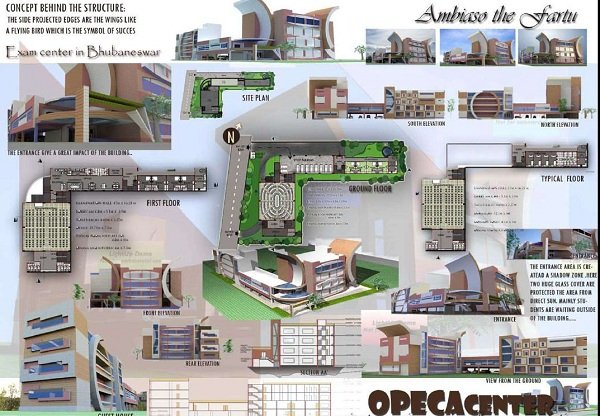
Guide to writing a Synopsis for the Thesis Project
How to write synopsis for a thesis project.
This article would be of great interest to the Final year Architecture students. Writing a Synopsis determines your level of understanding of the chosen topic as your thesis project. We will list out and discuss different steps in which one should proceed with writing a Synopsis.

Introduction
Objectives and scope and limitations, description of the research work, conclusions/summary of the work, list of case studies.
- List of references/literature case studies for thesis research work
- Identification of the project site
Briefly explain the Architectural/technological/social relevance or significance of the research work of your thesis topic. Be precise and include only relevant background material in the introduction. Provide information on past works by way of giving appropriate references.
It should not exceed two pages.
Develop further on the background material provided in the introduction and bring the subject of thesis in the chosen area of research in to focus. Emphasize, based on the content status, the importance of the research problem identified. Should broadly indicate the existing drawbacks and why further research is required to eliminate the drawbacks and find new architectural solutions. Identification of these should be brief and can be out of the scope of the Thesis subject but has to be relevant. You can enumerate those technical challenges one has to address to solve the problems/drawbacks posed herein to place emphasis on the quality of the research work.
I came across a very interesting piece of article on motivation for writing thesis . This reading should be helpful to all.
This should not exceed two pages.
State precisely the questions for which the answers are sought through this thesis work. Define the conceptual, analytical, experimental and/or methodological boundaries within which the exercise will be carried out.
Admit with clarity the limitation of such a research and difficulties involved.
Keeping in mind the limitations and difficulties, identify the precise architecturally relevant area and extent of research that is attempted by you.
Detailed explanations of the drawbacks/problems identified for which you are seeking possible architectural solutions.
Explain in detail how the case studies will help in resolving the drawbacks/problems identified.
Clear the role of literature studies/observations/experiments/questionnaires.
Define with clarity the detailed methodology to be adopted that will lead you towards the Architectural solutions.
Explain in detail how you are specifically equipped to deal with the research and find Architectural solutions.
It should not exceed 10-12 pages.
Highlight major conclusions you are working towards. Clearly bring out not only the generally useful advantages arising out of the work but also the architectural advancement you are seeking through this Thesis work. If there are no conclusions at the moment, then enumerate the possible contributions of the work.
Maximum two pages.
List the probable Case Studies and the relevant areas of study possible in them. Indicate clearly why you have chosen the particular case for study. Make a mention of the ease/difficulty of approach and obtaining information from the case studies. Also give the time frame required for each case study.
It should not exceed one page.
(Also, it is important to know all the factors to be considered for conducting a successful case study .)
List of references/literature studies for thesis research work
List the publications/books you have already identified for your literature study. List only published or accepted books/papers.
Never claim contents of the publications/books as your own. Always give credit where it is due.
Maximum one page.
Identification of Project site
The student has to identify a possible and suitable site for the proposal where the conclusions and solutions can be carried out. The project site may or may not be a live project but should definitely be suitable for the chosen project.
30 thoughts on “Guide to writing a Synopsis for the Thesis Project”
great job…!
dear sir iam a final year architecture student.i am entering 9th semester now.i am supposed to give a synopsis of my thesis project.could you please guide me how to choose topics for my thesis. regards nandheni
hi i am a 9th sem student!!i m completely at my wits end in going ahead with my topic!!althou not a topic my idea is like”to represent space in terms of all 5 elements,’air,water,fire,earth,space(sky)’.which form d very essence of life,present in everything but r disguised!i really dunno how to translate this into a built space!!n wat it l b!can anybody throw some light on this..
Hi Neha This is Arun, i myself am a final year student of architecture and we are also supposed to give synopsis on the thesis topics. and i guess that i am pretty lost. it would be gr8 if u could share in yhing that u have come across regarding the synopsis, how it is done or made.
regards Arun
Hello friends, I hope you have gone through the guidelines for writing the Synopsis. This will definitely be of help to you. Inspite of the guidelines, if you are unable to understand as to what is to be included in your thesis synopsis, you could tell us your topic through our comment section and then we shall have a discussion so that all the readers benefit from it.
Also check out the following link. You will find various articles that will benefit you. Guidelines for a Thesis Project
its so helpful to me,…thanks ..
want to no a certain source to grasp latest architectural updates
Hello Siddhant, We have now made it possible for you to subscribe for FREE updates of Architecture Student Blog!
Subscribe for Architecture Updates
Look forward to see you on our Subscription list. Cheers 🙂
i m architecture final year student i want to take topic related to our cultural in terms of family entertainment but i m confused how to proceed that topic and how to write synopsis for that particular topic plz guide me as i have to submitt ny synopsis on coming tuesday
Hello Farah,
Apologies for the delay in replying. I hope your synopsis writing went well. I can definitely give you feedback and guide you through your thesis project. Do get back in touch and we can discuss your project on the blog.
hi, i’m a final year architecture student. i’m supposed to give my synopsis on the 9th of December. as of now i am planning to do an apparel house( as my school prefers only pure architectural projects at the under graduate level)..kindly suggest a few live case studies in India ..:D regards gayathri.
Hello there,
There is an apparel house in Gurgaon, Haryana.
Such a gr8 help in taking my initial steps towards thesis
I am a architecture 9th semister student and i am working on marble industry thesis ,I have problems in my thesis methodology hope you will guide me
It would be useful if you could post your questions regarding your thesis here so that we can all have a look at it and help you with your thesis.
Hello sir, I m a student of architecture in my final sem. I have choose a juvenile center as my thesis topic. So please sir can u help me out with this. U can mail me on my mail id:[email protected]
Hello,am a student of architecture,I have choose hotel as my thesis topic.really need your help on how to start.
Hello Joshua,
Here is the link to a number of articles on how you could progress with your thesis project. http://architecture-student.com/category/thesis-project/
I am sure this will be useful.
Hi sir I m in my final semester and my topic is institute of game developing and animation. Can you please guide me through.
- Pingback: Architecture Thesis Synopsis | Great Architecture Fan
hello sir, i have just got into my 9th semester of arch. and wanted to know if you could suggest me some case studies regarding my thesis topic i.e. Hospice care center for terminally ill or cancer patients, in india.anything outside india would also be helpfull for literature study.
Hiii frnds… i m architecture final year student, i have choosed my thesis topic as RIVER FRONT DEVELOPMENT ..it will be a gr8 help to me if u give the related data which u have
Hi, I’m architecture 9th sem student. We are supposed to give our synopsis so can u elaborate me further about the topic aqua marine park. The factors considered for choosing the site and will it be a big project or I can work in details in time. Please help.
Hello Shashi,
This will be an interesting design topic but the casestudies would be difficult because i dont think we have good marine parks in India. If you are willing to go to Dubai for a casestudy then I am sure this would be a fantastic project.
Hi, I am architecture final year student..hav opted the church as a topic for thesis.. i want to reinterpret the design methadology biblicaly ..can you help with this.. is there any church in india that i can opt for case study
Hi I am currently working on my design project and masters thesis: Fruits Processing plant, with emphasis on integrating environmental and human factors. I would be greatly appreciate any relevant materials that could aid my work. Thank you……..
Hi am a final year student I hv choose my topic as orphanage nd old-age homes combined . Help me to develop my topic Case study regarding this Will this work out
Hello, I’m a currently working on my final year thesis :Event Centre.I will love to get materials that would aid my work.Thank you…..
Leave a Comment Cancel reply
You must be logged in to post a comment.
Thesis Statement Examples

Practical Thesis Statement Examples That Will Transform Your Writing
10 min read
Published on: Sep 3, 2024
Last updated on: Sep 3, 2024

People also read
Writing a strong thesis statement is key to a great essay, but coming up with the perfect one can be tricky.
No matter if you're working on a personal essay, an argumentative paper, or something else, having clear examples can really help.
In this blog, we’ll explore a variety of thesis statement examples for different types of essays. This will help you understand how to create strong statements that guide your writing and keep your readers engaged.
Let’s find the right thesis for your next essay!
What Is A Thesis Statement?
A thesis statement is a key part of your essay that tells readers what your essay is about. It’s a clear sentence that sums up the main point or argument you’re going to make. Think of it as a guide that helps your readers understand your main idea and what to expect from your essay.
Your thesis statement usually goes at the end of your introduction. It gives your essay direction and helps keep everything focused on your main point.
Examples Of Thesis Statements By Essay Type
To help you see how to write effective thesis statements, here are thesis statement examples for essays of various types. Each example will give you a clearer picture of how to approach various topics.
Examples Of Thesis Statements For Personal Essays
A personal essay thesis statement reflects your unique experiences and feelings. It shares a central idea about a personal story or insight you’re discussing.
Here are a few examples to give you an idea of how to craft your own:
- Overcoming my fear of public speaking taught me that courage is not the absence of fear, but the ability to act despite it.
- Traveling to a new country showed me that stepping out of my comfort zone is the best way to grow and learn.
- My experience of balancing school and a part-time job proved that hard work and dedication can lead to personal success and self-discovery.
Thesis Statement Examples For Informative Essay
A thesis statement for an informative essay provides a clear and specific overview of the topic you’re explaining. It helps readers understand the focus of your essay and what information they can expect to learn.
Let’s take a look at some informative thesis statement examples :
- The process of photosynthesis is essential for plant growth as it converts sunlight into energy and produces oxygen, which is crucial for life on Earth.
- The history of the internet reveals how technological advancements have transformed communication, from early networks to the modern web.
- Understanding the basics of genetic inheritance can explain how traits are passed from parents to offspring and how genetic disorders can occur.
Thesis Statement Examples For Compare And Contrast Essays
A thesis statement for a compare and contrast essay highlights the similarities and differences between two or more subjects. It helps readers understand the main points of comparison and what you will be discussing.
Some examples are:
- While both public and private schools aim to provide quality education, they differ significantly in terms of funding, curriculum flexibility, and student-to-teacher ratios.
- Although electric cars and gasoline-powered cars serve the same purpose of transportation, they differ in their environmental impact, cost, and efficiency.
- The lifestyles of city dwellers and rural residents differ greatly, with urban areas offering more job opportunities and amenities, while rural areas provide a slower pace of life and closer connection to nature.
Argumentative Essay Thesis Statement Examples
A thesis statement for an argumentative essay clearly states your opinion on a hot topic and explains why you hold that view. It shows what you believe and what you’ll be arguing for.
Below are some argumentative thesis statement examples :
- A universal basic income can help reduce poverty and provide financial stability, making it a crucial step toward reducing economic inequality.
- Renewable energy is vital for fighting climate change because it cuts down on greenhouse gas emissions and supports a healthier planet.
- Requiring school uniforms in public schools can decrease peer pressure and help students focus more on their studies.
Thesis Statement Examples For Persuasive Essay
A thesis statement for a persuasive essay aims to convince the reader of a particular viewpoint. It presents your position and hints at the arguments you’ll use to support it.
Some examples include:
- Adopting a plant-based diet is beneficial for health and the environment, as it reduces the risk of chronic diseases and decreases ecological footprints.
- Investing in public transportation improves urban mobility and reduces traffic congestion, leading to a more efficient and eco-friendly city.
- Banning single-use plastics is essential to protect marine life and reduce pollution, helping to preserve the environment for future generations.
Analytical Essay Thesis Statement Examples
A thesis statement for an analytical essay breaks down a topic and examines its components. It highlights what you will analyze and what insights or conclusions you aim to provide.
Here are some good thesis statement examples for analytical essays:
- Analyzing Shakespeare’s use of imagery in "Macbeth" reveals how it enhances the play’s themes of ambition and guilt.
- Examining the impact of social media on communication shows how it has changed the way we interact and perceive relationships.
- The portrayal of leadership in “The Great Gatsby” illustrates how wealth and power can corrupt moral values and influence behavior.
Expository Essay Thesis Statement Examples
A thesis statement for an expository essay explains a topic or idea in detail. It provides a clear summary of what the essay will cover and how it will inform the reader.
See the examples mentioned below:
- The process of recycling involves several key steps, including sorting materials, processing them into raw materials, and creating new products.
- The history of the internet highlights key milestones such as the development of early networks, the rise of the World Wide Web, and the evolution of online communication.
- Understanding the causes of climate change requires examining factors like greenhouse gas emissions, deforestation, and industrial activities.
Process Essay Thesis Statement Examples
A thesis statement for a process essay explains how something is done or how a process works. It gives a clear overview of the steps involved. Take a glance at these examples :
- Making homemade pizza involves preparing the dough, adding toppings, and baking it to create a delicious and customizable meal.
- The steps to start a small business include researching the market, creating a business plan, and securing funding to ensure a successful launch.
- Learning a new language requires practicing speaking and listening skills, studying grammar, and immersing oneself in the language through reading and conversation.
Thesis Statement Examples According to Different Academic Levels
Writing a thesis statement changes as you move through different study levels. Each stage has its own approach and complexity. Here’s how thesis statements might look across different levels:
Thesis Statement Examples for Kids
At a basic level, thesis statements for kids are simple and direct. They usually focus on familiar topics and straightforward ideas. Consider these examples :
- Dogs make great pets because they are loyal, fun, and good with kids.
- Reading books is important because it helps you learn new things and improves your imagination.
Middle School Thesis Statement Examples
In middle school, thesis statements start to involve more detail and support. They reflect a better understanding of how to structure arguments. Here are some examples :
- School uniforms should be required because they promote equality, reduce distractions, and make it easier for students to focus on their studies.
- Eating a balanced diet is crucial for maintaining good health because it provides essential nutrients, boosts energy levels, and helps prevent diseases.
High School Thesis Statement Examples
High school thesis statements are more sophisticated, often including a clear argument and multiple supporting points. Take a look these examples :
- The benefits of online learning outweigh the drawbacks because it offers flexibility, access to a wide range of resources, and the ability to balance education with other responsibilities.
- Participating in extracurricular activities is important for high school students as it helps develop leadership skills, build friendships, and enhance college applications.
College Thesis Statement Examples
At the college level, thesis statements are complex and detailed and often address more complex arguments. Examples include:
- Implementing renewable energy solutions, such as solar and wind power, is essential for reducing our reliance on fossil fuels and mitigating the effects of climate change.
- The rise of social media has transformed political campaigning by increasing voter engagement, spreading misinformation, and altering traditional campaign strategies.
Thesis Statement Examples for Research Papers
For research papers, thesis statements must be well-researched and specific and provide a clear direction for the study. Consider these examples :
- Exploring the effects of childhood trauma on adult mental health reveals significant correlations between early experiences and the development of psychological disorders later in life.
- Investigating the impact of artificial intelligence on the job market shows that while AI creates new opportunities, it also poses challenges related to job displacement and workforce adaptation.
More Examples Of Thesis Statements
As you work on different essays and writing tasks, you’ll see that thesis statements can vary a lot. Here are some additional examples to illustrate their diversity.
Literary Analysis Thesis Statement Examples
- In "To Kill a Mockingbird," Harper Lee uses symbolism, such as the mockingbird, to highlight the themes of innocence and moral growth.
- The use of unreliable narrators in Edgar Allan Poe’s “The Tell-Tale Heart” enhances the story’s exploration of guilt and madness.
Implied Thesis Statement Examples
- Despite its surface simplicity, “The Little Prince” offers a profound critique of adult behavior through its exploration of human nature and relationships.
- The persistent use of color imagery in “The Great Gatsby” subtly emphasizes the theme of the American Dream and its inherent flaws.
Thesis Statement Examples For Research Papers
- Examining the effects of sleep deprivation on academic performance shows a direct link between lack of sleep and reduced cognitive abilities in students.
- Research into the impact of climate change on coastal ecosystems reveals that rising sea levels and increased temperatures are threatening biodiversity and habitat stability.
Complex Thesis Statement Examples
- While the integration of technology in education offers numerous benefits, such as personalized learning and greater accessibility, it also presents challenges related to screen time and data privacy.
- The debate over genetic engineering in agriculture involves both potential benefits, like increased crop yields and disease resistance, and ethical concerns, such as environmental impact and genetic diversity.
In closing,
A strong thesis statement is the backbone of any good essay. It helps guide your writing and keeps your readers focused on your main point. With the examples provided, you can see how to shape your thesis for different types of essays and academic levels.
If you want a little extra help with your thesis statements, check out the thesis statement generator from MyEssayWriter.ai . It’s a handy tool that can help you create and perfect your thesis statements quickly.
For extra help with essay writing, check out our essay writer . It's an AI tool that can write high-quality essays for you in a breeze!
Frequently Asked Questions
How do i write my thesis statement.
To write and start a thesis statement, you should:
- Pick Your Topic: Decide what your essay will be about.
- Formulate Your Argument: Choose your main point or stance on the topic.
- Be Specific: Make sure your statement clearly outlines what you'll discuss.
- Make It Debatable: Your thesis should present an argument that can be supported with evidence.
- Keep It Concise: Aim for one or two sentences that clearly express your main idea.
What 3 things should a thesis statement have?
Typically, a thesis statement format includes three main parts: the topic you're discussing, your main argument or viewpoint , and the reasons or evidence you'll use to back up that argument.
What is an example of a weak and strong thesis statement?
Weak Thesis Statement: "Social media is bad."
- It's too broad and lacks detail.
Strong Thesis Statement: "Social media platforms negatively impact mental health by increasing anxiety and depression among teenagers, and this can be addressed through improved online safety measures."
- It's specific, takes a clear stance, and hints at the main points of the essay.
What is a thesis statement sentence?
A thesis statement sentence is a single sentence in your essay that summarizes your main point or argument. It’s usually found at the end of your introduction and guides the rest of your essay.
Caleb S. (Mass Literature and Linguistics, Masters)
Caleb S. is an accomplished author with over five years of experience and a Master's degree from Oxford University. He excels in various writing forms, including articles, press releases, blog posts, and whitepapers. As a valued author at MyEssayWriter.ai, Caleb assists students and professionals by providing practical tips on research, citation, sentence structure, and style enhancement.
On This Page On This Page
Get Access to Advanced Features with our Affordable Plans
Complimentary Trial
Continue for FREE
OFFER ENDS Today
Signup for Free Access
Access to all Tools
No Credit Card needed
Quota: 1500 Words (6 pages)
Offer ends in: 03hr 19m 8s
Already a user? Login instead
For Monthly Usage
$ 9.99 /month
Up to 2500 words/month
Access to all features
AI Essay Writer
AI Essay Outliner
Go Big Monthly!
$ 14.99 /month
Up to 100,000 words/month
Access to all existing tools
50% off on custom essay orders
500 credits for plagiarism check
Top Annual Savings!
Advanced (4 Months FREE )
$ 99.99 /year
OFFER ENDS Soon
Unlimited essays
12 Months for the price of 8
Access to all upcoming tools
Get started for free
Please enter a valid Name
Please enter a valid email address
Please enter a valid Phone Number
Please enter atleast five characters
Please enter a valid Password
Show Password
Already have an account? Sign In here.
Please enter your email address
Forgot Password?
Don’t have an account? Sign Up
Verify Your Account
Enter the verification codes to confirm your identity.
Code sent to [email protected]
Send again in seconds
Code sent to +1 302 385 6690

Claim Free Essay
Your first custom essay order on our website is FREE!
Academia.edu no longer supports Internet Explorer.
To browse Academia.edu and the wider internet faster and more securely, please take a few seconds to upgrade your browser .
Enter the email address you signed up with and we'll email you a reset link.
- We're Hiring!
- Help Center

WRITING A GOOD Ph.D RESEARCH SYNOPSIS

Synopsis is a short summary of your Ph.D thesis work. This paper suggests some ideas to motivate the young researchers for effectively writing the Ph.D synopsis with essential tips and tricks.This can act as a reference and help young researcher to going to write Ph.D synopsis.
Related Papers
devashish tripathi
Shubham Mishra
Kanchan Kamila
Provides guide to write the Research Project/Dissertation Synopsis
Scientific Research Publishing: Creative Education
Dr. Qais Faryadi
Literature writing is a skill that every PhD candidate must procure to communicate his or her research findings clearly. The main objective of this paper is to facilitate the literature writing process so that PhD candidates under- stand what PhD literature is and are able to write their PhD literature cor- rectly and scientifically. The methodology used in this research is a descrip- tive method as it deliberates and defines the various parts of literature writing process and elucidates the how to do of it in a very unpretentious and under- standing language. As thus, this paper summarizes the various steps of litera- ture writing to pilot the PhD students so that the task of PhD literature writ- ing process becomes adaptable and less discouraging. This research is a useful roadmap especially for students of the social science studies. Additionally, in this paper, literature writing techniques, procedures and important strategies are enlightened in a simple manner. This paper adopts a how-to approach when discussing a variety of relevant topics, such as literature review intro- duction, types of literature review, advantages of literature reviews, objective of literature review, literature review template, and important check lists about literature review are discussed. This paper has 5 parts, such as Intro- duction, Literature Review, Methodology, Results and Conclusion. The lit- erature review chapter is discussed in this paper. I will discuss the rest as a se- ries in the future. Keywords Thesis Writing Process, Literature Review, PhD, Social Science, Research Methodology
The Educational Review, USA
maria Fareed
Scientific Research Publishing: Creative Education.
Thesis writing is a skill that every PhD candidate must acquire to convey his or her research findings clearly. The main objective of this paper is to facili- tate the thesis writing process so that PhD candidates understand what a PhD thesis is and can write their thesis correctly and scientifically. The methodol- ogy used in this research was descriptive as it discusses and describes the var- ious parts of thesis writing process and explains how to do it in a very simple and understanding language. As thus, this article outlines the various steps of thesis writing to guide the PhD candidate so that the task of PhD thesis writ- ing becomes manageable and less daunting. This research is a useful roadmap especially for students of the social sciences studies. Further, in this paper, research procedure and thesis writing strategies are explained in a simple manner. This paper adopts a how-to approach when discussing a variety of relevant topics, such as thesis introduction, types of introductions, introduc- tion statements, problem statement, research questions, hypothesis and con- tributions of the study. This paper has 5 parts: Introduction, Literature Re- view, Methodology, Results and Conclusion. The introduction chapter is dis- cussed in this paper. I will discuss the rest as a series in the future.
International Journal of Pharmaceutical and Biological Science Archive
Mohammed Ismael Rushdi
An abstract is like a movie trailer. People will only consider reading the rest of the manuscript if they find your abstract interesting. It is an outline/brief summary of your paper and your whole project. Keywords: , research, descriptive and informative research.
This book aims to guide researchers, academicians and PhD candidates especially Social Science Researchers on how todo research systematically. Research is a premeditated investigation using scientific methodology (quantitative, qualitative,) to solve a serious problem (not ordinary problem), thus creating additional (new) knowledge. Research is also regarded as an inquiry of reality about something by testing a hypothesis, answering questions, generating new queries, finding solutions, and creating new knowledge. This book guides you how to effectively structure your research from the proposal till VIVA presentation. Although research designs may differ from one discipline to another, a general road map should include the following: Ø Topic of research Ø Research problem, questions and hypotheses Ø Review of current literature Ø Theoretical framework or methodology experimental, observation and so Ø Data collection and testing if any Ø Data analysis Ø Results Ø Discussions and Applications Ø Conclusion Ø References
Loading Preview
Sorry, preview is currently unavailable. You can download the paper by clicking the button above.
RELATED PAPERS
Rakesh Ranjan
Otolaryngology online
Balasubramanian Thiagarajan
Sadaf Zafar
International Journal of Multidisciplinary Research and Explorer (IJMRE)
IJMRE Journal , Almighty C . Tabuena
magendira mani vinayagam
shweta iyer
HUMANUS DISCOURSE
Humanus Discourse
Nicole Albrecht
Basics of Summarizing Research Findings
Dr Saad M Butt
tecnico emergencias
syahir jared
Hongfei Wang
Ximena Eunice Pérez Manjarrez
Teaching and Learning to Co-Create
Sava Popovic
Stevejobs.education
Dr. David Annan
William Schafer
JOHN KARANJA, PhD , Dr. John Karanja
Gazala Hasan
Althea Amor Galdo
Journal of the Pakistan Medical Association
tabinda ashfaq
Claren Sung
Ignacio Illan Conde
- We're Hiring!
- Help Center
- Find new research papers in:
- Health Sciences
- Earth Sciences
- Cognitive Science
- Mathematics
- Computer Science
- Academia ©2024
- Privacy Policy

Home » Thesis – Structure, Example and Writing Guide
Thesis – Structure, Example and Writing Guide
Table of contents.

Definition:
Thesis is a scholarly document that presents a student’s original research and findings on a particular topic or question. It is usually written as a requirement for a graduate degree program and is intended to demonstrate the student’s mastery of the subject matter and their ability to conduct independent research.
History of Thesis
The concept of a thesis can be traced back to ancient Greece, where it was used as a way for students to demonstrate their knowledge of a particular subject. However, the modern form of the thesis as a scholarly document used to earn a degree is a relatively recent development.
The origin of the modern thesis can be traced back to medieval universities in Europe. During this time, students were required to present a “disputation” in which they would defend a particular thesis in front of their peers and faculty members. These disputations served as a way to demonstrate the student’s mastery of the subject matter and were often the final requirement for earning a degree.
In the 17th century, the concept of the thesis was formalized further with the creation of the modern research university. Students were now required to complete a research project and present their findings in a written document, which would serve as the basis for their degree.
The modern thesis as we know it today has evolved over time, with different disciplines and institutions adopting their own standards and formats. However, the basic elements of a thesis – original research, a clear research question, a thorough review of the literature, and a well-argued conclusion – remain the same.
Structure of Thesis
The structure of a thesis may vary slightly depending on the specific requirements of the institution, department, or field of study, but generally, it follows a specific format.
Here’s a breakdown of the structure of a thesis:
This is the first page of the thesis that includes the title of the thesis, the name of the author, the name of the institution, the department, the date, and any other relevant information required by the institution.
This is a brief summary of the thesis that provides an overview of the research question, methodology, findings, and conclusions.
This page provides a list of all the chapters and sections in the thesis and their page numbers.
Introduction
This chapter provides an overview of the research question, the context of the research, and the purpose of the study. The introduction should also outline the methodology and the scope of the research.
Literature Review
This chapter provides a critical analysis of the relevant literature on the research topic. It should demonstrate the gap in the existing knowledge and justify the need for the research.
Methodology
This chapter provides a detailed description of the research methods used to gather and analyze data. It should explain the research design, the sampling method, data collection techniques, and data analysis procedures.
This chapter presents the findings of the research. It should include tables, graphs, and charts to illustrate the results.
This chapter interprets the results and relates them to the research question. It should explain the significance of the findings and their implications for the research topic.
This chapter summarizes the key findings and the main conclusions of the research. It should also provide recommendations for future research.
This section provides a list of all the sources cited in the thesis. The citation style may vary depending on the requirements of the institution or the field of study.
This section includes any additional material that supports the research, such as raw data, survey questionnaires, or other relevant documents.
How to write Thesis
Here are some steps to help you write a thesis:
- Choose a Topic: The first step in writing a thesis is to choose a topic that interests you and is relevant to your field of study. You should also consider the scope of the topic and the availability of resources for research.
- Develop a Research Question: Once you have chosen a topic, you need to develop a research question that you will answer in your thesis. The research question should be specific, clear, and feasible.
- Conduct a Literature Review: Before you start your research, you need to conduct a literature review to identify the existing knowledge and gaps in the field. This will help you refine your research question and develop a research methodology.
- Develop a Research Methodology: Once you have refined your research question, you need to develop a research methodology that includes the research design, data collection methods, and data analysis procedures.
- Collect and Analyze Data: After developing your research methodology, you need to collect and analyze data. This may involve conducting surveys, interviews, experiments, or analyzing existing data.
- Write the Thesis: Once you have analyzed the data, you need to write the thesis. The thesis should follow a specific structure that includes an introduction, literature review, methodology, results, discussion, conclusion, and references.
- Edit and Proofread: After completing the thesis, you need to edit and proofread it carefully. You should also have someone else review it to ensure that it is clear, concise, and free of errors.
- Submit the Thesis: Finally, you need to submit the thesis to your academic advisor or committee for review and evaluation.
Example of Thesis
Example of Thesis template for Students:
Title of Thesis
Table of Contents:
Chapter 1: Introduction
Chapter 2: Literature Review
Chapter 3: Research Methodology
Chapter 4: Results
Chapter 5: Discussion
Chapter 6: Conclusion
References:
Appendices:
Note: That’s just a basic template, but it should give you an idea of the structure and content that a typical thesis might include. Be sure to consult with your department or supervisor for any specific formatting requirements they may have. Good luck with your thesis!
Application of Thesis
Thesis is an important academic document that serves several purposes. Here are some of the applications of thesis:
- Academic Requirement: A thesis is a requirement for many academic programs, especially at the graduate level. It is an essential component of the evaluation process and demonstrates the student’s ability to conduct original research and contribute to the knowledge in their field.
- Career Advancement: A thesis can also help in career advancement. Employers often value candidates who have completed a thesis as it demonstrates their research skills, critical thinking abilities, and their dedication to their field of study.
- Publication : A thesis can serve as a basis for future publications in academic journals, books, or conference proceedings. It provides the researcher with an opportunity to present their research to a wider audience and contribute to the body of knowledge in their field.
- Personal Development: Writing a thesis is a challenging task that requires time, dedication, and perseverance. It provides the student with an opportunity to develop critical thinking, research, and writing skills that are essential for their personal and professional development.
- Impact on Society: The findings of a thesis can have an impact on society by addressing important issues, providing insights into complex problems, and contributing to the development of policies and practices.
Purpose of Thesis
The purpose of a thesis is to present original research findings in a clear and organized manner. It is a formal document that demonstrates a student’s ability to conduct independent research and contribute to the knowledge in their field of study. The primary purposes of a thesis are:
- To Contribute to Knowledge: The main purpose of a thesis is to contribute to the knowledge in a particular field of study. By conducting original research and presenting their findings, the student adds new insights and perspectives to the existing body of knowledge.
- To Demonstrate Research Skills: A thesis is an opportunity for the student to demonstrate their research skills. This includes the ability to formulate a research question, design a research methodology, collect and analyze data, and draw conclusions based on their findings.
- To Develop Critical Thinking: Writing a thesis requires critical thinking and analysis. The student must evaluate existing literature and identify gaps in the field, as well as develop and defend their own ideas.
- To Provide Evidence of Competence : A thesis provides evidence of the student’s competence in their field of study. It demonstrates their ability to apply theoretical concepts to real-world problems, and their ability to communicate their ideas effectively.
- To Facilitate Career Advancement : Completing a thesis can help the student advance their career by demonstrating their research skills and dedication to their field of study. It can also provide a basis for future publications, presentations, or research projects.
When to Write Thesis
The timing for writing a thesis depends on the specific requirements of the academic program or institution. In most cases, the opportunity to write a thesis is typically offered at the graduate level, but there may be exceptions.
Generally, students should plan to write their thesis during the final year of their graduate program. This allows sufficient time for conducting research, analyzing data, and writing the thesis. It is important to start planning the thesis early and to identify a research topic and research advisor as soon as possible.
In some cases, students may be able to write a thesis as part of an undergraduate program or as an independent research project outside of an academic program. In such cases, it is important to consult with faculty advisors or mentors to ensure that the research is appropriately designed and executed.
It is important to note that the process of writing a thesis can be time-consuming and requires a significant amount of effort and dedication. It is important to plan accordingly and to allocate sufficient time for conducting research, analyzing data, and writing the thesis.
Characteristics of Thesis
The characteristics of a thesis vary depending on the specific academic program or institution. However, some general characteristics of a thesis include:
- Originality : A thesis should present original research findings or insights. It should demonstrate the student’s ability to conduct independent research and contribute to the knowledge in their field of study.
- Clarity : A thesis should be clear and concise. It should present the research question, methodology, findings, and conclusions in a logical and organized manner. It should also be well-written, with proper grammar, spelling, and punctuation.
- Research-Based: A thesis should be based on rigorous research, which involves collecting and analyzing data from various sources. The research should be well-designed, with appropriate research methods and techniques.
- Evidence-Based : A thesis should be based on evidence, which means that all claims made in the thesis should be supported by data or literature. The evidence should be properly cited using appropriate citation styles.
- Critical Thinking: A thesis should demonstrate the student’s ability to critically analyze and evaluate information. It should present the student’s own ideas and arguments, and engage with existing literature in the field.
- Academic Style : A thesis should adhere to the conventions of academic writing. It should be well-structured, with clear headings and subheadings, and should use appropriate academic language.
Advantages of Thesis
There are several advantages to writing a thesis, including:
- Development of Research Skills: Writing a thesis requires extensive research and analytical skills. It helps to develop the student’s research skills, including the ability to formulate research questions, design and execute research methodologies, collect and analyze data, and draw conclusions based on their findings.
- Contribution to Knowledge: Writing a thesis provides an opportunity for the student to contribute to the knowledge in their field of study. By conducting original research, they can add new insights and perspectives to the existing body of knowledge.
- Preparation for Future Research: Completing a thesis prepares the student for future research projects. It provides them with the necessary skills to design and execute research methodologies, analyze data, and draw conclusions based on their findings.
- Career Advancement: Writing a thesis can help to advance the student’s career. It demonstrates their research skills and dedication to their field of study, and provides a basis for future publications, presentations, or research projects.
- Personal Growth: Completing a thesis can be a challenging and rewarding experience. It requires dedication, hard work, and perseverance. It can help the student to develop self-confidence, independence, and a sense of accomplishment.
Limitations of Thesis
There are also some limitations to writing a thesis, including:
- Time and Resources: Writing a thesis requires a significant amount of time and resources. It can be a time-consuming and expensive process, as it may involve conducting original research, analyzing data, and producing a lengthy document.
- Narrow Focus: A thesis is typically focused on a specific research question or topic, which may limit the student’s exposure to other areas within their field of study.
- Limited Audience: A thesis is usually only read by a small number of people, such as the student’s thesis advisor and committee members. This limits the potential impact of the research findings.
- Lack of Real-World Application : Some thesis topics may be highly theoretical or academic in nature, which may limit their practical application in the real world.
- Pressure and Stress : Writing a thesis can be a stressful and pressure-filled experience, as it may involve meeting strict deadlines, conducting original research, and producing a high-quality document.
- Potential for Isolation: Writing a thesis can be a solitary experience, as the student may spend a significant amount of time working independently on their research and writing.
About the author
Muhammad Hassan
Researcher, Academic Writer, Web developer
You may also like

Research Techniques – Methods, Types and Examples

Research Methodology – Types, Examples and...

Informed Consent in Research – Types, Templates...

Research Summary – Structure, Examples and...

Critical Analysis – Types, Examples and Writing...

Research Report – Example, Writing Guide and...

Online Students
For All Online Programs
International Students
On Campus, need or have Visa
Campus Students
For All Campus Programs
What a Thesis Paper is and How to Write One

From choosing a topic and conducting research to crafting a strong argument, writing a thesis paper can be a rewarding experience.
It can also be a challenging experience. If you've never written a thesis paper before, you may not know where to start. You may not even be sure exactly what a thesis paper is. But don't worry; the right support and resources can help you navigate this writing process.
What is a Thesis Paper?

A thesis paper is a type of academic essay that you might write as a graduation requirement for certain bachelor's, master's or honors programs. Thesis papers present your own original research or analysis on a specific topic related to your field.
“In some ways, a thesis paper can look a lot like a novella,” said Shana Chartier , director of information literacy at Southern New Hampshire University (SNHU). “It’s too short to be a full-length novel, but with the standard size of 40-60 pages (for a bachelor’s) and 60-100 pages (for a master’s), it is a robust exploration of a topic, explaining one’s understanding of a topic based on personal research.”
Chartier has worked in academia for over 13 years and at SNHU for nearly eight. In her role as an instructor and director, Chartier has helped to guide students through the writing process, like editing and providing resources.
Chartier has written and published academic papers such as "Augmented Reality Gamifies the Library: A Ride Through the Technological Frontier" and "Going Beyond the One-Shot: Spiraling Information Literacy Across Four Years." Both of these academic papers required Chartier to have hands-on experience with the subject matter. Like a thesis paper, they also involved hypothesizing and doing original research to come to a conclusion.
“When writing a thesis paper, the importance of staying organized cannot be overstated,” said Chartier. “Mapping out each step of the way, making firm and soft deadlines... and having other pairs of eyes on your work to ensure academic accuracy and clean editing are crucial to writing a successful paper.”
How Do I Choose a Topic For My Thesis Paper?

What your thesis paper is for will determine some of the specific requirements and steps you might take, but the first step is usually the same: Choosing a topic.
“Choosing a topic can be daunting," said Rochelle Attari , a peer tutor at SNHU. "But if (you) stick with a subject (you're) interested in... choosing a topic is much more manageable.”
Similar to a thesis, Attari recently finished the capstone for her bachelor’s in psychology . Her bachelor’s concentration is in forensics, and her capstone focused on the topic of using a combined therapy model for inmates who experience substance abuse issues to reduce recidivism.
“The hardest part was deciding what I wanted to focus on,” Attari said. “But once I nailed down my topic, each milestone was more straightforward.”
In her own writing experience, Attari said brainstorming was an important step when choosing her topic. She recommends writing down different ideas on a piece of paper and doing some preliminary research on what’s already been written on your topic.
By doing this exercise, you can narrow or broaden your ideas until you’ve found a topic you’re excited about. " Brainstorming is essential when writing a paper and is not a last-minute activity,” Attari said.
How Do I Structure My Thesis Paper?
Thesis papers tend to have a standard format with common sections as the building blocks.
While the structure Attari describes below will work for many theses, it’s important to double-check with your program to see if there are any specific requirements. Writing a thesis for a Master of Fine Arts, for example, might actually look more like a fiction novel.
According to Attari, a thesis paper is often structured with the following major sections:
Introduction
- Literature review
- Methods, results
Now, let’s take a closer look at what each different section should include.
Your introduction is your opportunity to present the topic of your thesis paper. In this section, you can explain why that topic is important. The introduction is also the place to include your thesis statement, which shows your stance in the paper.
Attari said that writing an introduction can be tricky, especially when you're trying to capture your reader’s attention and state your argument.
“I have found that starting with a statement of truth about a topic that pertains to an issue I am writing about typically does the trick,” Attari said. She demonstrated this advice in an example introduction she wrote for a paper on the effects of daylight in Alaska:
In the continental United States, we can always count on the sun rising and setting around the same time each day, but in Alaska, during certain times of the year, the sun rises and does not set for weeks. Research has shown that the sun provides vitamin D and is an essential part of our health, but little is known about how daylight twenty-four hours a day affects the circadian rhythm and sleep.
In the example Attari wrote, she introduces the topic and informs the reader what the paper will cover. Somewhere in her intro, she said she would also include her thesis statement, which might be:
Twenty-four hours of daylight over an extended period does not affect sleep patterns in humans and is not the cause of daytime fatigue in northern Alaska .
Literature Review
In the literature review, you'll look at what information is already out there about your topic. “This is where scholarly articles about your topic are essential,” said Attari. “These articles will help you find the gap in research that you have identified and will also support your thesis statement."
Telling your reader what research has already been done will help them see how your research fits into the larger conversation. Most university libraries offer databases of scholarly/peer-reviewed articles that can be helpful in your search.
In the methods section of your thesis paper, you get to explain how you learned what you learned. This might include what experiment you conducted as a part of your independent research.
“For instance,” Attari said, “if you are a psychology major and have identified a gap in research on which therapies are effective for anxiety, your methods section would consist of the number of participants, the type of experiment and any other particulars you would use for that experiment.”
In this section, you'll explain the results of your study. For example, building on the psychology example Attari outlined, you might share self-reported anxiety levels for participants trying different kinds of therapies. To help you communicate your results clearly, you might include data, charts, tables or other visualizations.
The discussion section of your thesis paper is where you will analyze and interpret the results you presented in the previous section. This is where you can discuss what your findings really mean or compare them to the research you found in your literature review.
The discussion section is your chance to show why the data you collected matters and how it fits into bigger conversations in your field.
The conclusion of your thesis paper is your opportunity to sum up your argument and leave your reader thinking about why your research matters.
Attari breaks the conclusion down into simple parts. “You restate the original issue and thesis statement, explain the experiment's results and discuss possible next steps for further research,” she said.
Find Your Program
Resources to help write your thesis paper.
While your thesis paper may be based on your independent research, writing it doesn’t have to be a solitary process. Asking for help and using the resources that are available to you can make the process easier.
If you're writing a thesis paper, some resources Chartier encourages you to use are:
- Citation Handbooks: An online citation guide or handbook can help you ensure your citations are correct. APA , MLA and Chicago styles have all published their own guides.
- Citation Generators: There are many citation generator tools that help you to create citations. Some — like RefWorks — even let you directly import citations from library databases as you research.
- Your Library's Website: Many academic and public libraries allow patrons to access resources like databases or FAQs. Some FAQs at the SNHU library that might be helpful in your thesis writing process include “ How do I read a scholarly article? ” or “ What is a research question and how do I develop one? ”
It can also be helpful to check out what coaching or tutoring options are available through your school. At SNHU, for example, the Academic Support Center offers writing and grammar workshops , and students can access 24/7 tutoring and 1:1 sessions with peer tutors, like Attari.
"Students can even submit their papers and receive written feedback... like revisions and editing suggestions," she said.
If you are writing a thesis paper, there are many resources available to you. It's a long paper, but with the right mindset and support, you can successfully navigate the process.
“Pace yourself,” said Chartier. “This is a marathon, not a sprint. Setting smaller goals to get to the big finish line can make the process seem less daunting, and remember to be proud of yourself and celebrate your accomplishment once you’re done. Writing a thesis is no small task, and it’s important work for the scholarly community.”
A degree can change your life. Choose your program from 200+ SNHU degrees that can take you where you want to go.
Meg Palmer ’18 is a writer and scholar by trade who loves reading, riding her bike and singing in a barbershop quartet. She earned her bachelor’s degree in English, language and literature at Southern New Hampshire University (SNHU) and her master’s degree in writing, rhetoric and discourse at DePaul University (’20). While attending SNHU, she served as the editor-in-chief of the campus student newspaper, The Penmen Press, where she deepened her passion for writing. Meg is an adjunct professor at Johnson and Wales University, where she teaches first year writing, honors composition, and public speaking. Connect with her on LinkedIn .
Explore more content like this article

What is the Difference Between Bachelor’s and Master’s Degrees?

Academic Referencing: How to Cite a Research Paper

What is Considered Plagiarism And How to Avoid It
About southern new hampshire university.

SNHU is a nonprofit, accredited university with a mission to make high-quality education more accessible and affordable for everyone.
Founded in 1932, and online since 1995, we’ve helped countless students reach their goals with flexible, career-focused programs . Our 300-acre campus in Manchester, NH is home to over 3,000 students, and we serve over 135,000 students online. Visit our about SNHU page to learn more about our mission, accreditations, leadership team, national recognitions and awards.

How to choose a topic and Synopsis
How to choose a topic and synopsis.
Rehoboth Academic Services offers you guidance with how to choose a topic for a thesis, paper or any other research project. Selecting the right topic for your research project can be one of the most daunting tasks, as your research topic, the thesis statement needs to be unique and relevant to your research interest. Most PhD scholars, owing to lack of incorrect guidance, choose an inappropriate topic for their research and dissertation.
At Rehoboth Academic Services, we highly recommend that you choose a research advisor who will guide you throughout your PhD program. It is vital that you have a serious research approach. Your aim should be to work on ideas that have not been explored yet by others in the same field. Our PhD research advisors help assist you in selection of the topic. Our team is experienced in helping numerous students from different fields in their topic selection, for PhDs, MBAs, MBBS and various post-graduate courses.
Rehoboth Academic Services offers to choose a topic for you that match your interests while remaining related to the subject that you are pursuing. The topic we guide you in selecting will help keep you motivated and your research interest intact.
What are the deliverables Rehoboth Academic Services offers?
- Four original topics related to your area of research interest.
- 150 words of description on the topic that you select.
- Guidance on developing the research problem related to the selected topic.
What is the outcome that Rehoboth Academic Services promises?
- Current topics relevant to your research area.
- Topics that are selected can be completed within a stipulated time-period.
- Appropriate references to support the topic will be provided.
- 7 days of turnaround time.
We also offer PhD Proposal Services.
Your thesis or research proposal is one of the most important steps in the development of research. Laying the foundation for your final research, if this step is not thought out well, you may start a study only to find flaws, such as that your variables are not measuring what they need to measure. Academicians agree that proposal preparation is the most demanding part of the research process, therefore due diligence is required while preparing this document.
The experts at Rehoboth Academic Services are here to help you write your research proposal or synopsis. We understand that it is a time-consuming process that needs skills and a thorough understanding of the topic.
What deliverables does Rehoboth Academic Services offer you?
- A research design created in consultation with you.
- Identification of research gaps, dependent and independent variables.
- Relevant and appropriate framework based on the theoretical model.
- A proposal drafted according to your needs.
- Revisions according to your requirements (up to 15 days).
To achieve this, we require a few things:
- Your research topic
- University guidelines
- Structure of the proposal
- Objectives of the research and your expectations for the outcome.
- Specific details about the research, including where you would like to conduct the study, your participants and so on.
Rehoboth Academic Services promises you an error-free thesis proposal, with a unique theoretical framework and relevant, adequate references.
#Mission2.0 is here to disrupt the mundane. Are you? Join Now
- BIM Professional Course for Architects
- Master Computational Design Course
- BIM Professional Course For Civil Engineers
- Hire From Us

Request a callback

- Architecture & Construction
- Computational Design
- Company News
- Expert Talks
Chat With Us
Architecture Thesis Projects: A Comprehensive List of 30 Topics to Pick From (Updated 2024)

Neha Sharma
13 min read
March 18, 2024

Table of Contents
Architecture Thesis: A culmination of all those years of intense training, sleepless nights, countless submissions and unforgettable memories. The grand finale!
It is a real test to showcase all the skills you’ve gained over the years in a single project. Naturally, choosing the right topic from an ocean of architecture thesis topics is one of the biggest challenges you can face as a final year student, as the topic itself may define the trajectory of your thesis!
To ease your conflicted mind, we have curated a comprehensive list of popular architecture thesis projects you might want to explore in your final year, along with links to relevant theses across the internet for your ready reference.
Go on, have a look! What sparks your interest?
Housing/ Residential Projects
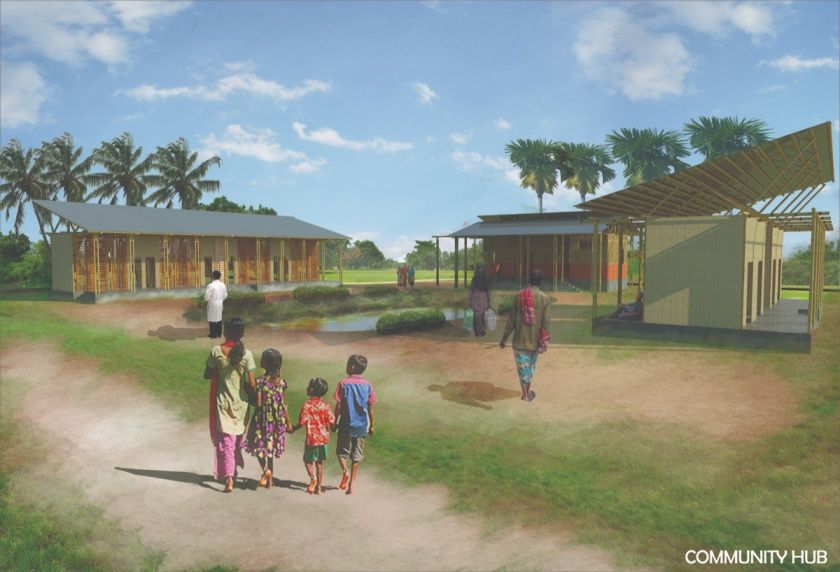
1. Affordable Housing
“Housing for all” is a major goal developing countries are striving to achieve. Not everyone has the resources to own a house or even rent one out. Conscious and well-planned housing design can turn cities into places where owning a house is not merely a dream. And architects can play a pivotal role in achieving this noble goal.
2. Gated Communities
With the city centres choking with pollution, traffic congestion and over-population, many people are now moving to the suburbs in closed, secure and private gated communities. These colonies circumference almost every major city now, with more emerging as you read. A gated community design could be an interesting (though slightly controversial) architecture thesis topic to explore residential neighbourhood planning.
3. Modular/ Disaster Relief/ Emergency Shelters
Land and resources are limited but the demand for them only keeps increasing giving rise to environmental hazards like deforestation, pollution and depletion of natural assets. In a rapidly changing, calamity-prone world, the design of modular, mobile, disaster relief shelters is the need of the hour!
4. Slum Redevelopment
Urban informality may be a fascinating, complex issue to tackle for your architecture thesis projects. Many people have varied opinions on the dense, informal urban developments popularly known as ‘slums’ , but few are willing to tackle the difficult issue from top to bottom (or bottom up!). Are you one of the few?
Institutional Projects

5. Educational and Skill-Training Institutions
Schools play an important role in shaping a person and are key in bringing up generations of bright individuals. Educational and skill-training institutions have vast options, ranging from kindergartens to higher-education institutes; schools of dance to special-needs institutes ! Ready to shape minds?
6. Rehabilitation and Wellness Institutions
A sound mind and sound body are key to a happy life!
Unfortunately, sometimes individuals have to be institutionalised to get their health back on track. Rehabilitation centres and centres for people with depression or trauma aim at people’s mental wellness, while public gyms and civic sports centres aim at people’s physical wellness. If healing architecture and landscape is something you like, this could be the best architecture thesis topic for you!
7. Research Institutions
Progress in science, technology and humanities improves our way of living and ensures our well-being. The Sheldon Coopers among us wouldn’t be happy to see any fewer research centres and laboratories than there are!
Public Infrastructure Projects

8. Hospitals
Healthcare services are undoubtedly the most important services any region needs. The pandemic has made us understand how under-equipped even the best hospitals can be and so there is an even bigger reason for every hospital, be it multi-speciality/ speciality , maternity, special needs, public or private , to be as well designed as possible. This, more than ever, is the need of the hour and can make for a pressing architecture thesis project.
9. Transit Hubs
Airports , Bus Terminals , Railway Stations , Inland Waterways, Seaports.
Do you love to travel? Have you ever waited for a train and imagined how much better that railway station could be? Then what are you waiting for? Be the change!
10. Sports Stadia
Remember that first stadium experience of watching a cricket or football match? The energy of the crowd, the adrenaline rush! Most group sports stadia ( Cricket , Football , Hockey, Baseball, etc) and sports cities require meticulous study before designing, making a very suitable architecture thesis project for students.
11. Urban/Street Redevelopment
How often do we walk the streets of our cities and almost die because a bike passed within inches of us? Street redevelopment projects catering to pedestrianisation are proven to improve the lives of millions and are rapidly gaining urgency in the urban design domain.
These projects often require extensive site study. Not sure what all to cover in your site analysis? Read - Site Analysis Categories You Need to Cover For Your Architecture Thesis Project .
12. Waterfront Development
Rivers are considered sacred and life-giving across the world. The pitiful conditions of water bodies today have led urban designers to take up River/Canal-front Development Projects which aim at minimising water pollution, a smooth transition from land to water, and ultimately encouraging visitors for leisure and fun activities.
13. Public Parks and Plazas
Parks are the lungs of the concrete jungles many of us live in. After a day of intense work, all we need is some greenery and fresh air; or to grab a beer at that corner cafe in the city square! The design of public parks, plazas and playgrounds could be the best architecture thesis topic for an urban/landscape enthusiast.
14. Social Infrastructure
A robust, well-functioning society accommodates and facilitates the wellness of all its citizens and living beings. Infrastructure like orphanages , nursing homes , animal shelters , night shelters , daycare centres, banks, prisons , juvenile schools, community development centres , and many more tend to those social needs of the society which cannot be overlooked. Inclined towards public welfare? Look no further!
Socio-Cultural Projects

15. Community and Convention Centres
Humans are social animals. Now and then, we crave a meet-and-greet. Community and Convention Centres cater to this very need, and exploring the design angles for human interaction may be something worthy of your architecture thesis project. Be ready for competition though, this is one of the most popular architecture thesis topics students undertake!
16. Museums and Libraries
The culture-lovers among us would understand the value of a good museum or library and appreciate a well-designed one. Be it a museum of arts and crafts, culture, architecture , history or science, if the give and take of knowledge through some entertainment and delight (infotainment) is something you see yourself doing, then this could be the best architecture thesis topic for you.
17. Memorials
Memorials are the physical manifestations of the struggles endured, victories earned and life-changing events in history. They remind us to never forget the past, hoping for a better future at the same time, making memorial design both a fascinating yet weighted exercise.
18. Places of Worship/ Spiritual Centres
One cannot separate a human from their faith. Having a place to worship or connect with one’s spiritual self is as important to a human as going to school or a cinema hall. Places of worship like temples, churches, masjids, gurudwaras, monasteries , etcetera; and spiritual or meditation centres serve as places for gathering and become important landmarks in a settlement.
%20(1).png?width=767&height=168&name=BIM-A%20A%20(Course%20Banner)%20(1).png)
Conservation and Heritage Projects

19. Conservation of Heritage Structures
Conservation of the priceless built heritage like palaces, monuments, places of worship, ancient settlements, etc has always been on the agenda of organisations like UNESCO and the Archeological Survey of India. If historical significance gets your heart rate up, hi history nerd! Help in conserving our heritage structures !
20. Adaptive Reuse of Heritage Buildings
History nerd, if you’re still here, here’s another architecture thesis topic for you. Some heritage can be conserved to attract tourists and some that are too out-of-order could be modified and reused for a different purpose, generating economy. Converting royal palaces into heritage hotels, a king’s court into an emergency ward for covid patients or factories into community spaces, adaptive reuse of the built form requires fine skill, respect for heritage, and an active imagination!
Offices/ Corporate Projects

21. Government Buildings
Workspaces for all government officials are mandatory for smooth administration. The scale of government buildings is diverse, from the Central Vista Redevelopment Project (*ahem*) to a district-sessions court. Some common categories are high courts, government-owned banks, secretariat and corporation buildings , income-tax offices, assembly and gathering centres , media offices and so on.
Sounds boring? Don’t be so sure. What originally sounds typical is where there is maximum potential to surprise your critics!
22. Corporate Office Towers
We all have seen or at least talked about the famous corporate jungles of our towns. They not only serve as important landmarks but help in increasing the economic value of a region (Very SEZ-y!). If you wanna tame the jungle, you could explore corporate office-building design for your architecture thesis topic.
23. Co-working and Remote-working Spaces
A popular trend before COVID was sharing workspaces, which now have the potential to be thought of as remote-working spaces! Rethinking the design of co-working spaces is very relevant to the times and has great scope for innovation.
With the times we live in, this could be the best architecture thesis topic!
Entertainment and Commercial Projects

24. Theatres and Auditoria
Who doesn’t like good showtime with family and friends? Theatres, auditoria and performance centres are the core of spaces showcasing and witnessing talent, and fall under another typology which has the potential to be reworked post-pandemic. The design of such entertainment stations can test the knowledge of large-span structures without losing a strong grip on creativity and functionality.
25. Multiplexes and Malls
Malls and multiplexes are very popular among the masses as they possess multiple brands of shopping, entertainment and food centres. Whether or not you agree with the mall typology, more keep coming up in growing towns every year. So why not study how they work and improve the concept for your architecture thesis project? The consumerist urbania will thank you!
26. Marketplaces
Shopping for groceries and essential commodities is a frequent need, and most people head to a single marketplace for all their essential goods shopping. A place with a high frequency of movement requires meticulous and thorough design, but can also be one of the most fun challenges to take up! Think farmer markets, community-owned produce markets, mandis, harbour fish markets, and flea markets, the possibilities are endless!
27. Mixed-Use Hubs
Taking your design challenge up a notch is by taking up a mixed-use hub . This is a high-density area that caters to more than one function and has mega economic value. It could be a combination of residential, commercial, institutional, or hospitality, commercial and public space, or much more. This concept is taken to another level by bringing transit hubs into the fray with transit-oriented development!
28. Film, Photo and Animation Studios
The use of digital media has increased multifold in the past couple of decades. A lot of creatives express themselves through digital content, increasing the need for more film , photo, animation and integrated studios . Since these functions can be highly specialised, there is a lot of potential to do impressive research for your architecture thesis project!
Hospitality and Tourism Projects

29. Eco-Tourism Resorts and Visiting Centres
Imagine spending a weekend at a secluded place, close to nature, with all the facilities you need to relax and just de-stress! Ecological resorts and tourist visiting centres aim to cause as little damage to the environment as possible. Keen on environmental sustainability, eco-tourism resorts should be encouraged in the tourism and hospitality industry and make for very relevant architecture thesis topics.
Landscape architecture enthusiasts, where are you all at?
30. Backpacker Lodging/ Youth Hostels
While the question of travel arises, not everyone can afford finely kempt hotels or resorts to lodge at. The youth may opt for backpacking trips to save money as well as to have an interesting experience! Backpacking/ youth hostels like Zostel and Nomads World are buzzing for their affordability, convenience and prospects of networking with like-minded people. If this is your jam, consider creating innovative spaces for it!
Futuristic/ Sci-fi/ Conceptual Projects

How about a settlement on Mars? Or a concert hall in the air? A transit hub of 2050? A forest within the city? Perhaps a residential colony on the water!
Such futuristic or conceptual architecture thesis topics are all the more enthralling as they might not have any precedents. They stretch a creative brain to its limit, and in the process may transform into a brilliant idea. Challenging conventions, thinking out of the box and taking up a futuristic architecture thesis project could be your achievement (both in design and in convincing the faculty) as a young designer!
Having read about some common architecture thesis topics, it is important to know that you must not be limited to the above list. Your architecture thesis is your own brainchild, and it does not need to conform or even fit within a category.
A great architecture thesis is also a key ingredient in creating a kickass architecture portfolio ! So give your all. Who knows, you may even end up receiving an award for your architecture thesis !
Hoping you found the inspiration you were looking for!
Need more guidance with your architecture thesis project? Head straight to our A-Z Architecture Thesis Guide !
Learn how computational design can help your career
Speak with an expert now, related topics.
- Architecture and Construction
- design careers
- future tech
Related articles
.png)
A Definitive Guide on How to Choose Architecture Thesis Topic

Sanjana Aggarwal
May 12, 2023
Creative Jobs for Architects That Are Shaping the Future of the AECO Industry

Pragya Sharma
January 27, 2023

Site Analysis Categories You Need to Cover For Your Architecture Thesis Project
May 17, 2022
How To Design The Best Architecture Portfolio in 2024?

Saumya Verma
November 16, 2022
12 min read

Ready to skyrocket your career?
Your next chapter in AEC begins with Novatr!
As you would have gathered, we are here to help you take the industry by storm with advanced, tech-first skills.

Dare to Disrupt.
Join thousands of people who organise work and life with Novatr.

Join our newsletter
We’ll send you a nice letter once per week. No spam.
- Become a Mentor
- Careers at Novatr
- Events & Webinars
- Privacy Policy
- Terms of Use
©2023 Novatr Network Pvt. Ltd.
All Rights Reserved
25 Thesis Statement Examples

Chris Drew (PhD)
Dr. Chris Drew is the founder of the Helpful Professor. He holds a PhD in education and has published over 20 articles in scholarly journals. He is the former editor of the Journal of Learning Development in Higher Education. [Image Descriptor: Photo of Chris]
Learn about our Editorial Process

A thesis statement is needed in an essay or dissertation . There are multiple types of thesis statements – but generally we can divide them into expository and argumentative. An expository statement is a statement of fact (common in expository essays and process essays) while an argumentative statement is a statement of opinion (common in argumentative essays and dissertations). Below are examples of each.
Strong Thesis Statement Examples

1. School Uniforms
“Mandatory school uniforms should be implemented in educational institutions as they promote a sense of equality, reduce distractions, and foster a focused and professional learning environment.”
Best For: Argumentative Essay or Debate
Read More: School Uniforms Pros and Cons

2. Nature vs Nurture
“This essay will explore how both genetic inheritance and environmental factors equally contribute to shaping human behavior and personality.”
Best For: Compare and Contrast Essay
Read More: Nature vs Nurture Debate

3. American Dream
“The American Dream, a symbol of opportunity and success, is increasingly elusive in today’s socio-economic landscape, revealing deeper inequalities in society.”
Best For: Persuasive Essay
Read More: What is the American Dream?

4. Social Media
“Social media has revolutionized communication and societal interactions, but it also presents significant challenges related to privacy, mental health, and misinformation.”
Best For: Expository Essay
Read More: The Pros and Cons of Social Media

5. Globalization
“Globalization has created a world more interconnected than ever before, yet it also amplifies economic disparities and cultural homogenization.”
Read More: Globalization Pros and Cons

6. Urbanization
“Urbanization drives economic growth and social development, but it also poses unique challenges in sustainability and quality of life.”
Read More: Learn about Urbanization

7. Immigration
“Immigration enriches receiving countries culturally and economically, outweighing any perceived social or economic burdens.”
Read More: Immigration Pros and Cons

8. Cultural Identity
“In a globalized world, maintaining distinct cultural identities is crucial for preserving cultural diversity and fostering global understanding, despite the challenges of assimilation and homogenization.”
Best For: Argumentative Essay
Read More: Learn about Cultural Identity

9. Technology
“Medical technologies in care institutions in Toronto has increased subjcetive outcomes for patients with chronic pain.”
Best For: Research Paper

10. Capitalism vs Socialism
“The debate between capitalism and socialism centers on balancing economic freedom and inequality, each presenting distinct approaches to resource distribution and social welfare.”

11. Cultural Heritage
“The preservation of cultural heritage is essential, not only for cultural identity but also for educating future generations, outweighing the arguments for modernization and commercialization.”

12. Pseudoscience
“Pseudoscience, characterized by a lack of empirical support, continues to influence public perception and decision-making, often at the expense of scientific credibility.”
Read More: Examples of Pseudoscience

13. Free Will
“The concept of free will is largely an illusion, with human behavior and decisions predominantly determined by biological and environmental factors.”
Read More: Do we have Free Will?

14. Gender Roles
“Traditional gender roles are outdated and harmful, restricting individual freedoms and perpetuating gender inequalities in modern society.”
Read More: What are Traditional Gender Roles?

15. Work-Life Ballance
“The trend to online and distance work in the 2020s led to improved subjective feelings of work-life balance but simultaneously increased self-reported loneliness.”
Read More: Work-Life Balance Examples

16. Universal Healthcare
“Universal healthcare is a fundamental human right and the most effective system for ensuring health equity and societal well-being, outweighing concerns about government involvement and costs.”
Read More: The Pros and Cons of Universal Healthcare

17. Minimum Wage
“The implementation of a fair minimum wage is vital for reducing economic inequality, yet it is often contentious due to its potential impact on businesses and employment rates.”
Read More: The Pros and Cons of Raising the Minimum Wage

18. Homework
“The homework provided throughout this semester has enabled me to achieve greater self-reflection, identify gaps in my knowledge, and reinforce those gaps through spaced repetition.”
Best For: Reflective Essay
Read More: Reasons Homework Should be Banned

19. Charter Schools
“Charter schools offer alternatives to traditional public education, promising innovation and choice but also raising questions about accountability and educational equity.”
Read More: The Pros and Cons of Charter Schools

20. Effects of the Internet
“The Internet has drastically reshaped human communication, access to information, and societal dynamics, generally with a net positive effect on society.”
Read More: The Pros and Cons of the Internet

21. Affirmative Action
“Affirmative action is essential for rectifying historical injustices and achieving true meritocracy in education and employment, contrary to claims of reverse discrimination.”
Best For: Essay
Read More: Affirmative Action Pros and Cons

22. Soft Skills
“Soft skills, such as communication and empathy, are increasingly recognized as essential for success in the modern workforce, and therefore should be a strong focus at school and university level.”
Read More: Soft Skills Examples

23. Moral Panic
“Moral panic, often fueled by media and cultural anxieties, can lead to exaggerated societal responses that sometimes overlook rational analysis and evidence.”
Read More: Moral Panic Examples

24. Freedom of the Press
“Freedom of the press is critical for democracy and informed citizenship, yet it faces challenges from censorship, media bias, and the proliferation of misinformation.”
Read More: Freedom of the Press Examples

25. Mass Media
“Mass media shapes public opinion and cultural norms, but its concentration of ownership and commercial interests raise concerns about bias and the quality of information.”
Best For: Critical Analysis
Read More: Mass Media Examples
Checklist: How to use your Thesis Statement
✅ Position: If your statement is for an argumentative or persuasive essay, or a dissertation, ensure it takes a clear stance on the topic. ✅ Specificity: It addresses a specific aspect of the topic, providing focus for the essay. ✅ Conciseness: Typically, a thesis statement is one to two sentences long. It should be concise, clear, and easily identifiable. ✅ Direction: The thesis statement guides the direction of the essay, providing a roadmap for the argument, narrative, or explanation. ✅ Evidence-based: While the thesis statement itself doesn’t include evidence, it sets up an argument that can be supported with evidence in the body of the essay. ✅ Placement: Generally, the thesis statement is placed at the end of the introduction of an essay.
Try These AI Prompts – Thesis Statement Generator!
One way to brainstorm thesis statements is to get AI to brainstorm some for you! Try this AI prompt:
💡 AI PROMPT FOR EXPOSITORY THESIS STATEMENT I am writing an essay on [TOPIC] and these are the instructions my teacher gave me: [INSTUCTIONS]. I want you to create an expository thesis statement that doesn’t argue a position, but demonstrates depth of knowledge about the topic.
💡 AI PROMPT FOR ARGUMENTATIVE THESIS STATEMENT I am writing an essay on [TOPIC] and these are the instructions my teacher gave me: [INSTRUCTIONS]. I want you to create an argumentative thesis statement that clearly takes a position on this issue.
💡 AI PROMPT FOR COMPARE AND CONTRAST THESIS STATEMENT I am writing a compare and contrast essay that compares [Concept 1] and [Concept2]. Give me 5 potential single-sentence thesis statements that remain objective.

- Chris Drew (PhD) https://helpfulprofessor.com/author/chris-drew-phd-2/ 10 Reasons you’re Perpetually Single
- Chris Drew (PhD) https://helpfulprofessor.com/author/chris-drew-phd-2/ 20 Montessori Toddler Bedrooms (Design Inspiration)
- Chris Drew (PhD) https://helpfulprofessor.com/author/chris-drew-phd-2/ 21 Montessori Homeschool Setups
- Chris Drew (PhD) https://helpfulprofessor.com/author/chris-drew-phd-2/ 101 Hidden Talents Examples
Leave a Comment Cancel Reply
Your email address will not be published. Required fields are marked *
Dr Asma Jabeen
Scholarships and Jobs Hub
How to write synopsis for PhD thesis?
How to write a synopsis for PhD thesis? In order to write PhD synopsis let’s first see what is a synopsis.
What is synopsis in literature? A PhD research synopsis is a detailed summary of a proposed research project which justifies the need for your research work. PhD synopsis is a document that is used to convince members of academic committees that your research project is worthy enough to be approved.
Synopsis for PhD Thesis Criteria in general While writing a synopsis of PhD thesis make sure that your thesis synopsis clearly depicts the contribution it would make to the research area. Briefly explain research objectives, research methodology, and research data analysis. Conclude with limitations of your research study and envisioned future prospects on basis of your proposed research finding.
Is there a format for PhD Synopsis? Yes, it is very important to follow the PhD thesis synopsis format suggested by your academic institution. As you know about the structure and format of a thesis, in a similar way you should have knowledge that your research synopsis for PhD follows a specific format too. So you need to follow PhD synopsis format from your academic institution.
What is the Right synopsis format (General)? The PhD thesis synopsis format varies in different universities. However, with minor differences, the general PhD synopsis format remains almost the same.
How to write a synopsis?
PhD research synopsis format general outline
1. The title of research or thesis Clearly state the title of your research project for PhD
2. Introduction The introduction section of PhD synopsis should briefly explain the current knowledge of your research topic, research gaps, and how PhD research project aims to do address these gaps.
3. Literature review A literature review section of PhD synopsis should have a summary of published articles including research papers , review papers, case studies and other academic research resources relevant to your PhD research project. The literature review section in PhD synopsis should clearly address important queries such as 1. What have others done already relevant to this PhD research project? 2. What are relevant research findings from literature and how they can be beneficial for specific PhD synopsis title? 3. In which areas further improvements in work can be done?
4. Aims and objectives Clearly address what is purpose and objective of the PhD synopsis research project. What problems you are going to address? How objectives of the research study will provide solutions for specific problems?
5. Methodology/Work plan Write methodology and work plan through which you will achieve your objectives. Be specific in outlining the materials and methods section. As you need to specify laboratory/field equipment for use, data collection and analysis strategies. This is a critically important part of the research synopsis as by making your materials and methods work plan clear you can run your research project smoothly and make it successful.
6. References Write citations and references for all sources used in your PhD synopsis. Proper referencing will increase the authenticity of your study and will give due acknowledgment to the original source. For references follow the reference style suggested by your university.
7. Conclusion Conclude your PhD thesis synopsis by briefly describing what your PhD research project is and why it is needed. Tell the limitations of your work to bring clarity in the scope of your study. In this way, by following these steps you can write a synopsis for your PhD thesis.
How to write synopsis? PhD thesis synopsis Synopsis for PhD thesis What is synopis
What do you think?
Written by Dr Asma Jabeen
Leave a reply cancel reply.
Your email address will not be published. Required fields are marked *
Save my name, email, and website in this browser for the next time I comment.
By using this form you agree with the storage and handling of your data by this website. *

How to Write a Hypothesis for Research?

Qualitative Research Methods
Username or Email Address
Remember Me
Forgot password?
Enter your account data and we will send you a link to reset your password.
Your password reset link appears to be invalid or expired.
Privacy policy.
To use social login you have to agree with the storage and handling of your data by this website. %privacy_policy%
Add to Collection
Public collection title
Private collection title
No Collections
Here you'll find all collections you've created before.
Home > Blog > Thesis Statement Essays Examples

Thesis Statement Essays Examples
- Smodin Editorial Team
- Updated: August 30, 2024
- General Guide About Content and Writing
- Step-by-Step Instructions for Writing
Writing an essay can seem challenging, but a solid thesis statement can make it easier. A thesis statement is a crucial part of any essay. It gives your reader a clear understanding of your main idea. The goal should be to deliver a strong, concise, yet compelling statement that immerses the reader in your writing. A strong thesis statement means a strong start to your essay !
We’ve developed this comprehensive guide to explore what makes a good thesis statement. We’ll discuss different thesis statement essay examples and show you steps on how to write a strong statement. Whether you’re writing a research paper, argumentative essay, or policy proposal, a solid thesis statement is key.

What Is a Thesis Statement?
To put it simply, a thesis statement summarizes your entire paper. It usually appears at the end of the first paragraph, known as the essay introduction. Your thesis should be specific, concise, and clear.
It should express one main idea and guide your writing. For example, if your paper explains climate change, your thesis might assert that “Climate change poses a significant threat to global ecosystems.”
How To Write a Thesis Statement: Example and What To Include
In this section, we include how to write a thesis statement with an example to help you out in the process. Below, we have listed some of the steps involved, while compiling a thesis statement.
Start With a Question
Every good thesis statement starts with a question. Think about what you want to explore or decide about your topic. For example, “Has the internet had a positive or negative impact on education?”
Write Your Initial Answer
After some research, write a simple, tentative answer to your question. This will guide your research and writing process. For example, “The internet has had a positive impact on education.”
Refine Your Thesis Statement
Your final thesis should ultimately tell the reader why you hold this position. You can elaborate and explain what they’ll learn from your essay and the key points of your argument.
For example, “The internet’s positive impact on education outweighs its negatives by providing easier access to information. Exposure to different perspectives and a flexible learning environment for students and teachers contributes to this”.

A Good Thesis Statement Example
A good thesis statement is concise, coherent, and contentious. It should clearly state your main idea and be backed up by specific evidence. Take a look at the following good thesis statement example:
“While many people believe climate change is a natural phenomenon, evidence shows that human activities significantly contribute to its acceleration.”
This statement is clear, concise, and debatable. It presents a strong position that can be supported with evidence.
Types of Thesis Statements
Your thesis should match the type of essay you’re writing. Here are some examples of different types of thesis statements.
Argumentative Thesis Statement
In an argumentative essay , your thesis should take a strong position.
For example:
“The government should implement stricter regulations on carbon emissions to combat climate change.”
An argumentative paper makes a clear, debatable claim that requires evidence and reasoning. This thesis presents a clear argument that will be supported with evidence throughout the essay.
Expository Thesis Statement
In an expository essay , your thesis should explain the facts of a topic or process.
“The invention of braille improved the lives of blind people by allowing them to read and write independently.”
This statement explains the impact of braille without taking a position.

Thesis Statement Essay Examples for Different Types of Papers
Let’s look at some thesis statement essay examples to understand how to craft one effectively.
Example 1: Argumentative Paper
Topic: The impact of surveillance on society
Thesis statement: “Although surveillance is often viewed negatively, its positive effects on public safety outweigh its downsides.”
This thesis presents a clear argument that will be supported with evidence throughout the essay.
Example 2: Expository Paper
Topic: The history of the internet
Thesis statement: “The internet revolutionized communication by allowing instant access to information and connecting people globally.”
This statement explains how the internet has changed communication without presenting an argument.
In both examples, the thesis statements are clear and concise, and provide a roadmap for the essay.
Example 3: Analytical Paper
Topic: The impact of social media on mental health
Thesis statement: “Social media influences mental health by increasing anxiety, promoting unrealistic body images, and enhancing social connections.”
An analytical thesis statement breaks down an idea into parts to examine and interpret. This example shows the impact of social media into specific components for detailed analysis. An analytical paper breaks complex subjects into components for detailed examination and analysis.
Characteristics of a Good Thesis Statement
An effective thesis statement is the backbone of a well-structured essay. Thesis statement examples help illustrate the differences between strong and weak thesis statements. Here are the essential characteristics of a good thesis statement.
Concise Summary
The best thesis statements should be brief and to the point. Avoid unnecessary words. For instance, instead of saying, “In this essay, I will discuss the reasons why climate change is a critical issue that needs urgent attention,” you can say, “Climate change demands urgent attention due to its severe impact on global ecosystems.” This keeps your thesis clear and focused.
The aim is to bring the statement to the concluding point as effectively as possible.
Specific Evidence
In academic writing, your thesis statement should be backed up by specific evidence. It should not just make a claim but also provide a hint of the evidence that supports it. For example, “Human activities, such as deforestation and fossil fuel consumption, significantly contribute to climate change,” indicates that the essay will discuss these specific activities.
A strong thesis statement clearly states your main idea. It should convey the central point of your essay in a way that is easy to understand. For example, “Renewable energy sources are essential for reducing carbon emissions and combating climate change,” clearly states the essay’s main idea.

3 Common Mistakes to Avoid
According to the Guardian , teachers are observing that students are continuously having issues with writing essays. This may be due to various reasons like a lack of foundational skills in writing or the likelihood of them making specific mistakes when compiling their essays and thesis statements.
Below we have listed some of the common errors students can make when writing a thesis statement for their paper.
1. Being Too Broad
A thesis statement that is too broad lacks focus and fails to provide a clear argument. For example: “Climate change is bad,” is too broad. Instead, narrow your focus to something more specific, like, “Climate change significantly impacts coastal cities by increasing the frequency of flooding.”
2. Not Getting Into Specifics
A vague thesis statement doesn’t give specific details, making it difficult for the reader to understand your argument. For example, “Climate change affects the environment,” is too vague. A more precise thesis would be, “Climate change accelerates the melting of polar ice caps, leading to rising sea levels.”
3. Just Stating a Fact
In a great research paper, a thesis statement that states a fact rather than an argument is not debatable. For example, “Climate change exists,” is a statement of fact and not arguable. A more debatable thesis would be, “Immediate action is required to mitigate climate change impacts on future generations.”
How To Strengthen a Weak Thesis Statement
If your thesis statement is weak, here is how you can strengthen it:
- Contextualize your topic: Understand the broader context of your topic. This helps in narrowing down the focus and making it more specific.
- Make it arguable: Ensure your thesis is something that can be debated. A strong thesis often takes a clear stance on an issue.
- Support with evidence: Be prepared to back up your thesis with specific evidence. This adds credibility and strength to your statement.
Example of a Weak Thesis
A weak thesis statement, such as “The internet is useful,” is too general and lacks specificity. It doesn’t provide any direction for the essay, leaving readers unclear about what the essay will address. A weak thesis statement:
- Lacks focus: The statement “The internet is useful” doesn’t specify how or why the internet is useful. This lack of focus can confuse readers and make it challenging to develop supporting arguments.
- Is not honing in on a specific topic: This thesis is overly broad, covering too many potential topics without honing in on a specific aspect.
- Doesn’t leave room for a debate: It doesn’t present a debatable claim. A strong thesis should make a claim that others might dispute, providing a basis for argumentation and discussion.
For instance, an essay based on the weak thesis “The internet is useful” could meander through various topics like online shopping, social media, and research, without a clear structure or argument. This makes it difficult for readers to grasp the main point or purpose of the essay.
Example of a Strong Thesis
A strong thesis statement, like “The internet is useful for education because it provides access to a wealth of information and resources,” is specific and provides a clear argument supported by evidence. It also indicates what the essay will discuss, which helps guide the reader.
Therefore, a strong thesis statement should:
- Have a clear focus: This thesis specifies that the essay will focus on the educational benefits of the internet. This clarity helps readers understand the essay’s purpose from the beginning.
- Be to the point: The thesis mentions “access to a wealth of information and resources.” So, it provides a specific angle on how the internet is useful, which helps to narrow the scope of the essay.
- Include a debatable claim: The statement makes a claim that could be argued. It posits that the internet is beneficial for education. But, it also implies that there are specific ways in which this is true. Thus, the statement opens the door for discussion and analysis.
- Guide the essay: This strong thesis provides a roadmap for the essay. It suggests that the following paragraphs will explore how the internet facilitates education through information access and resource availability.

Frequently Asked Questions
What is included in a thesis statement.
A thesis statement is a sentence that summarizes the main point of your essay. It usually appears at the end of the first paragraph.
Can a thesis statement be more than one sentence?
Ideally, a thesis statement should be one or two sentences long.
Where should I place my thesis statement?
Your thesis statement should be at the end of the first paragraph, known as the essay introduction.
Improve Your Thesis Statements With Smodin.io
A good thesis statement is the backbone of your essay. It guides your writing and tells your reader what to expect. By following the steps we’ve outlined in these examples, you can write a strong thesis statement.
Ready to improve your writing skills and create compelling essays? Enhance your writing with Smodin’s AI writing tool. Whether you’re writing a research paper or an argumentative essay, Smodin can help you craft a strong thesis statement. Join us now at Smodin.io and take your writing to the next level.
- Undergraduate Project Topics
- MBA-MSC-PGD Project Topics
- OND/NCE Project Topics
- HND Project Topics

Call Us Today: 09159097300, 09067754232
- Hire A Writer
- Hire A Data Analyst
- Happy Customers
- OND/NCE RESEARCH PROJECT TOPICS
- HND RESEARCH PROJECT TOPICS
- UNDERGRADUATE PROJECT TOPICS
- MBA-MSC-PGD THESIS R...
Our Archives
- Accounting 745
- Accounting Education 12
- Actuarial Science 5
- Adult Education 11
- African Languages 4
- Agricultural Business And Financial Management 5
- Agricultural Economics 17
- Agricultural Engineering 3
- Agricultural Extension 3
- Agricultural Marketing And Cooperatives 11
- Agricultural Science 3
- Agricultural Science Education 1
- Animal Production 3
- Animal Science 5
- Archaeology And Museum 2
- Architecture 4
- Atmospheric And Environmental Physics 2
- Auditing And Forensic Accounting 9
- Banking And Finance 549
- Biochemistry 3
- Biology Education 16
- Biomathematics 2
- Brewing Science 5
- Building Technology 17
- Business Administration 476
- Business Education 18
- Business Management 33
- Chemical Engineering 4
- Chemistry 6
- Chemistry Education 6
- Child & Basic Education 14
- Child Right 3
- Civil Engineering 8
- Clothing And Fashion 1
- Commerce 10
- Communication Arts 7
- Computer Science 231
- Computer Science Education 17
- Cooperative And Rural Development 4
- Cooperative Economics 24
- Criminology And Security Studies 22
- Crop Production 9
- Crop Science And Environmental Protection 3
- Curriculum Studies 5
- Defence Studies 7
- Disaster & Risk Management 6
- Economics 362
- Economics Education 14
- Education 2182
- Education Foundation 18
- Education Management And Policy 4
- Educational Administration And Planning 9
- Educational Measurement And Evaluation 5
- Electrical Electronics Engineering 12
- Electronic Accounting 17
- Elementary Education 2
- Energy Economics 4
- English Language Education 16
- English Literary Studies 27
- Environmental Biology 2
- Environmental Geochemistry 1
- Environmental Geology 2
- Environmental Science 9
- Estate Management 44
- Ethics And Civic Education 2
- Fine & Applied Arts 5
- Fisheries And Aquaculture 2
- Food And Nutrition 3
- Food Science & Technology 21
- Forestry And Wildlife 2
- French Education 4
- Gender And Women Studies 5
- Genetics And Biotechnology 1
- Geography 2
- Geography Education 4
- Geophysics 1
- Guidance Counseling 12
- Health & Sex Education 5
- Health Economics 8
- Health Education 50
- Health Environmental Education And Human Kinetics 6
- Health Information Management 7
- History & International Relations 31
- Home And Rural Economics 7
- Home Economics 5
- Hospitality And Catering Management 11
- Human Resource Management 268
- Human Right 1
- Hydrogeology 3
- Industrial Chemistry 8
- Industrial Mathematics 1
- Industrial Physics 1
- Information Technology 17
- Insurance 16
- Integrated Science Education 8
- International Affairs And Strategic Studies 6
- International Law And Diplomacy 24
- Islamic And Arabic Studies 3
- Journalism 8
- Library And Information Science 5
- Linguistics 2
- Marine And Transport 3
- Marine Biology 1
- Marine Engineering 4
- Marketing 152
- Mass Communication 288
- Mathematical Economics 2
- Mathematics 15
- Mathematics Education 10
- Mba Finance 8
- Mechanical Engineering 6
- Medical And Health Science 13
- Medicine And Surgery 2
- Microbiology 17
- Office Technology & Management 11
- Petroleum Engineering 4
- Philosophy 38
- Physics Education 11
- Political Science 128
- Primary Science Education 2
- Production And Management 1
- Project Management 1
- Psychology 12
- Psychology Education 5
- Public Administration 35
- Public Health 29
- Public Relations 12
- Purchasing And Supply 11
- Pure And Applied Chemistry 1
- Quantity Surveying 13
- Radiography And Radiological Sciences 5
- Religious And Cultural Studies 7
- Science And Computer Education 7
- Science Laboratory And Technology 14
- Secretarial Studies 9
- Smes & Entrepreneurship 145
- Social Science And Humanities 1
- Social Studies Education 8
- Sociology And Anthropology 24
- Soil Science 3
- Staff Development And Distance Education 4
- Statistics 36
- Surveying And Geo-informatics 3
- Taxation 64
- Teacher Education 8
- Technical Education 1
- Theatre Arts 4
- Theology 17
- Tourism And Hospitality Management 56
- Urban & Regional Planning 13
- Veterinary 1
- Vocational Education 17
- MBA-MSC-PGD Thesis research materials
- Click Here For More Departments »
HOW TO WRITE AN OUTSTANDING SYNOPSIS FOR THESIS PROJECT
Welcome dear researchers; I want to use this opportunity to bring to your notice on how to write a good synopsis for thesis project. Well the idea of synopsis presentation before the main research work by most of the universities in Nigeria and the world at large was to ensure that a research student has a good background knowledge concerning his/her research project topic.
Before we go into the main topic proper, let us first of all define the term synopsis
SYNOPSIS: synopsis can simply be defined as a brief discussion or summary or a general survey carried out about a particular project topic; be it a thesis, dissertation, or an undergraduate project topic.
An MSc/MBA research student goes online and pick one or two project topics for thesis; on reaching his/her supervisor, the supervisor demanded for the synopsis for each of the topic he/she has chosen for project or thesis.
Writing a synopsis is nothing so big that a post graduate student cannot do during thesis writing. I will simply break it down with some examples so as to throw more light on the how to write a synopsis for thesis project.
When a MBA/Msc. Research project student wishes to write a synopsis for his/her project topic, he or she must have in mind the following sub-headings.
- The title of the project topic or thesis project topic
- The abstract for the research thesis topic for project
- The need for the project
- The review of related literature concerning your research topic
- The materials and method to be adopted
If a research student has the following headings in mind when writing his/her synopsis, then I think the research student is on the right track.
Let us illustrate with the research topic: THE EFFECT OF BUDGET PADDING IN THE NIGERIAN ECONOMY, A TOOL FOR INFLATION
The synopsis for the above topic will follow this format:
The Effect of Budget Padding in the Nigerian Economy, A Tool For Inflation
The abstract should be written in one paragraph. For example:
The study on the Effect of Budget Padding in the Nigerian Economy, a Tool for Inflation came up with the aim to examine the relationship between budget padding and the rate of inflation in Nigeria; other specific objectives of the study include; investigating on the factors affecting the growth of inflation in Nigeria. The study adopted the method of primary data to seek responses from the respondents. The Pearson correlation method was used to validate the hypothesis. Proper recommendations were made to solve any other existing problem in future.
THE NEED FOR THE PROJECT
Here you discuss the importance of this research work. What will the research work achieve at the end?
For example, the research project will be of immense benefit to the federal government of Nigeria and her citizens as it will discuss the relationship between budget padding and the Nigeria economy. The study will also investigate and proffer solution to the factors affecting the economy of Nigeria and the effect of budget padding on the Nigeria economy.
REVIEW OF RELATED LITERATURE
Here you discuss on the previous research done relating to your research project topic.
For example:
(Uniprojectmaterials, 2017) used the method of Pearson correlation to examine the relationship between budget padding and the Nigeria economy. He made some useful recommendations on how to resolve the issue of inflation in Nigeria.
MATERIALS AND METHOD
Here a project student discusses his/her methodology in the following format.
This chapter is designed to describe the procedures adopted in this research. The procedures involve the following: research design, population of the study, sample and sampling techniques, instrumentation, validation of the instrument, administration of the instrument and data analysis techniques.
3.1 Research Design
This study will be employ survey research design to examine the effect of budget padding on the Nigeria economy: a tool for inflation. According to Nworgu (2006), survey research design insurance that a group of people or items is studied by collecting analyzing data from only a few people or items considered to be representative of the entire group. It uses a questionnaire to determine the opinions, preferences, attitudes and perceptions of people about issues that concern them. A survey design is suitable for this research because it is going to make use of a questionnaire to elicit information from the respondents.
3.2 Population of the Study
The population of the study consists of about 100 respondents were selected based on their knowledge the effect of budget padding on the Nigeria economy: a tool for inflation.
3.3 Sample and Sampling Techniques
A sample of 40 was selected out of the population of 100 as stated above for the purpose of the study.
3.4 Instrumentation
The instrument for this study is questionnaire constructed by the researcher which was drawn from the research questions. The questionnaire was coded.
3.6 Validation of the Instrument
The validation was determined by the expert judgment of the supervisor. The judgment were sought to guarantee that each of the items in the instrument measured what it was supposed to measure. The final draft was adjudged valid by project supervisor.
3.7 Administration of the Instrument
A total of 100 copies of the questionnaire will be administered to the respondents by hand but 45 were returned after the exercise.
3.8 Data Analysis Techniques
Data collectedwill be analyzed using frequency table, percentage and mean score analysis while the Pearson correlation method was used to test the formulated hypothesis using SPSS (statistical package for social sciences)
(Uniprojectmaterials, 2017). Cambridge University, budget padding and the economy of Nigeria.
I believe this will help research project students in writing their synopsis.
- ACCOUNTING 745
- ACCOUNTING EDUCATION 12
- ACTUARIAL SCIENCE 5
- ADULT EDUCATION 11
- AFRICAN LANGUAGES 4
- AGRICULTURAL BUSINESS ... 5
- AGRICULTURAL ECONOMICS 17
- AGRICULTURAL ENGINEERING 3
- AGRICULTURAL EXTENSION 3
- AGRICULTURAL MARKETING... 11
- AGRICULTURAL SCIENCE 3
- AGRICULTURAL SCIENCE E... 1
- ANIMAL PRODUCTION 3
- ANIMAL SCIENCE 5
- ARCHAEOLOGY AND MUSEUM 2
- ARCHITECTURE 4
- ATMOSPHERIC AND ENVIRO... 2
- AUDITING AND FORENSIC ... 9
- BANKING AND FINANCE 549
- BIOCHEMISTRY 3
- BIOLOGY EDUCATION 16
- BIOMATHEMATICS 2
- BREWING SCIENCE 5
- BUILDING TECHNOLOGY 17
- BUSINESS ADMINISTRATION 476
- BUSINESS EDUCATION 18
- BUSINESS MANAGEMENT 33
- CHEMICAL ENGINEERING 4
- CHEMISTRY 6
- CHEMISTRY EDUCATION 6
- CHILD & BASIC EDUCATION 14
- CHILD RIGHT 3
- CIVIL ENGINEERING 8
- CLOTHING AND FASHION 1
- COMMERCE 10
- COMMUNICATION ARTS 7
- COMPUTER SCIENCE 231
- COMPUTER SCIENCE EDUCA... 17
- COOPERATIVE AND RURAL ... 4
- COOPERATIVE ECONOMICS 24
- CRIMINOLOGY AND SECURI... 22
- CROP PRODUCTION 9
- CROP SCIENCE AND ENVIR... 3
- CURRICULUM STUDIES 5
- DEFENCE STUDIES 7
- DISASTER & RISK MANAGE... 6
- ECONOMICS 362
- ECONOMICS EDUCATION 14
- EDUCATION 2182
- EDUCATION FOUNDATION 18
- EDUCATION MANAGEMENT A... 4
- EDUCATIONAL ADMINISTRA... 9
- EDUCATIONAL MEASUREMEN... 5
- ELECTRICAL ELECTRONICS... 12
- ELECTRONIC ACCOUNTING 17
- ELEMENTARY EDUCATION 2
- ENERGY ECONOMICS 4
- ENGLISH LANGUAGE EDUCA... 16
- ENGLISH LITERARY STUDIES 27
- ENVIRONMENTAL BIOLOGY 2
- ENVIRONMENTAL GEOCHEMI... 1
- ENVIRONMENTAL GEOLOGY 2
- ENVIRONMENTAL SCIENCE 9
- ESTATE MANAGEMENT 44
- ETHICS AND CIVIC EDUCA... 2
- FINE & APPLIED ARTS 5
- FISHERIES AND AQUACULT... 2
- FOOD AND NUTRITION 3
- FOOD SCIENCE & TECHNOL... 21
- FORESTRY AND WILDLIFE 2
- FRENCH EDUCATION 4
- GENDER AND WOMEN STUDIES 5
- GENETICS AND BIOTECHNO... 1
- GEOGRAPHY 2
- GEOGRAPHY EDUCATION 4
- GEOPHYSICS 1
- GUIDANCE COUNSELING 12
- HEALTH & SEX EDUCATION 5
- HEALTH ECONOMICS 8
- HEALTH EDUCATION 50
- HEALTH ENVIRONMENTAL ... 6
- HEALTH INFORMATION MAN... 7
- HISTORY & INTERNATIONA... 31
- HOME AND RURAL ECONOMICS 7
- HOME ECONOMICS 5
- HOSPITALITY AND CATERI... 11
- HUMAN RESOURCE MANAGEM... 268
- HUMAN RIGHT 1
- HYDROGEOLOGY 3
- INDUSTRIAL CHEMISTRY 8
- INDUSTRIAL MATHEMATICS 1
- INDUSTRIAL PHYSICS 1
- INFORMATION TECHNOLOGY 17
- INSURANCE 16
- INTEGRATED SCIENCE EDU... 8
- INTERNATIONAL AFFAIRS ... 6
- INTERNATIONAL LAW AND ... 24
- ISLAMIC AND ARABIC STU... 3
- JOURNALISM 8
- LIBRARY AND INFORMATI... 5
- LINGUISTICS 2
- MARINE AND TRANSPORT 3
- MARINE BIOLOGY 1
- MARINE ENGINEERING 4
- MARKETING 152
- MASS COMMUNICATION 288
- MATHEMATICAL ECONOMICS 2
- MATHEMATICS 15
- MATHEMATICS EDUCATION 10
- MBA FINANCE 8
- MECHANICAL ENGINEERING 6
- MEDICAL AND HEALTH SCI... 13
- MEDICINE AND SURGERY 2
- MICROBIOLOGY 17
- OFFICE TECHNOLOGY & MA... 11
- PETROLEUM ENGINEERING 4
- PHILOSOPHY 38
- PHYSICS EDUCATION 11
- POLITICAL SCIENCE 128
- PRIMARY SCIENCE EDUCAT... 2
- PRODUCTION AND MANAGEM... 1
- PROJECT MANAGEMENT 1
- PSYCHOLOGY 12
- PSYCHOLOGY EDUCATION 5
- PUBLIC ADMINISTRATION 35
- PUBLIC HEALTH 29
- PUBLIC RELATIONS 12
- PURCHASING AND SUPPLY 11
- PURE AND APPLIED CHEMI... 1
- QUANTITY SURVEYING 13
- RADIOGRAPHY AND RADIOL... 5
- RELIGIOUS AND CULTURAL... 7
- SCIENCE AND COMPUTER E... 7
- SCIENCE LABORATORY AND... 14
- SECRETARIAL STUDIES 9
- SMEs & ENTREPRENEURSHIP 145
- SOCIAL SCIENCE AND HUM... 1
- SOCIAL STUDIES EDUCATION 8
- SOCIOLOGY AND ANTHROPO... 24
- SOIL SCIENCE 3
- STAFF DEVELOPMENT AND ... 4
- STATISTICS 36
- SURVEYING AND GEO-INFO... 3
- TAXATION 64
- TEACHER EDUCATION 8
- TECHNICAL EDUCATION 1
- THEATRE ARTS 4
- THEOLOGY 17
- TOURISM AND HOSPITALIT... 56
- URBAN & REGIONAL PLAN... 13
- VETERINARY 1
- VOCATIONAL EDUCATION 17
- MBA-MSC-PGD Thesis resea... 17
- Click Here For More Departments
Featured Posts
- SPINBOT: ARTICLE REWRITER AND THE QUALITY OF UNDERGRADUATE PROJECTS
- WHY STUDENTS MISTAKE CONCEPTUAL FRAMEWORK TO CONCEPTUAL LITERATURE
- THE DIFFERENCE BETWEEN JUSTIFICATION OF THE STUDY AND SIGNIFICANCE OF THE STUDY
- 6 TIPS ON HOW TO PRESENT AN UNDERGRADUATE SEMINAR PAPER
- PICO PROCESS: HOW TO DO STUDY PROTOCOL FOR UNDERGRADUATE PROJECTS
- SOLUTION TO THE CHALLENGES UNDERGRADUATE STUDENTS FACE DURING DISSERTATION WRITING
© 2024 UniProjectMaterials - HOW TO WRITE AN OUTSTANDING SYNOPSIS FOR THESIS PROJECT | UniProjectMaterials Blog | Terms of use

20 Types of Architecture thesis topics
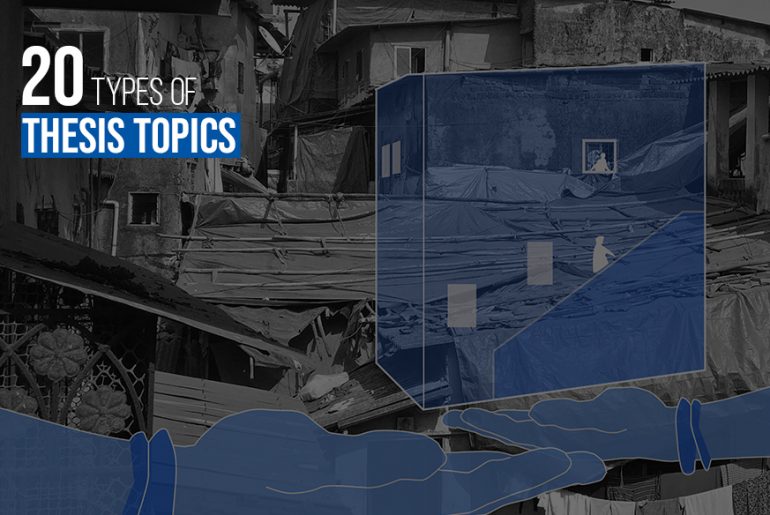
An architectural thesis is perhaps the most confusing for a student because of the range of typologies of buildings that exist. It also seems intimidating to pick your site program and do all the groundwork on your own. While choosing an architectural thesis topic, it is best to pick something that aligns with your passion and interest as well as one that is feasible. Out of the large range of options, here are 20 architectural thesis topics .
1. Slum Redevelopment (Urban architecture)
Slums are one of the rising problems in cities where overcrowding is pertinent. To account for this problem would be one of great value to the city as well as the inhabitants of the slum. It provides them with better sanitation and well-being and satisfies their needs.

2. Maggie Center (Healthcare architecture)
This particular typology of buildings was coined by a cancer patient, Margaret Keswick Jencks, who believed that cancer-treatment centres’ environment could largely improve their health and wellbeing by better design. This led a large number of starchitects to participate and build renowned maggie centres.

3. Urban Sprawl Redesign (Urban design)
The widening of city boundaries to accommodate migrants and overcrowding of cities is very common as of late. To design for the constant urban sprawl would make the city life more convenient and efficient for all its users.
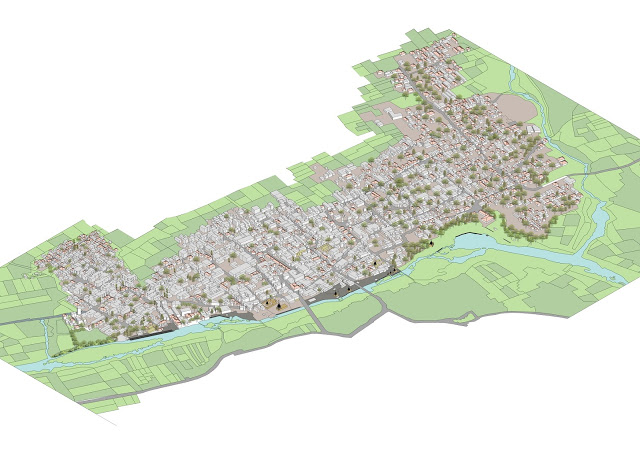
4. Redesigning Spaces Under Elevated Roads and Metros (Urban infrastructure)
A lot of space tends to become dead space under metros or elevated roads. To use these spaces more efficiently and engage them with the public would make it an exciting thesis topic.

5. Urban Parks (Urban landscape)
Urban parks are not only green hubs for the city, which promotes the well-being of the city on a larger level, but they also act as great places for the congregation and bring a community together.

6. Reusing Abandoned Buildings (Adaptive reuse)
All buildings after a point become outdated and old but, what about the current old and abandoned buildings? The best way to respond to these is not by demolishing them; given the amount of effort it takes to do so, but to enhance them by restoring and changing the building to current times.

7. Farming in Cities (Green urban spaces)
With climate change and population on the rise, there is statistical proof that one needs to start providing farming in cities as there is not sufficient fertile land to provide for all. Therefore, this makes a great thesis topic for students to explore.

8. Jails (Civil architecture)
To humanize the function of jails, to make it a place of change and rehabilitation, and break from the stereotypical way of looking at jails. A space that will help society look at prisoners as more than monsters that harm, and as fellow humans that are there to change for everyone’s betterment.

9. Police Academies (Civil architecture)
Academies that train people to be authoritative and protective require spaces for training mentally and physically; focussing on the complexity of the academy and focussing on the user to enhance their experience would work in everyone’s favour.

10. High Court (Civil architecture)
Courtrooms are more often than not looked at as spaces that people fear, given the longevity of court cases. It can be a strenuous space; therefore, understanding the user groups’ state of mind and the problems faced can be solved using good design.

11. Disaster-resilient structures (Disaster-relief architecture)
Natural disasters are inevitable. Disaster-resilient structures are build suitably for the natural disasters of the region while also incorporating design into it, keeping in mind the climatic nature of the location.

12. Biophilic design (Nature-inspired architecture)
As humans, we have an innate love for nature, and the struggle between integrating nature and architecture is what biophilic design aims towards. To pick a topic where one would see minimal use of natural elements and incorporate biophilic design with it would be very beneficial.

13. Metro stations and Bus terminals (Transportation spaces)
Bus terminals and metro stations are highly functional spaces that often get crowded; and to account for the crowd and the problems that come with it, plus elevate the experience of waiting or moving, would contribute to making it a good thesis topic.

14. Airport design (Transportation spaces)
Airport designing is not very uncommon; however, it is a rather complex program to crack; thereby, choosing this topic provides you with the opportunity to make this space hassle-free and work out the most efficient way to make this conducive for all types of users.

15. Sports Complex (Community architecture)
If your passion lies in sports, this is a go-to option. Each sport is played differently, different materials are used, and the nature of the sport and its audience is rather complicated. However, to combine this and make it a cohesive environment for all kinds of users would make a good thesis topic.

16. Stadium (Community architecture)
Unlike a sports complex, one could also pick one sport and look at the finer details, create the setting, and experience for it; by designing it to curate a nice experience for the players, the public, and the management.

17. Waste-recycling center (Waste management)
Reducing waste is one of the most fundamental things we must do as humans. Spaces where recycling happens must be designed consciously. Just like any other space, it has been given importance over the years, and this would make a good thesis topic to provide the community with.

18. Crematorium (Public architecture)
Cremation of a loved one or anyone for that matter is always a rather painful process and a range of emotions is involved when it comes to this place. Keeping in mind the different types of people and emotions and making your thesis about this would mean to enhance this experience while still keeping the solemnity of it intact.
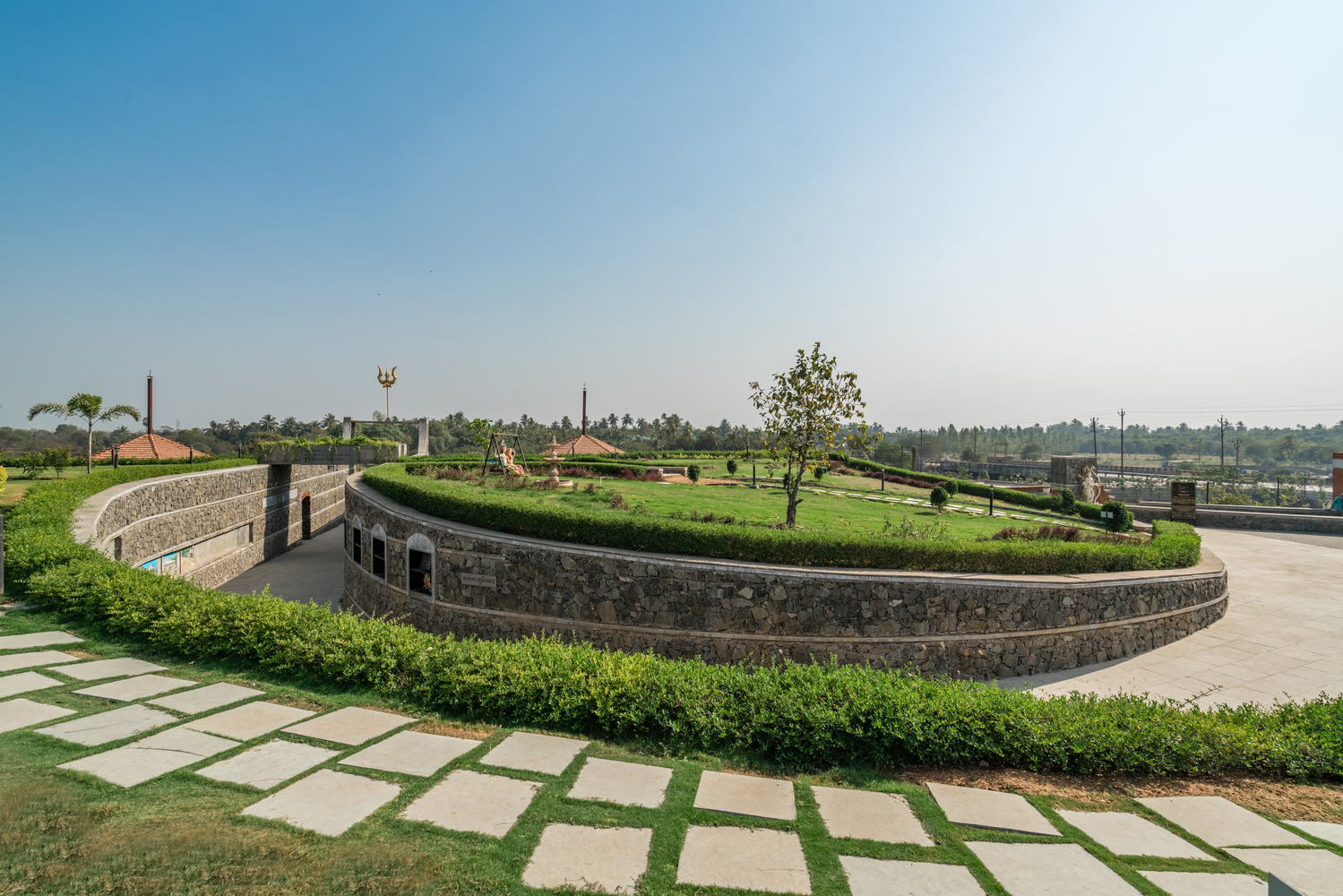
19. Museums (Community architecture)
Museums are spaces of learning, and the world has so much to offer that one could always come up with different typologies of museums and design according to the topic of one’s interest. Some of the examples would be cultural heritage, modern art, museum of senses, and many more.

20. Interpretation center (Community architecture)
An interpretation center is a type of museum located near a site of historical, cultural, or natural relevance that provides information about the place of interest through various mediums.

References:
- 2022. 68 Thesis topics in 5 minutes . [image] Available at: <https://www.youtube.com/watch?v=NczdOK7oe98&ab_channel=BlessedArch> [Accessed 1 March 2022].
- Bdcnetwork.com. 2022. Biophilic design: What is it? Why it matters? And how do we use it? | Building Design + Construction . [online] Available at: <https://www.bdcnetwork.com/blog/biophilic-design-what-it-why-it-matters-and-how-do-we-use-it> [Accessed 1 March 2022].
- RTF | Rethinking The Future. 2022. 20 Thesis topics related to Sustainable Architecture – RTF | Rethinking The Future . [online] Available at: <https://www.re-thinkingthefuture.com/rtf-fresh-perspectives/a1348-20-thesis-topics-related-to-sustainable-architecture/> [Accessed 1 March 2022].
- Wdassociation.org. 2022. A List Of Impressive Thesis Topic Ideas In Architecture . [online] Available at: <https://www.wdassociation.org/a-list-of-impressive-thesis-topic-ideas-in-architecture.aspx> [Accessed 1 March 2022].

Online Course – The Ultimate Architectural Thesis Guide
Apply Now – Online Course
Flora is a student of architecture, with a passion for psychology and philosophy. She loves merging her interests and drawing parallels to solve and understand design problems. As someone that values growth, she uses writing as a medium to share her learning and perspective.

5 Reasons why your design sheets fail to impress

Wangjing SOHO by Zaha Hadid Architects: Dancing Fans
Related posts.

Comparison of American and European Architecture

Flexibility of spaces through furniture

Social impact in architecture education

What is Hyper- Urbanization?

What is Autoconstruction?

Is dependence of smart gadgets getting too much?
- Architectural Community
- Architectural Facts
- RTF Architectural Reviews
- Architectural styles
- City and Architecture
- Fun & Architecture
- History of Architecture
- Design Studio Portfolios
- Designing for typologies
- RTF Design Inspiration
- Architecture News
- Career Advice
- Case Studies
- Construction & Materials
- Covid and Architecture
- Interior Design
- Know Your Architects
- Landscape Architecture
- Materials & Construction
- Product Design
- RTF Fresh Perspectives
- Sustainable Architecture
- Top Architects
- Travel and Architecture
- Rethinking The Future Awards 2022
- RTF Awards 2021 | Results
- GADA 2021 | Results
- RTF Awards 2020 | Results
- ACD Awards 2020 | Results
- GADA 2019 | Results
- ACD Awards 2018 | Results
- GADA 2018 | Results
- RTF Awards 2017 | Results
- RTF Sustainability Awards 2017 | Results
- RTF Sustainability Awards 2016 | Results
- RTF Sustainability Awards 2015 | Results
- RTF Awards 2014 | Results
- RTF Architectural Visualization Competition 2020 – Results
- Architectural Photography Competition 2020 – Results
- Designer’s Days of Quarantine Contest – Results
- Urban Sketching Competition May 2020 – Results
- RTF Essay Writing Competition April 2020 – Results
- Architectural Photography Competition 2019 – Finalists
- The Ultimate Thesis Guide
- Introduction to Landscape Architecture
- Perfect Guide to Architecting Your Career
- How to Design Architecture Portfolio
- How to Design Streets
- Introduction to Urban Design
- Introduction to Product Design
- Complete Guide to Dissertation Writing
- Introduction to Skyscraper Design
- Educational
- Hospitality
- Institutional
- Office Buildings
- Public Building
- Residential
- Sports & Recreation
- Temporary Structure
- Commercial Interior Design
- Corporate Interior Design
- Healthcare Interior Design
- Hospitality Interior Design
- Residential Interior Design
- Sustainability
- Transportation
- Urban Design
- Host your Course with RTF
- Architectural Writing Training Programme | WFH
- Editorial Internship | In-office
- Graphic Design Internship
- Research Internship | WFH
- Research Internship | New Delhi
- RTF | About RTF
- Submit Your Story
Excellent Dissertation Topics in Architecture
Table of contents
- 1 Eco-Friendly Architecture Dissertation Topics
- 2 Architecture Dissertation Topics in Risk Management
- 3 Landscape Architecture Dissertation Topics
- 4 Architecture Dissertation Topics for Urban Planning and Transport
- 5 Interesting Architecture Dissertation Topics
- 6 Research Topics in Modern Design
- 7 Sustainable Architecture Topics
- 8 Trending Topics in Landscape Design
Picking a topic for your architecture dissertation or thesis can be a challenge because whether your final project is successful depends on it. It’s essential that you focus on your field of study to ensure that your arguments are solid and strong. If you pick a topic that you feel comfortable with, writing your final draft will be easier. Still, and if you choose to go for a theme that you’re interested in but have little or zero knowledge of, you should keep in mind that your chances of being 100% outstanding decrease. You also have to select one of the architecture dissertation topics that involve innovation and technology because in the century we’re in, people care a lot about how these two things affect our everyday lives. If you talk about what interests others, you’ll have them hooked.
With this in mind, it’s vital that you stick to your field of study and the topics that are within it. If you’re clueless as to what to talk about, you can always go online and see what other people have to say and what they’re writing about; this could give you a heads-up on what’s to come. If, for example, you study architecture, there are many things that you could address in your final document.
The structures for buildings around the world change with the years and come from many different styles that have very different meanings because of the cultures in which they were created within. This gives you an endless list of possibilities to talk about. There really are no limits when it comes to writing about architecture.
You could discuss the never-ending debate regarding whether old buildings should be preserved or not. All you’ll have to do is provide your idea and opinion based on a series of research that you’ll need to do prior to writing your final draft. A dissertation paper isn’t something that you do in one day; this document requires months and months of hard, tedious work, where you have to read a lot and work on your citation formats and turn in various pieces of work that others will revise and provide feedback for you to adjust and have the cycle repeat itself endless times.
When you’re faced with the task of writing your dissertation for your Ph.D , the most important factor to consider is the topic. If you need inspiration, take a look at the list of topics below, which were popular choices among other students. You can also buy case study online to get an in-depth look at a particular subject. Whichever route you choose, make sure to pick a topic that interests you. If you still have no idea of what to talk about, you can take a look at the list below, which will provide you with a series of topics that other students have been talking about throughout the years, and they are still popular. If you still have no idea of what to talk about, you can take a look at the list below, which will provide you with a series of topics that other students have been talking about throughout the years, and they are still popular.
Eco-Friendly Architecture Dissertation Topics
These architecture dissertation topics are more than just popular, and we have a list of dissertation topics in architecture that will make any task you have on mind easier. At the same time, we will partially be focused on waste management, recycling spaces, and renewable energy, which are all related here. Let’s check the best architecture thesis topics right now.
- Eco-friendly neighborhood development
- Making more urban parks
- Best eco-friendly community garden design
- Old building eco-restoration
- Proper waste management
- Fast and cheap riverfront development
- Making the most advanced SMART village
- Exploring sustainable materials in modern architectural design
- The role of circular economy principles in sustainable architecture
- Creating sustainable buildings for urban environments
- Integrating green spaces in residential architecture for healthier living
- Applying sustainable practices in co-living spaces
- Completely sustainable building idea
- What is regenerative design?
- What is an urban agriculture center?
- How retail spaces use biophilic design principles
- Transformative design for public markets
- Green design in data centers
- Sustainable design practices for healthcare facilities
- The relationship between eco-friendly architecture and mental health
Architecture Dissertation Topics in Risk Management
It is important for all architecture students to have a good understanding of dissertation topics in architecture, as it is an essential field. This list of topics will be a great help when researching, and with the help of professional thesis writers, you can even pay for thesis writing to get the best results. With this assistance, you can be sure to get the best quality dissertation that will impress your peers.
Here we have a list of dissertation topics in architecture that are mandatory to know, and you will probably see a lot of architecture dissertation topics from this group. We can add that it is an essential field of architecture and one all students need to know more about.
- Best practices for making safety better
- How to avoid future water pollution?
- Managing risks of high-end infrastructures
- Limits of computer simulation
- Evaluating public spaces as solutions for urban risk management
- Game-changing strategies for disaster-resilient architecture
- Benefits of risk computer simulations
- Pros of low-cost and high-strength buildings
- Cons of low-cost and high-strength buildings
- New methods for decreasing risk in architecture
- Common risk mistakes new workers make
- Using virtual reality to test the risk
- The influence of technology on architectural heritage preservation
- Architecture’s role in disaster recovery and resilience
- Sustainable transportation methods in urban design
- Earthquake-resistant skyscrapers and construction techniques
Need help with dissertation writing? Get your paper written by a professional writer Get Help Reviews.io 4.9/5
Landscape Architecture Dissertation Topics
You may need to focus on one of these when it comes to proper dissertation writing. Each dissertation topic here is a bit special, and each dissertation topic is something you will need to invest a lot of research in and then make presentable. Let’s see the best topics of this type.
- Processing data on food, water, and energy in the real time
- Benefits of offshore wind energy projects
- Using landscape to make architecture self-sustainable
- Evolution on current energy landscape models
- Food access for locals in large cities
- Shaping the landscape to suit people more
- Making landscape more suitable for people with disabilities
- Cultural influences on landscape architecture
- Integrating green spaces into urban landscapes for environmental benefits
- Using rainwater design in a modern city
- Adaptive reuse of a river park
- Adapting building design to the specific landscape
- The impact of historic preservation on architectural design
- The influence of colonial architecture on urban planning
- The evolution of cafeteria design in workplaces
- Virtual reality in architectural design projects
- The importance of public art in urban planning
Architecture Dissertation Topics for Urban Planning and Transport
The field of architecture we have here is a bit special but more important than ever before. Now you can see the topics that will help you and the ones that can make any process of this kind even better and easier.
- Low-cost homes and low-cost transport
- Should we make more skyscrapers?
- Suburban communities and transporting issues
- Benefits of developing a marine park
- Is transport suitable for modern cities?
- How transport can be improved in multi-million cities
- Incorporating airports in urban planning
- Making train stations more suitable for urban areas
- Managing a million tourists in a modern city
- Hotels that can accommodate more visitors than ever before but are eco-friendly
- The impact of social media on architectural design and trends
- Architecture’s role in community development
- Promoting inclusivity and accessibility through architecture
- Redesigning public transportation stations: challenges and benefits
- Integrating renewable energy in cultural institutions through modern architecture
- Challenges in city planning during urban expansion
- Rethinking residential architecture to support sustainable city growth
- The role of co-living spaces in addressing urban housing needs
Interesting Architecture Dissertation Topics
Here you can see all about housing schemes, appealing ideas, and more that are definitely going to make your writing process easier and better the lack of a better word. Each one of these ideas has been more than just popular. Focus on building design if this is what you like.
- How to know what the right number of restrooms is when building a large, public venue.
- Redefining a city through architecture.
- Maximizing small spaces: all there is to know.
- Building for the family: privacy and closeness.
- Cathedrals: using the new world’s budget to recreate the old world.
- Discuss the difference in the design of houses in cold climates and warm climates.
- Explain some benefits of using technological models in architectural diagrams.
- Provide an accurate description of an architectural model that would be appealing to a religious client.
- Discuss the nature of middle-class architecture and its place in modern society.
- Include elements of famous architects without copying their work.
- The evolution of postmodern architecture in today’s context
- Relevance of classic architecture in modern design practices
- Influence of temple architecture on contemporary religious buildings
- A comparative analysis of architectural styles across different cultures
- Architectural influence in various global contexts
- Getting people to move through energizing architecture.
- Architecture and the family. The need for closeness and privacy
- Cathedrals: Recreating the old world on a new world budget
- The influence of Bauhaus on modern architectural practices
- The connection between architecture and psychology
- Using unconventional materials in contemporary architecture
- The significance of spatial dynamics in architectural design
- Architecture’s role in addressing social justice issues
- The role of architecture in the gig economy
It is no wonder that more and more students are turning to these services for dissertation help . They can provide guidance, expertise and offer support for editing, proofreading, and writing for your best results. With their help, the dissertation can be completed in a timely and efficient manner.
Research Topics in Modern Design
The contemporary architecture will cover the hot topics in the field, and a good place to start would be one of these engaging building design topics:
- Multicultural Architecture in the Urban Landscape
- Trends of Environmental Technology in Residential Structures
- Developing Commercial Projects for IoT
- Evaluating Design in Municipal Structures
- Creative Designs in the Modern Era
- Maximizing Resources and Space with Accessibility
- Adapting architectural education to meet modern challenges
- The impact of interior design on functionality and aesthetics in spaces
- How creating buildings reflects societal changes over time
- The role of digital transformation in modern architectural education
- Minimalist Design in Compact Areas
- Methods of Mitigating Damage from Natural Disaster
- Methods of Pre-fabricated Design
- Features of Portable Housing Units
- Critical regionalism and architectural identity
- The role of phenomenology in designing human-centered architecture
- Digital transformation and architectural possibilities
- The impact of postmodernism on current architectural trends
- The use of semiotics in architectural design and interpretation

Sustainable Architecture Topics
With so much focus on the environment and technology associated with it, there is a significant push to develop green tech with design. Here are some ideas:
- Applications of Hemp in Building Structure
- Retrofitting Inefficiency with Existing Buildings
- Building in Response to Climate Change
- Micro-Construction for the Future
- Creating Self-Sufficient Structures
- Calculating Solar Panel Output with Planning
- Determining Optimal Insulation R-Values
- Principles of Net Zero Design
- The impact of sustainable design on construction practices today
- How sustainable materials contribute to reducing the carbon footprint
- The long-term benefits of sustainable buildings in urban areas
- Enhancing urban life with the incorporation of green spaces
- Reducing A Structure’s Carbon Footprint
- Heating and Cooling Systems with Renewable Energy
- Ethical considerations of sustainability in architectural practices
- Constructing emergency shelters for disaster relief
- The effect of architecture on preserving wildlife habitats
- Reducing carbon footprint in coastal areas through architecture
- Revamping industrial spaces for multiuse purposes
Trending Topics in Landscape Design
Architecture is more about structures. There is the landscape that accompanies it. You must consider many elements of the environment you place your structures. Here are a few topics you can use:
- Planning for Water Scarcity and Droughts
- Maximizing Green Space in Residential Designs
- Managing Flood Zones with Climate Change
- Revitalizing Landscapes
- Reducing Development Risks with Wildlife
- Principles of Urban Agriculture
- Optimizing Drainage for Water Conservation
- Child-Friendly Landscapes
- Retaining Green Cities in Periods of Growth
- Efficient Public Infrastructure
Who said architecture couldn’t be exciting? With these modern architecture dissertation topics, you’re well on your way to getting your proposal approved. A dissertation is a rewarding academic achievement that is quite exhausting, which is why some students buy a dissertation . With much new technology and urban requirements coming into the mix, a degree in architecture is well worth the investment. Don’t be afraid to ask for architecture dissertation help, as we at Papersowl.com are here to assist 24 hours. We cover all aspects of academic writing and can work with a portion of your paper or even do the whole dissertation. So if you’re stuck, reach out to us.
Readers also enjoyed

WHY WAIT? PLACE AN ORDER RIGHT NOW!
Just fill out the form, press the button, and have no worries!
We use cookies to give you the best experience possible. By continuing we’ll assume you board with our cookie policy.

45,000+ students realised their study abroad dream with us. Take the first step today
Here’s your new year gift, one app for all your, study abroad needs, start your journey, track your progress, grow with the community and so much more.

Verification Code
An OTP has been sent to your registered mobile no. Please verify

Thanks for your comment !
Our team will review it before it's shown to our readers.

- Education /
Dissertation Topics in Education

- Updated on
- Jan 24, 2024

A dissertation is an academic piece of writing based on a student’s independent research. Being a student of M.Ed, you are supposed to submit a dissertation based on education. It takes a lot of time to complete a dissertation research project, so choosing a relevant dissertation topic is the first step you take for getting a Master’s Degree . This blog provides you with the best dissertation topics in education.
This Blog Includes:
Introduction, how to structure an education dissertation, how to choose a dissertation topic in education, where to find dissertation topics in education, how to choose the right title for an m.ed dissertation, best m.ed dissertation topics, research dissertation topics in education, dissertation topics in education for m.ed in india, covid-19 education topics research topics, impact of covid-19 on education dissertation topics for 2022, dissertation topics in higher education.
Education as a subject aids in the comprehension of various learning methods and forms of education. You will be required to gain critical knowledge of the issues surrounding education if you pick education as your main topic. You can look into topics like public school education, holistic education, the role of ethnicity, gender, and class on academic achievements, adult education, preschool and primary school education, college and university education, child development, distance learning, politics, and policy in education, teacher education, and curriculum when choosing an education dissertation topic.
Must Read Article: Dissertation Topics in Law for LLM Students
Before starting your dissertation on any topic in the Education sector, it is important to be familiar with the universal structure of writing a dissertation. Here is a basic structure for further reference.
- Title – The title for your M.Ed Dissertation must focus on your research objective.
- Abstract – The abstract part must include a summary of the research problem or objective of the research, the research design and a summary of the results.
- Introduction – The introduction must be included in a precise manner. It should reflect your research in a way that the audience already gets to know what the research is going to include.
- Review of Literature – The Review of Literature Section must include a theoretical rationale of the problem, the importance of the study, and the significance of the results.
- Methodology – The methodology section must include the description of the subjects, research methods used in the data collection and any limitations issues involved.
- Significance/Implications (Results of the Discussion)
- Overview of Chapter (Conclusion)
- Recommendation
- References – This section must include an alphabetical listing of all referenced text used in the M.Ed dissertation
Also Read: Dissertation vs Thesis
If you are confused about choosing a topic for your dissertation, here are some simple methods that might simplify what you can put your focus on while writing your dissertation.
Choose a Relevant Topic
It is extremely important to select a relevant topic for the dissertation as it contributes to your future. To obtain a masters degree in education, you need to find interesting topics for a dissertation. The topic must hold your interest and include the potential to provide you with a significant amount of content.
Don’t Be Vague
A dissertation is supposed to be a lengthy piece of research work. So the dissertation must be broad enough to explore the topic. It must follow a clear structure to contribute to the argumentation you are going to include in the dissertation.
Research Questions
Do not select narrow questions which are supposed to be answered with a Yes or No. Choose questions that provide you with relevant answers such as
- Can parent’s expectations affect a student’s life?
- Does giving students homework really contribute to their academic improvement?
Ask for advice
Students who are writing a dissertation are always provided with guidance. Teachers or supervisors are assigned to guide students throughout the duration of the dissertation. So remember to ask for feedback or a piece of advice. Your supervisor will have years of academic experience, so their recommendation will only add to your research.
Before choosing a topic, make sure you research thoroughly about the chosen topic. Be aware of the content provided by the topic. You may not get enough information to complete the dissertation, so make sure you find and get enough sources to expand and support your arguments.
Also Read: All you need to know about M.Ed
Finding a dissertation topic can be very challenging. When you are looking for an M.Ed Topic, you must be clear with your thoughts. Mentioned below are some sources from where you can come up with a Dissertation Topic in Education:
- Try to study the most recent published piece of work to find out what kind of issues are open to further exploration and discussion
- Thoroughly check out the work examples done by other scholars.
- Research the recently published work regarding your subject that is education, and find out what is prevalent in today’s time.
Also Read: What do you need to know about a PhD?
A good title is very important while writing a dissertation. So when you are done with choosing the topic, you must look forward to its relevance. Make sure your title does justice to your research. The title itself should communicate the topic or objective of your dissertation
In these crucial times of the pandemic, education is one of the things that has suffered the most. Educational institutes have been shut for more than 2 years now. All we get to do is online now. Be it work or study. So the dissertation topic in education in the view of a pandemic can be relevant to choose from. Mentioned below are the best topics you may want to choose:
Topic 1: Maintaining social distancing in schools
Topic 2: Increased screen time or Online Education
Topic 3: Impact of COVID-19 on students
Topic 4: Impact of Covid-19 on teachers
Topic 5: How did the Coronavirus pandemic reshape education?
Topic 6: The impact of Coronavirus on international students
Topic 7: Classroom evaluation in the pandemic
Also Read: PhD (Doctor of Philosophy)
To start your dissertation you can choose from a wide array of topics such as:
- Impact of the Internet on the social life of students.
- Educational assessment of students using virtual reality technologies
- Interaction between students of different ethnicities based on a differentiated approach
- Harassment prevention of younger students in school
- Illegal Behaviour of students in high school
- Importance of self-studying for students
- Development of Time management for students
- Personal development of teachers in educational institutions
- The role of sustainability in educational institutions
- The rising cost of academic education
Also Read: MPhil in English Literature
In order to write an advanced dissertation on any topic related to Education here are some examples:
- How does the education system address the problem of teachers shortage in private schools?
- A case study of gender issues in Indian educational institutes
- A critical analysis of the teaching method used in schools
- Analyze the depression phase of students for admission in the medical field
- How does the government address the problem of rising fees in private schools?
Also Read: How to get a Bachelor’s of Education degree?
Students who are pursuing an M.Ed degree must be very careful while writing a dissertation as it contributes a lot to their skills and it is the only way they’ll be able to obtain a Masters’s Degree. In choosing the right topic for the M.Ed dissertation submission on time, all the above-mentioned aspects must be given equal importance. This blog has included the best dissertation topic in education you can choose while writing a dissertation.
Coronavirus’s Effects on Education
The goal of this study is to look at the effects of Coronavirus.
Online educational programs to educate students during COVID-19
Many students’ education has been disrupted as a result of the global Coronavirus epidemic and the lockdown, which has affected students at all levels of education, including school, college, and university. This research will look at the many platforms, schools, institutions, and universities that provide online programs. It will go through how students may get access to these courses and how they can profit from them.
Impact of COVID-19 on educational institutes
This research will look at the effects of COVID-19 on educational institutions. What efforts can be made to guarantee that kids and teachers are in a safe environment?
Role of teachers and professors during the Coronavirus Pandemic.
The future of education in the aftermath of the Coronavirus epidemic.
This study will collect information on current educational practices in the event of a pandemic and estimate the future of education in the wake of the Coronavirus.
What is the impact of the Coronavirus epidemic on education?
Coronavirus has served as a sharp reminder of how human schools are. Students have embraced online learning but are eager to return to her classroom. I don’t think it’s possible to tell whether a student is truly interested and understands the material while they’re learning it online. The goal of this study is to determine how the coronavirus epidemic is affecting schooling.
What steps are institutions taking in reaction to Coronavirus?
Universities are increasingly deciding to utilise social distancing methods, such as switching to more online delivery of courses and allowing employees to work from home. There is currently no government advice to institutions on this subject. As a result, each operational choice made by different institutions must be based on their own local conditions, which differ for a variety of reasons. This study will look at some of the responses to the epidemic that we’ve seen across colleges.
Coronavirus’s influence on overseas students and colleges’ responses
This study will look into the effects of Coronavirus on overseas students and how colleges are responding.
The formal education provided to college, undergraduate, and postgraduate students is referred to as higher education or college/university education. The following are some intriguing higher education dissertation topics.
- The origins of traditional university education’s cultural roots
- Students from non-core subjects might use interactive strategies to create enthusiasm for learning foreign languages.
- In the university’s digital educational environment, conceptual underpinnings for building a customised educational path for students.
- Formation of the student’s civic role in the university’s instructional activities
- Students’ self-education motivation is developed through the university’s scientific library.
- Students at legal faculties might improve their self-education motivation by participating in social events.
- Using time management approaches, pupils can develop self-education motivation.
An M.Ed dissertation must include over 60,000 words and should not exceed the limit of 80,000 words.
You must have scored a minimum Percentage of 50% to 60% in B.Ed and the admission varies for different universities. You may be required to take an entrance exam.
It takes around 2 Years to complete an M.Ed Degree.
Related Articles
If you are planning to pursue further studies that include a dissertation (or not), our experts at Leverage Edu are just one click away to help you out through the entire application process to get to your dream college. You can take the help of our service at any time by calling us at 1800 572 000
Damanpreet Kaur Vohra
Daman is an author with profound expertise in writing engaging and informative content focused on EdTech and Study Abroad. With a keen understanding of these domains, Daman excels at creating complex concepts into accessible, reader-friendly material. With a proven track record of insightful articles, Daman stands as a reliable source for providing content for EdTech and Study Abroad.
Leave a Reply Cancel reply
Save my name, email, and website in this browser for the next time I comment.
Contact no. *
Help needed for thesis writing .

Leaving already?
8 Universities with higher ROI than IITs and IIMs
Grab this one-time opportunity to download this ebook
Connect With Us
45,000+ students realised their study abroad dream with us. take the first step today..

Resend OTP in

Need help with?
Study abroad.
UK, Canada, US & More
IELTS, GRE, GMAT & More
Scholarship, Loans & Forex
Country Preference
New Zealand
Which English test are you planning to take?
Which academic test are you planning to take.
Not Sure yet
When are you planning to take the exam?
Already booked my exam slot
Within 2 Months
Want to learn about the test
Which Degree do you wish to pursue?
When do you want to start studying abroad.
September 2024
January 2025
What is your budget to study abroad?

How would you describe this article ?
Please rate this article
We would like to hear more.
Research guidance, Research Journals, Top Universities

Format of synopsis for PhD | Download Sample.
Guidelines for writing ph. d synopsis..
FORMAT OF SYNOPSIS (MS/MPHIL & PHD). Given below is an outline for synopsis writing. It provides guidelines for organization and presentation of research.
INTRODUCTION OF 2-3 PAGES
- Identify a real world problem
- Describe the undesirable symptoms
- Identify the knowledge gap that needs to be filled in order to help solve the problem
- Support your discussion with solid peer-reviewed references
LITERATURE REVIEW
- Create an Outline or “mindmap” of the key theories and concepts.
- Dig deep into the “ Peer-reviewed” literature for each theory and concept and create an annotated bibliography and literature map
- Write literature review
- Map out the research gap
- Identify the “type(s)” of question that need to be answer to fulfill the purpose
- Develop the main research question and sub-questions
- Develop hypotheses as appropriate
- Identify and diagram the key variables in the research question
- Identify and diagram the key relationships between the variables
- Identify and diagram the key context factors
- Describe the framework
- Research Process
- Based on the research questions, the overall approach (Data Collection, Analysis methods, Validity and Reliability test process)
POSSIBLE OUTCOME AND LIMITATIONS OF YOUR STUDY
- Identify the larger application(s) and meaning(s) of the findings.
- Identify the limitations associated with the findings and conclusion.
BIBLIOGRAPHY OR REFERENCES
Most preferable format:
Font: Times New Roman
Title of the thesis: 18
Main Heading: 14 Bold
Sub Heading: 12 Bold
Spacing 1.5
Reference style: APA/IEEE/Harvard
Share this:
Leave a comment cancel reply.
Save my name, email, and website in this browser for the next time I comment.
Notify me of follow-up comments by email.
Notify me of new posts by email.
Best Civil Engineering Thesis Topics: A List of Unique Ideas
by Bastis Consultores | Aug 2, 2021 | Thesis Development | 27 comments

For starters, writing a civil engineering thesis can be a difficult task. Undoubtedly, it usually occupies several months of your life and demands that you spend countless hours in the library doing a unique research. In this regard, one way to facilitate its realization is to choose a thesis topic that really interests you.
First of all, the original ideas are always good, but you need to select a topic that you can work on for several months.
Secondly, the range of thesis topics in civil engineering is very wide. Therefore, the possibilities and diversity of civil engineering thesis topics and projects to choose from should be more than enough. However, after the selection, make your topic go through the usual approval of your teachers.
Topics for you to do your thesis in Civil Engineering
After selection, have your topic go through the usual approval of your teachers. Here are some of the main areas for you to choose your civil engineering thesis topic. Undoubtedly, these general areas will invite you to investigate further to present a more specific title.
Hydraulic engineering
Pavement engineering
Water Services
Structural and Civil Engineering Informatics
Construction engineering and management
Port and coastal engineering
Water treatment
Subtopics to consider
Similarly, these civil engineering degrees and thesis topics are in turn divided into several subtopics. Below are some of the most important subtopics for theses in civil engineering:
Mapping and risk classification
Bridge hydraulics
Flood mapping in urban environments
Flood Warning
River-level causeways and debris
Sustainable urban drainage systems
Hydraulics of dam spillways
River catchment works
Minimization of environmental impact
Energy dissipation structures
Climate change and land use
Sedimentation management in reservoirs
Erosion protection
Hydrodynamics of estuaries and lakes and salinity
Content of fly ash and its multiple uses
Design and analysis of nuclear power plants
Design and construction of retaining walls
List of thesis topics on General Civil Engineering
Below, we detail some thesis topics for General Civil Engineering:
Dynamic Inversion Study of Soil Mechanical Parameters
Study of fiberglass-reinforced compression elements filled with concrete
Characteristics of the acoustic emission of limestone after high temperatures
Research on the spatial analysis of stresses of a large underground project
Soap-free emulsion polymerization for sealing new buildings
Earthquake damage model on a rectangular tubular column filled with concrete
Analysis of the seismic behavior of a transmission tower system
Research on the system of steel stepped beams in RC slabs
Elastoplastic analysis of a large cross-linked shell structure under multisupport excitations
Study of soil fissures generated by liquefaction after an earthquake
List of bridge engineering thesis topics
Bridge engineering is a topic that has been present since the early twentieth century and without a doubt, it continues to be an area in which more and more innovation is made:
Effects of Truck Impacts on Bridge Stacks
Evaluation of the performance of existing bridges under the dynamic effects of vehicles
Thermal experiment of a reinforced approach pavement for a semi-integral bridge without joints
Design and propagation analysis of a new drop-down bridge section
Load transfer mechanism of a steel-concrete joint
Load transfer mechanism of a hybrid beam cable-stayed bridge
Long-term stress variation in a large, high-light continuous rigid structure bridge
List of Structural Engineering Thesis Topics
You can also consider topics related to structural engineering:
Hybrid simulations: Theory and applications
Engineered wood in cold climates
Mechanical properties and engineering applications of modern wood
Hybrid structural systems and innovative design method
Static analysis of an integrated steel structure building with wind turbines
Integrated houses of light steel structure
High Durability Low Carbon Housing Structure System
Integral Structure of Temporary Light Steel Buildings
Behavior of Beams Composed of Recycled Concrete Reinforced with Steel
Analysis of the joints between beams and pillars of steel structures
Design of a masonry basement of reinforced concrete blocks
Non-linear analysis of a new 3D stepped shear wall structure
Advances in civil infrastructure engineering
Mechanical behavior of an irregular Kiewitt dome structure
Study of the Shear Distribution Coefficient under Horizontal Force
Analysis of the nonlinear buckling of a suspended dome structure with large elliptical paraboloid
List of thesis topics on concrete technology
In addition to the areas that we have already mentioned, concrete technology is an area that undoubtedly presents greater and greater innovation:
Width of cracks in partially prestressed concrete beams
Thermal deformation of cement and asphalt mortar under repetitive heating and cooling
Compatibility between naphthalene-based superplasticizer and low-alkaline cement
Standard deviation of compressive strength of recycled concrete
Bending behavior of a fiber-reinforced mortar with low fiber content
Experimental study of carbonation in the concrete of hollow microspheres with thermal insulation
Mechanical properties of fibre-reinforced hybrid ferrocement
Study of the adhesion properties of textile-reinforced concrete
Bending behaviour of cold-rolled deformed steel bars on reinforced concrete slabs
Investigation of the durability of hollow microsphere concrete with thermal insulation
Rheological properties of room temperature curing epoxy adhesive
Behavior of modified asphalt pavement in steel roof
Analysis of volumetric deformation and creep properties of high-performance concrete C60
Analysis of the creep properties of high-performance concrete C60
Effects of mineral additives and superplasticizer on the control of the heat of hydration of cementitious materials
Application of intensification approaches in recycled aggregate
Modeling analysis of crack repair structures for asphalt concrete pavements
Analysis of the performance of the concrete used for the ballast-free track base plate
List of geotechnical engineering thesis topics
Here are some topics you can explore in the area of geotechnical engineering:
Finite element analysis of the vertical bearing capacity of individual piles
Study of the distribution characteristics of sandstone pores
Experimental study of the dynamic elastic properties of sediments carrying gas hydrates
Selection analysis of the enclosure structure for a deep foundation pit
Simplified models for assessing the period of site characteristics
Investigation of the mechanical character of the anchorage of a fully injected bolt
Creep properties of cross-linked red clay in staggered load creep tests
Application of BP neural networks in predicting damage from multilayer media penetration and blasting
Tests on vibrating table on structure reinforced with iron hook
List of transport, road and rail engineering thesis topics
Undoubtedly, transport, road and railway engineering is of wide interest to civil engineers:
Influence of the size of the cracks of the old concrete pavement on the tension of the asphalt layer
Research and application of hot recycled asphalt mixing
Analysis of the thermal stress of asphalt pavement on a poor concrete base
Assessment of the driver’s mental strain in snow pavement conditions
Evaluation of the low-temperature performance of asphalt mixtures with an analog experiment
Research on the purification capacity of porous asphalt pavement
Research and discussion on the application of artificial pile technology for viaducts
Evaluation of the influence of the environment on the vibrations of the meter
Influence of damaged pavement on the saturated road and the average speed of circulation of a stretch of urban road
List of Water Supply and Drainage Engineering Thesis Topics
In the same way, the engineering of water supply and drainage is an issue that is taking more and more boom:
Development of a new recovery material through solidification/stabilization of hazardous waste
Optimization and characteristics of copper pickling wastewater treatment
Enzymatic saccharification of pretreated cellulose from lignocellulosic biomass: Situation and prospects
Experiments on the evaporation of groundwater with high SD content in an arid zone
Reduction of excess sludge in wastewater treatment
Study on water saving and “zero trend” measures in a nylon chemical company
List of geological engineering thesis topics
Likewise, geological engineering is a very broad and very interesting topic:
Research on the detection of multi-step leaks in the dam by the temperature in the holes
Analysis of the stability of a rock slope with an overinclinated stratoid structure
Study on the reliability of the loess cutting slope
Characteristics of seismic geological disasters
Experimental study of the shear strength of unsaturated silty clay
Properties of emulsion and recycling of asphalt pavement recovered at room temperature
Here are other unique ideas you can consider
Below, you can explore other innovative titles that you will surely be interested in:
Air pollution and its control
How can large metropolitan areas be reformed or restructured to help control, for example, the rising rate of air pollution?
Disaster management
How do advances in civil engineering help improve disaster management in high-risk areas?
Innovations in geotechnical applications
How do these innovations pave the way for a tremendous change in the way we look at civil engineering?
Uses of flexible flooring
This engineering technology is being used in places where geology plays a more important role in terms of unstable soil. What other uses can it have?
Advances in pavement design
What advances over the past two decades have had the greatest effect on how cities are redeveloped?
Disaster recovery
How have recent events related to disaster response time affected?
Removal of arsenic from groundwater
What are the most effective methods of removing arsenic from city groundwater? What are the challenges in rural areas?
Bamboo as a building material
Recently progress has been made in the use of different and natural materials for construction. However, what place does bamboo occupy in all this?
Demolition of a building
Analyze the effectiveness of the destruction and demolition of large urban structures and their effect on traffic, safety, etc.
Prevention of breakdowns on the roads
How have highway collapses and catastrophes affected design improvement?
Groundwater pollution
More effective technologies to curb the increase in groundwater pollution.
Improved power quality
How can the design of power grids help improve the speed, supply and power of electricity to homes?
Solar grid development
If solar technology has improved to the point of being cheap for use in cities, then why haven’t cities developed more efficient grids?
Diversion of rainwater
What technologies can be used to divert rainwater to reservoirs to curb the effects of droughts?
Low-cost rural housing
How can improvements in water diversion, electricity networks, etc. for example reduce the costs associated with rural housing?
In conclusion, if you want to choose a topic, make sure that it has not been researched before by the experts. In addition, the subject itself must be quite crucial and demanding to be applied in the field. Finally, we want to highlight that we have an internal team of very well qualified professionals with very advanced academic degrees, master’s degrees and doctorates. Consequently, they will give your work all the attention it needs and guide you in all civil engineering topics for thesis and many more.
Our specialists wait for you to contact them through the quote form or direct chat. We also have confidential communication channels such as WhatsApp and Messenger. And if you want to be aware of our innovative services and the different advantages of hiring us, follow us on Facebook, Instagram or Twitter.
If this article was to your liking, do not forget to share it on your social networks.
You may also be interested in: Likert scale
Source: https://civildigital.com/

The best civil engineering thesis topics: a list of unique ideas. Photo: Unsplash. Credits: Vasily Koloda @napr0tiv
Submit a Comment Cancel reply
Your email address will not be published. Required fields are marked *
Save my name, email, and website in this browser for the next time I comment.
Categories:
The most seen, copy short link.
- Write my thesis
- Thesis writers
- Buy thesis papers
- Bachelor thesis
- Master's thesis
- Thesis editing services
- Thesis proofreading services
- Buy a thesis online
- Write my dissertation
- Dissertation proposal help
- Pay for dissertation
- Custom dissertation
- Dissertation help online
- Buy dissertation online
- Cheap dissertation
- Dissertation editing services
- Write my research paper
- Buy research paper online
- Pay for research paper
- Research paper help
- Order research paper
- Custom research paper
- Cheap research paper
- Research papers for sale
- Thesis subjects
- How It Works
Best 170 Architecture Thesis Topics For All Students

Architecture thesis topics may be difficult to find because there are so many subjects and possible topics. However, good thesis topics for architecture are the ones that you have a personal interest in. Before picking architecture thesis topics, you also need to ask yourself if the topic is significant or realistically doable.
Choosing Thesis Topics For Architecture
Architecture thesis projects topics, master of architecture thesis topics, industrial architecture thesis topics, institutional architecture thesis topics, sustainable architecture thesis topics.
What is the best way to choose dissertation topics? This guide will highlight how to pick interesting architectural thesis topics. Here are some factors to consider when searching for architecture thesis project ideas :
Pick a Topic That Interests You
While picking creative architecture thesis topics, you need to opt for a topic that you are personally interested in. You can easily get bored with your undergraduate architecture thesis projects, that is why you need something that you are passionate about. It will help you to stay motivated and inspired to create a unique project.
Set a Small Scope
It can be tempting to pick dissertation topics in architecture that are too expansive. This reduces the delivery time. It is safer to start with a simple version of the topic and includes some complexity later if necessary.
Find Architecture Thesis Topics That Reflect Your Skills
Everyone has unique skill sets that they have developed over time. There is no single person who is perfect at everything. When you know your technical and creative capabilities, you will be able to pick thesis topics in architecture that employs your expertise.
Can You Find Enough Research On The Topic?
Unusual architectural thesis topics require lots of research and analysis before starting. Therefore, it is essential to pick an area of study with a substantial amount of work already done. It will help you to easily analyze, compare, and draw conclusions.
Balance It Between Art And Science
While searching for architecture dissertation topics, students often dig themselves a grave. They tend to view the project as a culmination of a long program rooted deep in art and theory. You need to pick a topic that balances art and science. It shouldn’t be too abstract, so your teacher will know that you understand the issues raised.
Don’t Forget To Tie It To Your Plans For The Future
Your architecture thesis topics should be aligned with your plans. It should reflect your experience or interest in a specialized subject. It will play an important role as a part of your portfolio.
Pick Architecture Thesis Topics That Solve A Real Problem
Your thesis topics architecture ideas shouldn’t just be theoretical, they should also solve a real-world problem. The world struggles with several issues, such as population growth, climate change, and a lack of proper distribution of resources. So, find a topic that can solve a socio-environmental problem using design intervention.
- Creation of affordable housing
- Development waterfront property
- Airport functioning
- Heritage museums
- Skyscraper design
- Cinema and theatre architecture
- Suburban homes for multi-families
- Multimedia film city
- Gaming and Animation studio
- Aquarium-Aqua display and design
- Marine park design
- Lightning excellence center
- MTRS study and station
- Modern art museum
- Convention center
- Automobile training center
- Archaeological survey institute
- Luxury beach-facing apartments
- The bus terminal with a commercial complex
- School of art & design
- Cruise terminal design
- Bio-climatic buildings
- Media center
- Cricket stadium display
- Disaster management institute
- Resort design
- Polo retreat
- Television and film institute
- The transit system as well as the possible improvements
- Educational Institute for all rural children
- A local heritage site
- The lighting system in the Egyptian Pyramids
- Film city studios, gaming area as well its structure
- Underwater restaurants in different parts of the globe for light, electricity, and sanitation.
- The transformation node found at the Lancaster
- The heat/cooling systems in beach huts
- Checking pressure and oxygen levels for building tourists spots
- Fashion Fiesta Paris
- The Golden Gate and architecture
- An archaeologist’s point of view of China from a survey of China
- WHO’s headquarters and renovation
- The ideal environment for a Rehab
- Russian fairytale-style homes and huts
- A clear insight into the auto industry
- Installing swimming pools in a mall
- Training centers for adults in Texas
- Buildings for religious purposes
- Comparing contemporary vs. traditional housing
- Deconstructing a typical school to make room for collaboration and creativity
- Apartments for couples
- Multifamily suburban homes
- The power of air: leaving closed windows for good
- Semidetached and row houses
- Staying on the budget while creating an architectural masterpiece
- Single-family suburban homes
- Hotels and residence
- Single-family country homes
- Developing healthy living spots in third-world countries
- Design of Ruled Surfaces.
- A method to design the kinetic planar surface using mathematical tessellation techniques.
- Waterfront development of an exhibition center
- Bio-inspired design for adaptable structures
- Construction of time conception
- A critical view of architecture – is it sustainable?
- Analytical studies of design potentials in architecture
- Determination of the concept of place in the built environment’s reproduction process
- Aqua display/Research Center
- Forest Research/Training Institute
- Archaeological Survey of Canada – Research and Training Institute
- Luxury Sea-front Studios at Ottawa
- Digital Morphogenesis as well as Its Implementation
- Bio-climatic Tower
- Mass rapid transit system study and station
- Designing organic structures to withstand time
- Showing culture in structures
- Maximizing size in miniature apartments
- Architectural trends at most transportation hubs
- Redefining a city with architecture
- Renovating century-old structures without losing the culture
- Outdoor architecture: creating getaways in small backyards.
A master of architecture qualification provides students with the relevant knowledge, skills, and values needed to enter the architecture sector and pursue opportunities and careers in this profession for master thesis help . It focuses on developing the ability to adapt to change in the diverse and critical world we live in. students are allowed to create a speculative and reflective relationship to their work.
- The introduction of biotechnology in architecture design for adaptable structures.
- An analytical assessment of mathematical organization methods in active flat surface plans.
- The consideration of soil and terrain conditions to determine adequate story building locations.
- A conceptual method for the outline and fabrication of cultural centers and foundations
- Finding the importance of a town or county’s various buildings and structures.
- A critical analysis of the architectural techniques used to construct the lighting within the ancient pyramids of Giza.
- An evaluation of the restaurants near the coastline in various areas of the country with important consideration on plumbing, air supply, and lighting.
- An analysis of China’s Great Wall with consideration of the structure’s historical significance.
- Understanding the impact of certain architectural codes and protocols on the environment.
- The possibility to achieve inexpensive house construction plans in first-world countries.
- Why do the majority of third-world countries have substandard housing structures?
- A case study on the significance of all learners of architecture in the profession.
- An analysis of the primary conditions that affect buildings in places that are susceptible to earthquakes.
- Building methods and consideration for constructions with the ability to endure natural disasters.
- A detailed report of the Twin Towers and the popularity of skyscraper construction.
- The significance of applied science in defining modern housing from traditional examples.
- Using records in architecture to understand the history of the profession.
- A critical analysis of architectural photography.
- The evaluation of cost considerations in architectural specifications and estimations.
- What motivates different architectural drawings and concepts.
- Case studies on sustainable modern design structures.
- The importance of digital mapping and concepts in architecture.
- Methods of limiting energy loss.
Industrial architecture is a branch of architecture that is used for the design of industrial buildings. These buildings need to be designed with consideration of their main purpose, which is to process raw materials. Their designs need to prioritize safety and optimal function over aesthetics and exterior appeal.
With the increased evolution taking place in technology today, industrial buildings and their designs need to adapt and keep up. This is why it calls for more research and consideration since industrial buildings are a need for modern society.
- Waterfront development – Beach convention and exhibition centers.
- Design of ruled surfaces.
- Construction of time conception in the architectural realm.
- A critical view of sustainable architecture.
- Determination of Place concept in the reproduction process of the built environment.
- Analytical study of the design potentials in kinetic architecture.
- Is deconstructive architecture useful?
- How did brutalism and contemporary architectures influence the world?
- Current trends in parametric architecture.
- How will traditional industrial structures be made more environmentally friendly and sustainable?
- Industrial architecture’s evolution.
- A critical analysis of the Dockland building, Germany.
- What purpose does industrial architecture play in creating a safe environment?
- Where do the professions of car construction and manufacturing come together?
- Industrial architecture during the industrial revolution.
- Evaluation of daylight in office buildings.
- Analysis of different lifestyle interactions.
- The purpose of reinforced concrete skeleton systems and earthquake’s effect on them.
- The future of architecture with the consideration of space exploration.
- The purpose of environmental science and social anthropology in architecture.
- Making architecture design studios relevant in the technological era.
- Extra skills are necessary for working on complex architectural projects.
- How collaboration is helping architectures achieve complex structural needs.
This is the branch of architecture that deals with environmental, social, and economic factors. This profession is based on various rules and traditions that were passed down for centuries. It grants architects the ability to find new ways to innovate the architectural industry.
Over time, the design for buildings all over the world evolves and is influenced by different cultures and styles. This can give the structure of the building different meanings and provides various opportunities to discuss its design and reason to be built.
- Theme parks and attractions
- Religious buildings
- Auditoriums
- Sport facilities
- Art galleries
- Cultural centers and foundations
- School and universities
- Bars and discotheques
- Shopping malls
- Theaters and cinemas
- Restaurants
- Transportation thesis on airports
- Train stations
- Urban transport
- Promenades and streets
- Urban parks
- Stores and showrooms
- Peripheral parks
- Urban monuments and land art
Sustainable architecture is the use of various plans and techniques to withstand the negative effect on the environment of modern man-made structures. Architects would take all aspects of the project, from landscape to water drainage, and determine the best way for the building to function with the least impact on the environment. These buildings and designs need to ensure that they are functional, appealing to the eye, and have as little carbon footprint as possible.
- Neighborhood development
- Community garden concepts
- Waste recycling facilities
- Heritage building restoration
- Rehabilitation housing
- Riverfront development
- SMART village
- Net-Zero energy building
- Bermed structure
- Regenerative design
- Urban Agriculture center
- Revitalizing abandoned mills and processing buildings
- Eco-tourism facilities
- Revival of an old building
- Repurpose a building
- Redevelopment of a slum
- Vertical farm
- Wetland restoration
- Energy efficiency in buildings
- How the location of the building is necessary for sustainability
Picking one of the topics above may help you get a head start on your paper. However, if you still need dissertation writing help, you can find professionals to help you with fresh ideas to work on.
Are you stuck with writing your thesis? Just enter promo “ mythesis ” – that’s all you need to get a 20% discount for any architecture writing assignment you might have!
Leave a Reply Cancel reply
Blog The Education Hub
https://educationhub.blog.gov.uk/2024/08/20/gcse-results-day-2024-number-grading-system/
GCSE results day 2024: Everything you need to know including the number grading system

Thousands of students across the country will soon be finding out their GCSE results and thinking about the next steps in their education.
Here we explain everything you need to know about the big day, from when results day is, to the current 9-1 grading scale, to what your options are if your results aren’t what you’re expecting.
When is GCSE results day 2024?
GCSE results day will be taking place on Thursday the 22 August.
The results will be made available to schools on Wednesday and available to pick up from your school by 8am on Thursday morning.
Schools will issue their own instructions on how and when to collect your results.
When did we change to a number grading scale?
The shift to the numerical grading system was introduced in England in 2017 firstly in English language, English literature, and maths.
By 2020 all subjects were shifted to number grades. This means anyone with GCSE results from 2017-2020 will have a combination of both letters and numbers.
The numerical grading system was to signal more challenging GCSEs and to better differentiate between students’ abilities - particularly at higher grades between the A *-C grades. There only used to be 4 grades between A* and C, now with the numerical grading scale there are 6.
What do the number grades mean?
The grades are ranked from 1, the lowest, to 9, the highest.
The grades don’t exactly translate, but the two grading scales meet at three points as illustrated below.

The bottom of grade 7 is aligned with the bottom of grade A, while the bottom of grade 4 is aligned to the bottom of grade C.
Meanwhile, the bottom of grade 1 is aligned to the bottom of grade G.
What to do if your results weren’t what you were expecting?
If your results weren’t what you were expecting, firstly don’t panic. You have options.
First things first, speak to your school or college – they could be flexible on entry requirements if you’ve just missed your grades.
They’ll also be able to give you the best tailored advice on whether re-sitting while studying for your next qualifications is a possibility.
If you’re really unhappy with your results you can enter to resit all GCSE subjects in summer 2025. You can also take autumn exams in GCSE English language and maths.
Speak to your sixth form or college to decide when it’s the best time for you to resit a GCSE exam.
Look for other courses with different grade requirements
Entry requirements vary depending on the college and course. Ask your school for advice, and call your college or another one in your area to see if there’s a space on a course you’re interested in.
Consider an apprenticeship
Apprenticeships combine a practical training job with study too. They’re open to you if you’re 16 or over, living in England, and not in full time education.
As an apprentice you’ll be a paid employee, have the opportunity to work alongside experienced staff, gain job-specific skills, and get time set aside for training and study related to your role.
You can find out more about how to apply here .
Talk to a National Careers Service (NCS) adviser
The National Career Service is a free resource that can help you with your career planning. Give them a call to discuss potential routes into higher education, further education, or the workplace.
Whatever your results, if you want to find out more about all your education and training options, as well as get practical advice about your exam results, visit the National Careers Service page and Skills for Careers to explore your study and work choices.
You may also be interested in:
- Results day 2024: What's next after picking up your A level, T level and VTQ results?
- When is results day 2024? GCSEs, A levels, T Levels and VTQs
Tags: GCSE grade equivalent , gcse number grades , GCSE results , gcse results day 2024 , gsce grades old and new , new gcse grades
Sharing and comments
Share this page, related content and links, about the education hub.
The Education Hub is a site for parents, pupils, education professionals and the media that captures all you need to know about the education system. You’ll find accessible, straightforward information on popular topics, Q&As, interviews, case studies, and more.
Please note that for media enquiries, journalists should call our central Newsdesk on 020 7783 8300. This media-only line operates from Monday to Friday, 8am to 7pm. Outside of these hours the number will divert to the duty media officer.
Members of the public should call our general enquiries line on 0370 000 2288.
Sign up and manage updates
Follow us on social media, search by date.
| M | T | W | T | F | S | S |
|---|---|---|---|---|---|---|
| 1 | 2 | 3 | 4 | |||
| 5 | 7 | 8 | 9 | 10 | 11 | |
| 13 | 14 | 15 | 16 | 17 | 18 | |
| 21 | 22 | 23 | 24 | 25 | ||
| 26 | 27 | 29 | 31 | |||
Comments and moderation policy

IMAGES
VIDEO
COMMENTS
The structure of a synopsis should correspond to the structure of qualifying research work, and the word count should be 2,500-3,000 words (Balu 38). The basic elements of a synopsis include a title page, contents page, an introduction, background, literature review, objectives, methods, experiments and results, conclusions, and references.
1. Format your title page following your instructor's guidelines. In general, the title page of a research synopsis includes the title of the research project, your name, the degree and discipline for which you're writing the synopsis, and the names of your supervisor, department, institution, and university.
In summary, this comprehensive list of thesis topics is more than just a guide—it is an invitation to challenge and be challenged, to discover and innovate. We hope that students will embrace the opportunity to explore these ideas, using them as stepping stones to develop unique insights and contribute meaningful research to their fields.
The student has to identify a possible and suitable site for the proposal where the conclusions and solutions can be carried out. The project site may or may not be a live project but should definitely be suitable for the chosen project. Maximum one page. Writing a Synopsis requires research and understanding of the project you have chosen for ...
To write and start a thesis statement, you should: Pick Your Topic: Decide what your essay will be about. Formulate Your Argument: Choose your main point or stance on the topic. Be Specific: Make sure your statement clearly outlines what you'll discuss. Make It Debatable: Your thesis should present an argument that can be supported with evidence. Keep It Concise: Aim for one or two sentences ...
WRITING A GOOD Ph.D RESEARCH SYNOPSIS. Hira Qureshi. Synopsis is a short summary of your Ph.D thesis work. This paper suggests some ideas to motivate the young researchers for effectively writing the Ph.D synopsis with essential tips and tricks.This can act as a reference and help young researcher to going to write Ph.D synopsis.
Thesis. Definition: Thesis is a scholarly document that presents a student's original research and findings on a particular topic or question. It is usually written as a requirement for a graduate degree program and is intended to demonstrate the student's mastery of the subject matter and their ability to conduct independent research.
From choosing a topic and conducting research to crafting a strong argument, writing a thesis paper can be a rewarding experience. It can also be a challenging experience. If you've never written a thesis paper before, you may not know where to start. You may not even be sure exactly what a thesis paper is.
Current topics relevant to your research area. Topics that are selected can be completed within a stipulated time-period. Appropriate references to support the topic will be provided. 7 days of turnaround time. We also offer PhD Proposal Services. Synopsis. Your thesis or research proposal is one of the most important steps in the development ...
The design of public parks, plazas and playgrounds could be the best architecture thesis topic for an urban/landscape enthusiast. 14. Social Infrastructure. A robust, well-functioning society accommodates and facilitates the wellness of all its citizens and living beings.
Checklist: How to use your Thesis Statement. Position: If your statement is for an argumentative or persuasive essay, or a dissertation, ensure it takes a clear stance on the topic. Specificity: It addresses a specific aspect of the topic, providing focus for the essay. Conciseness: Typically, a thesis statement is one to two sentences long.
The synopsis for a thesis is basically the plan for a research project, typically done when pursuing a doctorate. It outlines the focus areas and key components of the research in order to obtain approval for the research. Here is a listing of the sections that typically are a part of the synopsis. Do check with your guide/supervisor for those ...
PhD research synopsis format general outline. 1. The title of research or thesis. Clearly state the title of your research project for PhD. 2. Introduction. The introduction section of PhD synopsis should briefly explain the current knowledge of your research topic, research gaps, and how PhD research project aims to do address these gaps. 3 ...
An effective thesis statement is the backbone of a well-structured essay. Thesis statement examples help illustrate the differences between strong and weak thesis statements. Here are the essential characteristics of a good thesis statement. Concise Summary. The best thesis statements should be brief and to the point. Avoid unnecessary words.
Research project student wishes to write a synopsis for his/her project topic, he or she must have in mind the following sub-headings. The title of the project topic or thesis project topic. The abstract for the research thesis topic for project. The need for the project. The review of related literature concerning your research topic.
While choosing an architectural thesis topic, it is best to pick something that aligns with your passion and interest as well as one that is feasible. Out of the large range of options, here are 20 architectural thesis topics. 1. Slum Redevelopment (Urban architecture) Slums are one of the rising problems in cities where overcrowding is pertinent.
These architecture dissertation topics are more than just popular, and we have a list of dissertation topics in architecture that will make any task you have on mind easier. At the same time, we will partially be focused on waste management, recycling spaces, and renewable energy, which are all related here. Let's check the best architecture ...
So the dissertation topic in education in the view of a pandemic can be relevant to choose from. Mentioned below are the best topics you may want to choose: Topic 1: Maintaining social distancing in schools. Topic 2: Increased screen time or Online Education. Topic 3: Impact of COVID-19 on students.
FORMAT OF SYNOPSIS (MS/MPHIL & PHD). Given below is an outline for synopsis writing. It provides guidelines for organization and presentation of research. Figure 1: Format of Synopsis. THE TITLE OF RESEARCH OR THESIS. CERTIFICATE. INDEX. INTRODUCTION OF 2-3 PAGES. Identify a real world problem.
First of all, the original ideas are always good, but you need to select a topic that you can work on for several months. Secondly, the range of thesis topics in civil engineering is very wide. Therefore, the possibilities and diversity of civil engineering thesis topics and projects to choose from should be more than enough.
Institutional Architecture Thesis Topics. This is the branch of architecture that deals with environmental, social, and economic factors. This profession is based on various rules and traditions that were passed down for centuries. It grants architects the ability to find new ways to innovate the architectural industry.
1. Details of the topic. 2. Format or structure of the synopsis. 3. Any key details of the topic like region or company you wish to focus on. The standard package of thesis synopsis writing for delivery in 20 days is priced at Rs 17,000 or US $400. The price mentioned above is for a maximum of 5000 words (20 pages) of synopsis.
© 2018 Kerala University Of Health Sciences. All rights reserved | Developed by IT Section, KUHS.
You'll find accessible, straightforward information on popular topics, Q&As, interviews, case studies, and more. Please note that for media enquiries, journalists should call our central Newsdesk on 020 7783 8300. This media-only line operates from Monday to Friday, 8am to 7pm. Outside of these hours the number will divert to the duty media ...